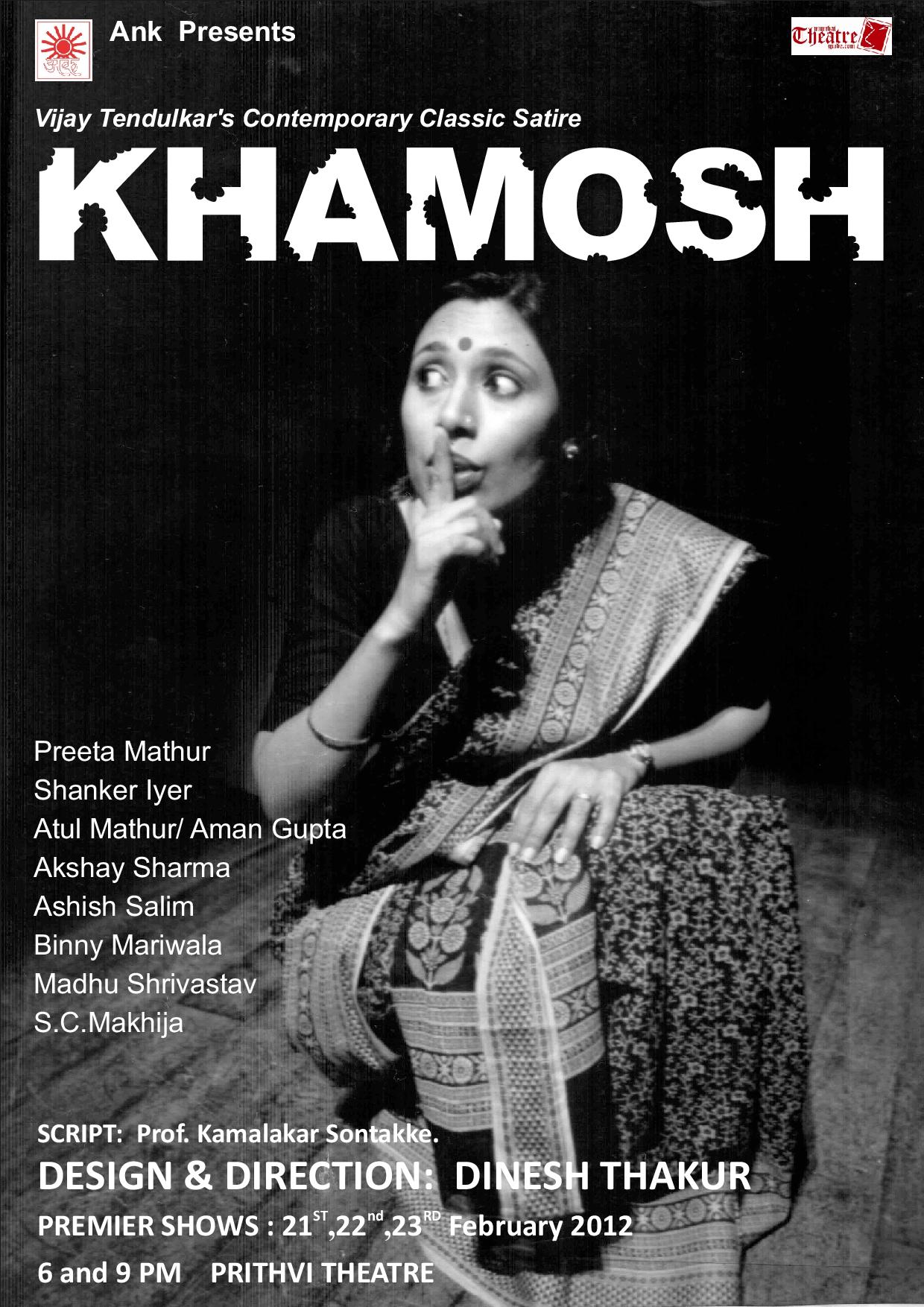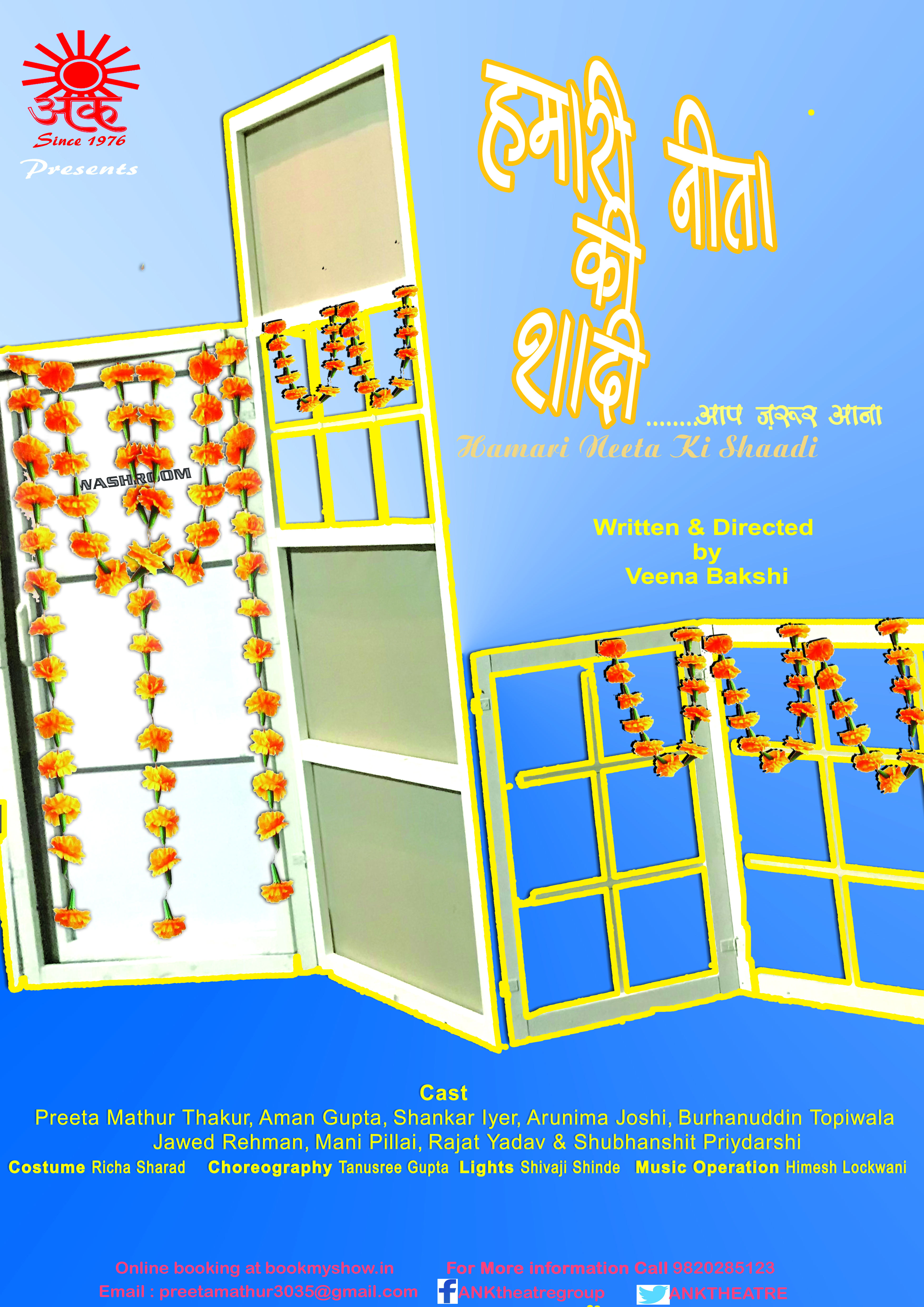Delicate Delightful Comedy HUM DONO
27th July 2024
7.00pm
Godrej Dance Theatre, NCPA, Nariman Point, Mumbai
Hai Mera Dil
The longest running play in the history of Hindi theatre, Hai Mera Dil has completed a 1150 shows and continues to play on popular demand
A hypochondriac of a husband, through some misunderstanding is convinced that he is going to die soon of a serious heart ailment. So he starts to put his affairs in order and the first thing to be done is to plan his beloved wife’s marriage so that she is taken care of. However he cannot reveal to his wife the seriousness of the situation. The wife starts taking his suspicious ways and behaviour for infidelity… his noble thought boomerangs and now the husband is running for wife…..and life!!
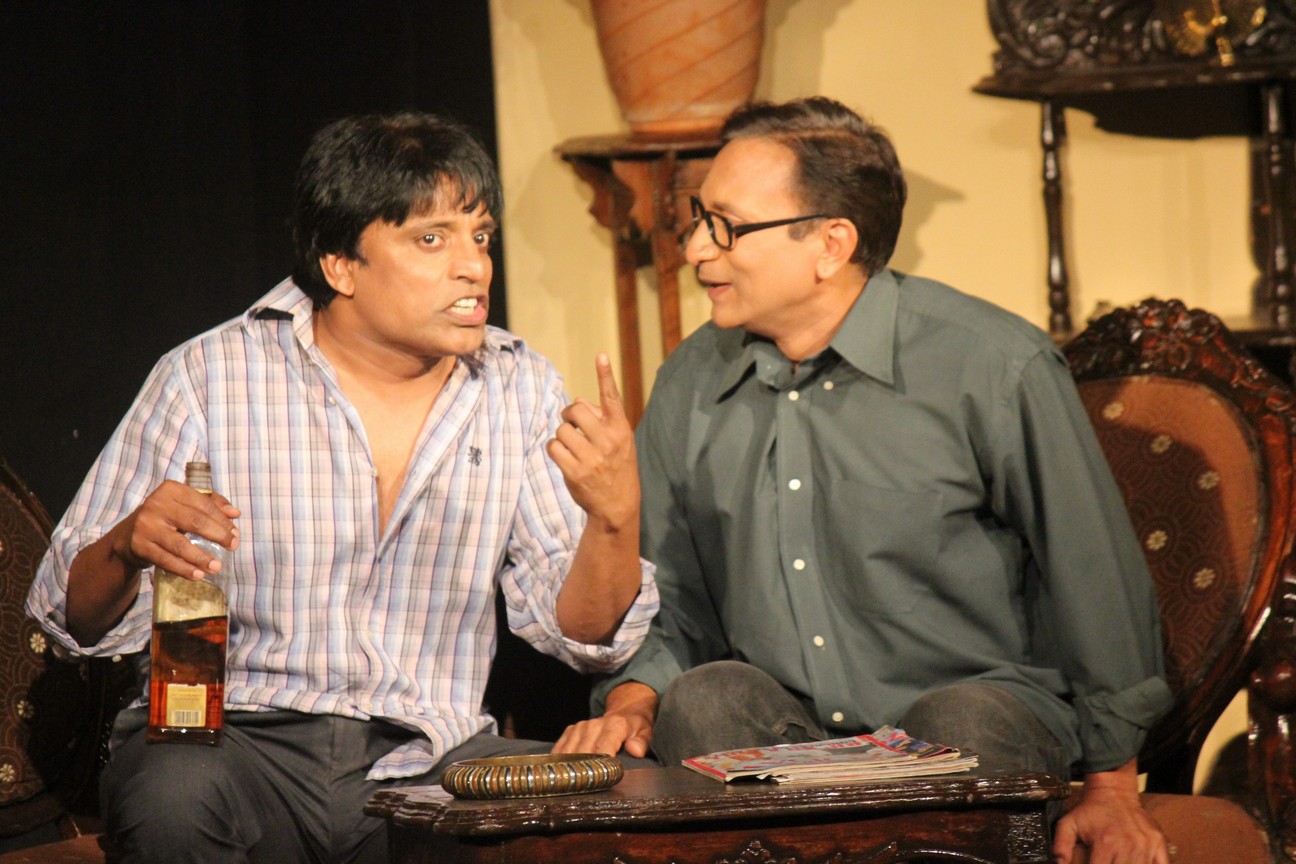
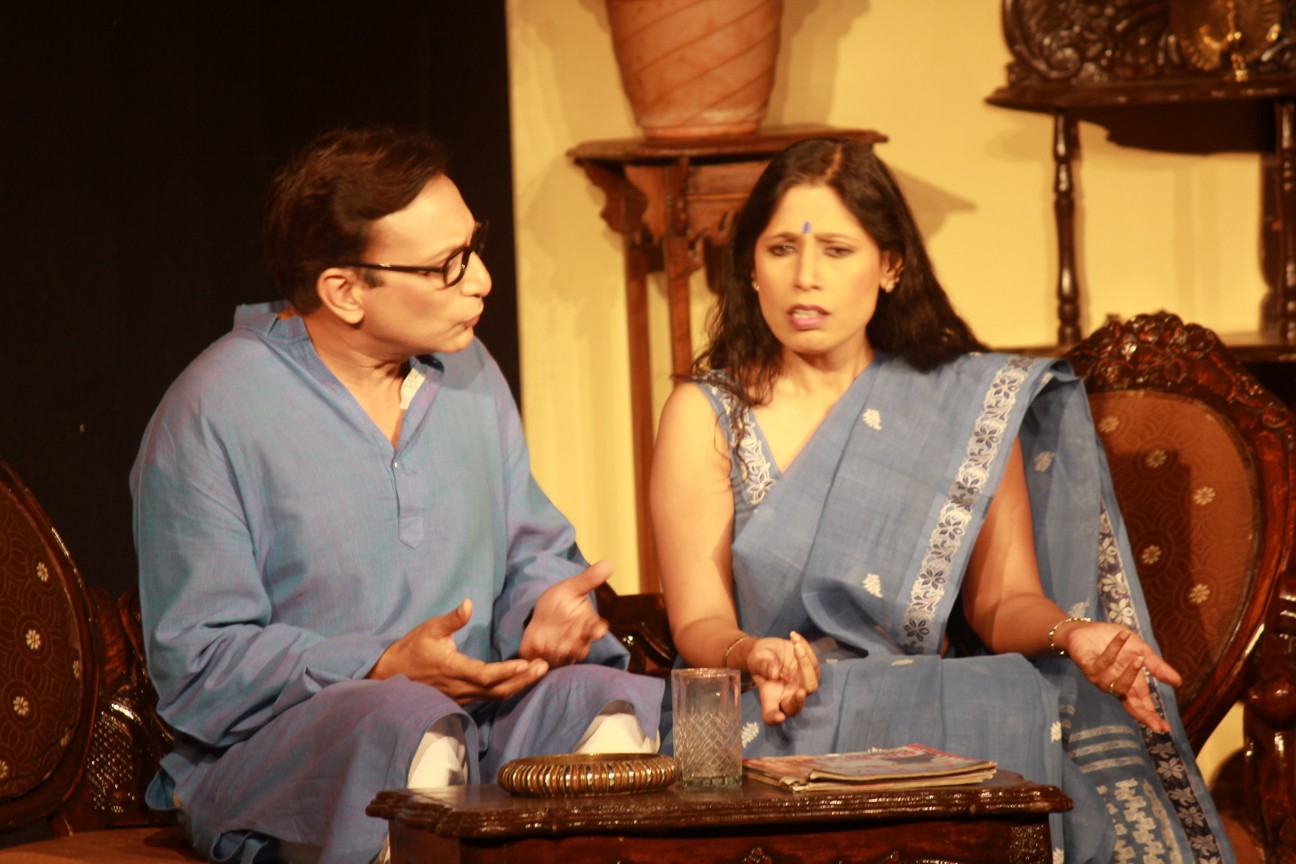
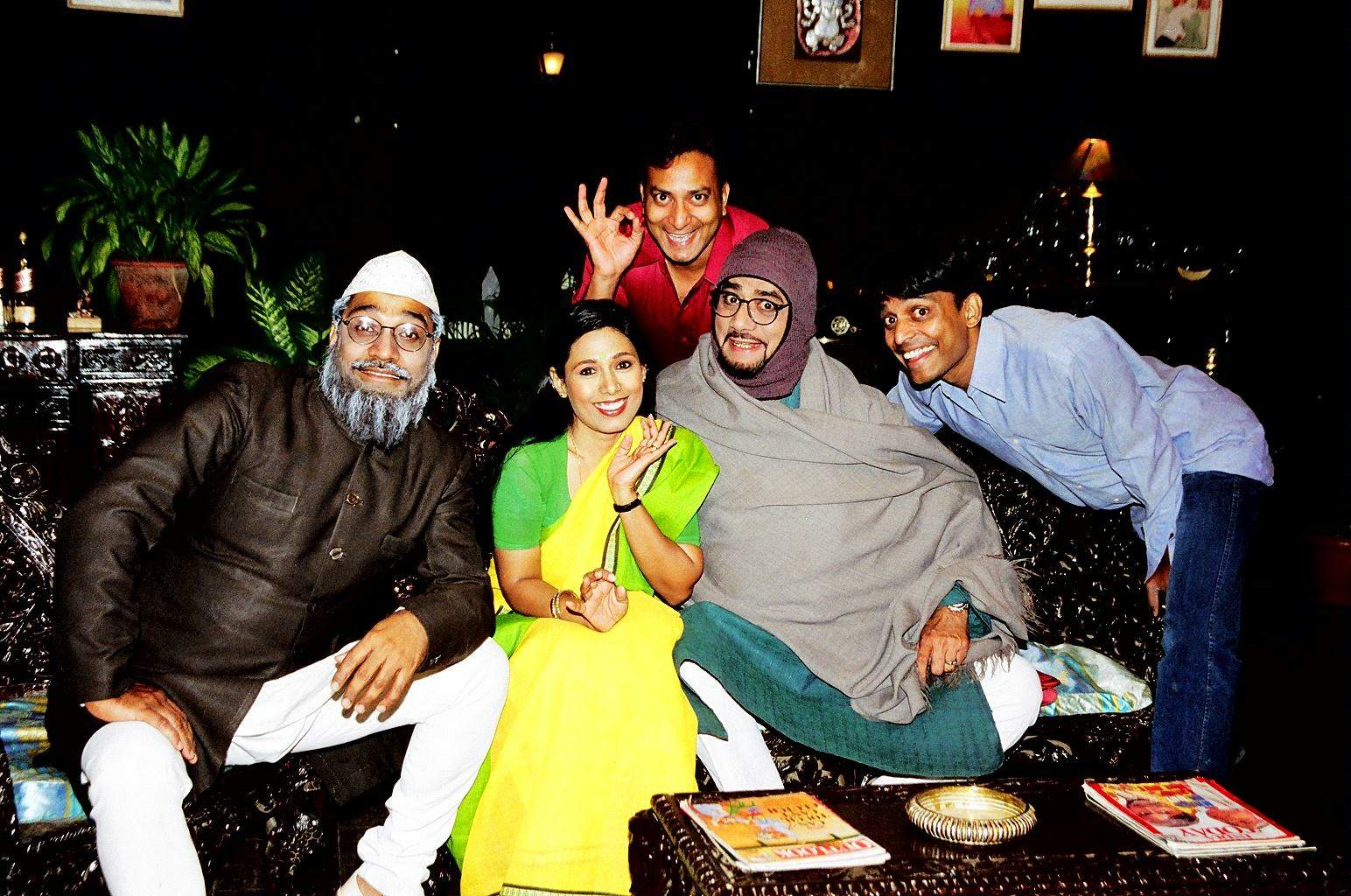
Over the years we have traveled widely with Hai Mera Dil to all the metro cities and more than twice to some cities, to smaller cities, many towns and even smaller colonies, we have performed for mill workers in huge grounds and for students in school auditoriums - however elite or downright rustic an audience, they all respond with tremendous hilarity. There is definitely something special here - the humour arises from the simplest things of life. There is so much humour in everyday existence which we tend to completely overlook in our stressed out schedules but when highlighted, it does not fail to make people burst into peals. Hai Mera Dil has become the best kind of therapy for life.
Hai Mera Dil has also had a thrilling tour of 9 army stations in the Northern Command from Chandigarh to Jammu, performing for the Jawans and their families and for the Generals, Brigadiers and Colonels. It was exciting to have about 13 Generals in one show and even more exciting to have the Generals and the Jawans respond with equal hilarity.
CAST
- Madan Mohan Agarwal----------Aman Gupta.
- Usha----------Preeta Mathur Thakur.
- Mohan----------Sumit Bhardwaj.
- Dr. Chopra----------S C Makhija.
- Arvind----------Atul Mathur.
- Ali Beg----------Shankar Iyer.
- Kalu----------Subhanshit Priyadarshi.
- Reeta Bose----------Shilpa Chakraborty.
CREDITS
- Lights Operation----------Shivaji Shinde
- Music Operation----------Darshan Pawar
- Make up----------Sunil Joshi
- Back Stage----------Rajat, Shubhanshit
- Stage Manager----------Preeta Mathur Thakur
DESIGN & DIRECTION : DINESH THAKUR.
Duration: 2 hour including an interval for 10 minutes.
Jis Lahore Nahi Dekhya
Jis Lahore Nahi Dekhya was written in the 1980s but today it has become our willing tool to showcase love and harmony between communities in our Nation which has the most varied diversity
The story, set in 1947, is about an old Hindu woman in Lahore who, robbed of her son and family as a result of the riots at partition refuses to be robbed of her home by a Muslim refugee family from Lucknow. The Muslim family, having suffered the painful displacement of partition are desperate and not averse to bringing in the local, political goons. Even as the goons move in, sensing the advantage of exploiting the situation, they remain blind to the inherent strength of human kindnesses. A bond surfaces between the old woman and the displaced family that fills up the vacuum in their lives as the old woman guides them through a strange land. It is this unexpected human bonding and empathy for our fellow creatures, the ability to see ourselves in others, a brotherhood of inclusion that makes the world such a beautiful place despite repeated attempts at divisiveness by vested interests.

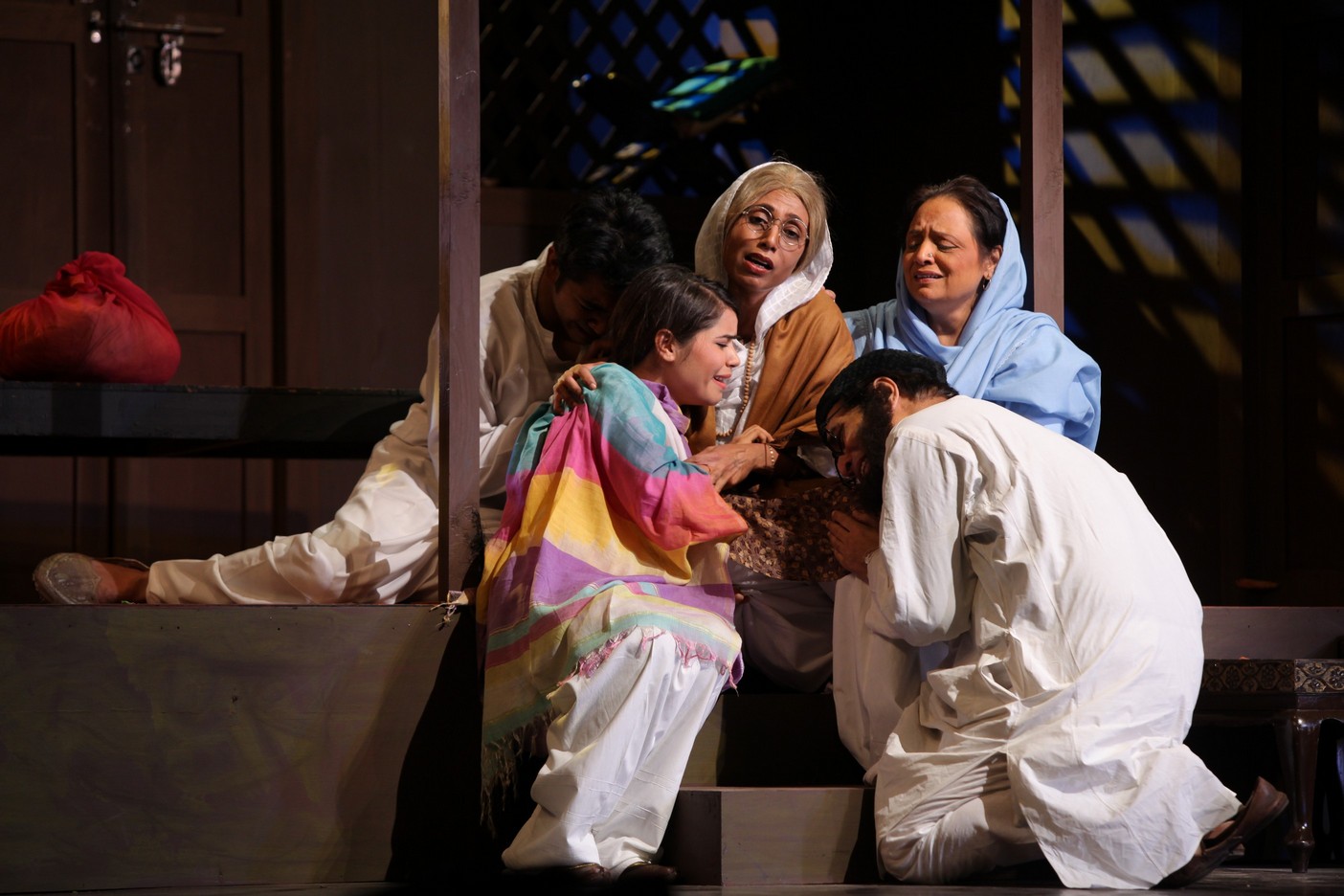
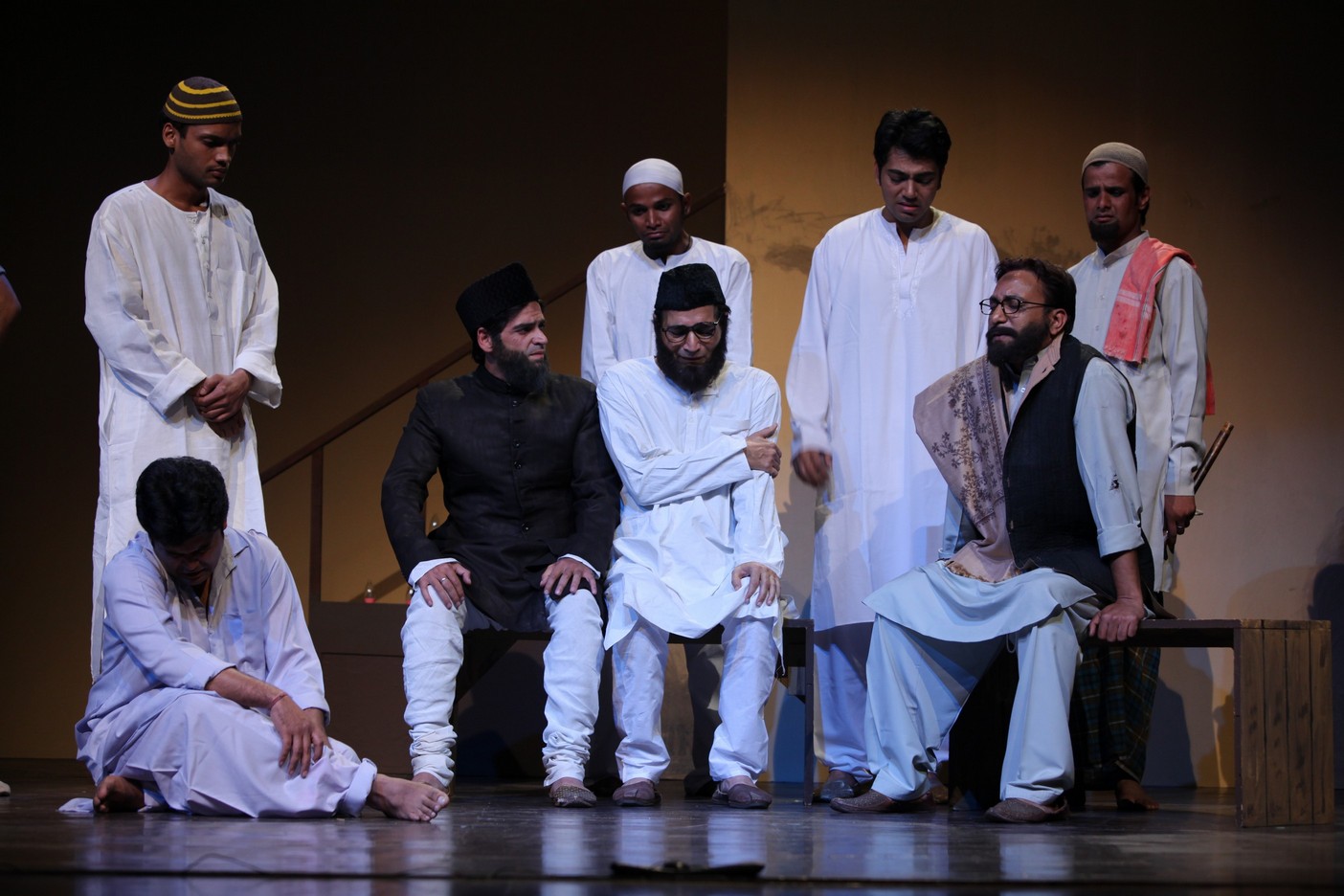
Lahore.. is the story of two communities who have suffered first-hand the horrors of partition and still have the strength and humanity to rise above petty hatred. Partition and the untold and widespread misery that it wrought was a great lesson for the people of this country.
As we revisit our history, the play not only entertains with its share of drama and histrionics but elevates us socially and emotionally, sensitizing us towards those different from us and motivating us to bring out the best in each other. This play assumes even more importance in the light of the spate of the recent terror attacks globally. It has become even more imperative to drive home the message of ‘tolerance and mutual respect and cooperation ’ not only between communities but among nations across the seven seas to prevent the birth of future terrorists
CAST
- Ratan Ki Maa----------Preeta Mathur Thakur.
- Mirza----------Ajay Chaurey.
- Hameeda Begum----------Meena Vaibhav.
- Tanno----------Sonal Mathur.
- Mohammed Shah----------Ashish Saleem.
- Maulvi----------S C Makhija.
- Yaqoob Pehlwan----------Atul Mathur.
- Aleem Chaiwala----------Hardeep Singh.
- Hameed Tangewala----------Shankar Iyer.
- Siraj----------Shubhanshit.
- Hidaayat----------Mohit Sharma.
- Fayaz----------Mani / Burhanuddin.
- Anwar----------Rajat Yadav.
- Javed----------Shubhanshit.
CREDITS
- Lights Operation----------Shivaji Shinde
- Music Operation----------Darshan Pawar
- Make up----------Sunil Joshi
- Back Stage----------Rajat, Shubhanshit, Mani, Burhan
- Stage Manager----------Preeta Mathur Thakur
DESIGN & DIRECTION : DINESH THAKUR.
Duration: 1 hour 50 minutes including an interval for 10 minutes.
Anji
A Hindi version of his original Marathi Comedy CHI SAU KA by Dr.Vasant Deo.
Undaunted by the fact that she is getting on in years but is yet to find the right match, Anjali Sharma (Anji) sets out to search for her dream man herself. During this journey, she comes across several characters & circumstances. Story of Anji who holds forth her positive attitude inspite of trying situations and a life going nowhere, but is yet stumped in the face of a pitiless society. An explosive climax persuades us to re-examine our value system, specially concerning women. The play is set in the North Indian Nautanki style of theatre with live music. The play is both realistic and abstract in treatment, with a traditional sutradhar as narrator. The set is simple using platforms of various heights. The multi locations are highlighted by the creative use of lighting. The play moves between reality, fantasy and dream sequences which are created by extensive use of lights.
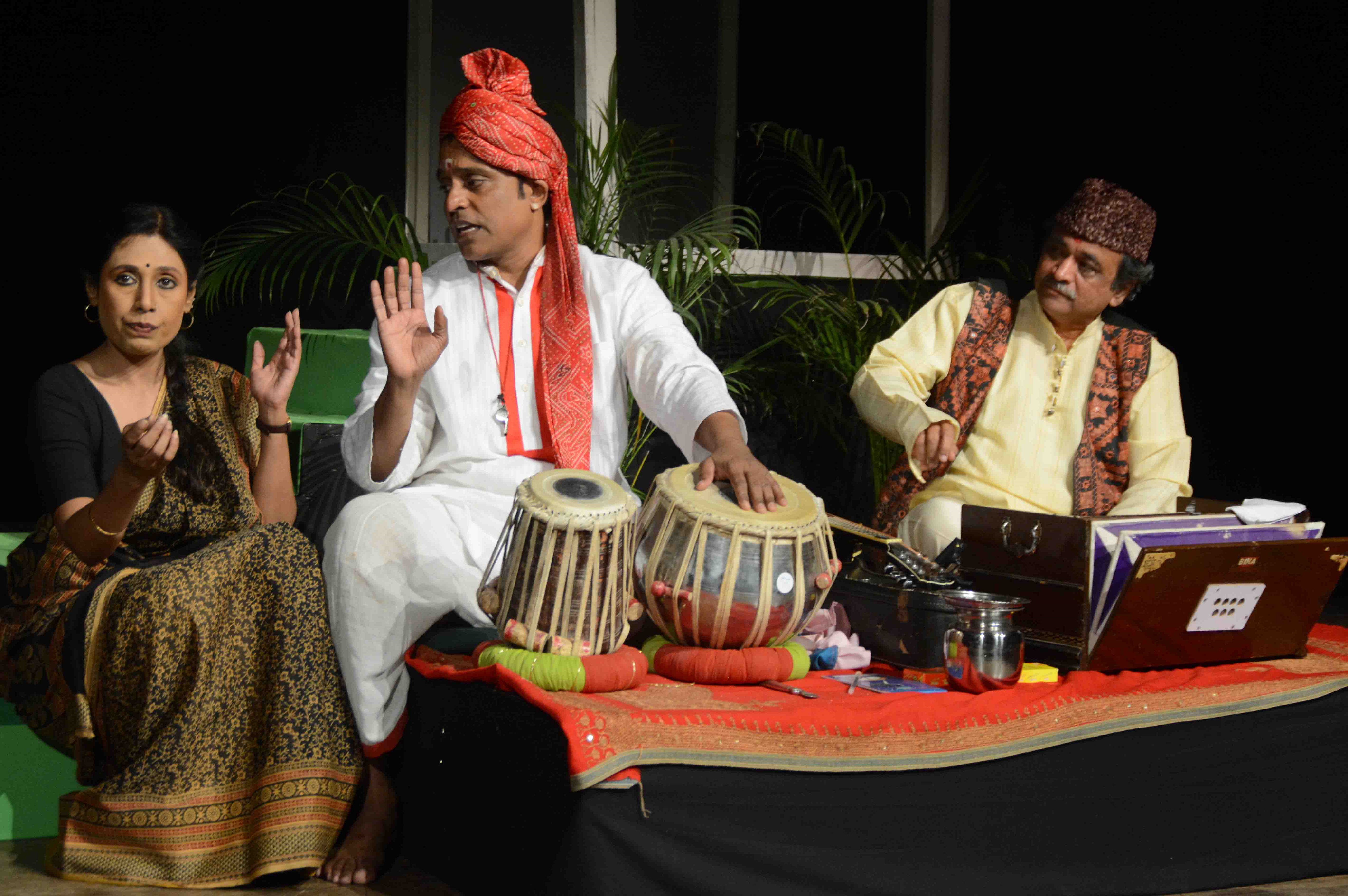
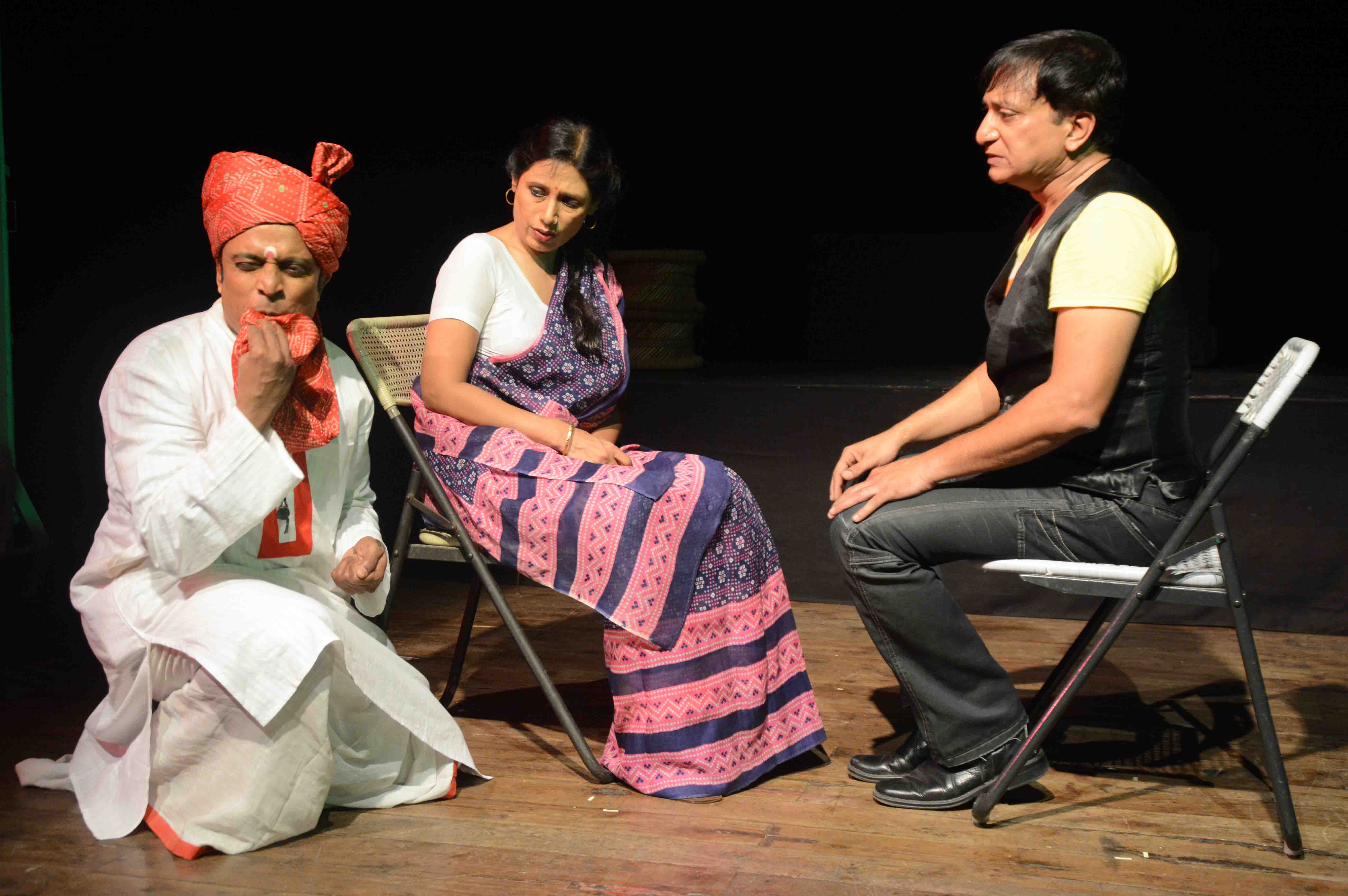
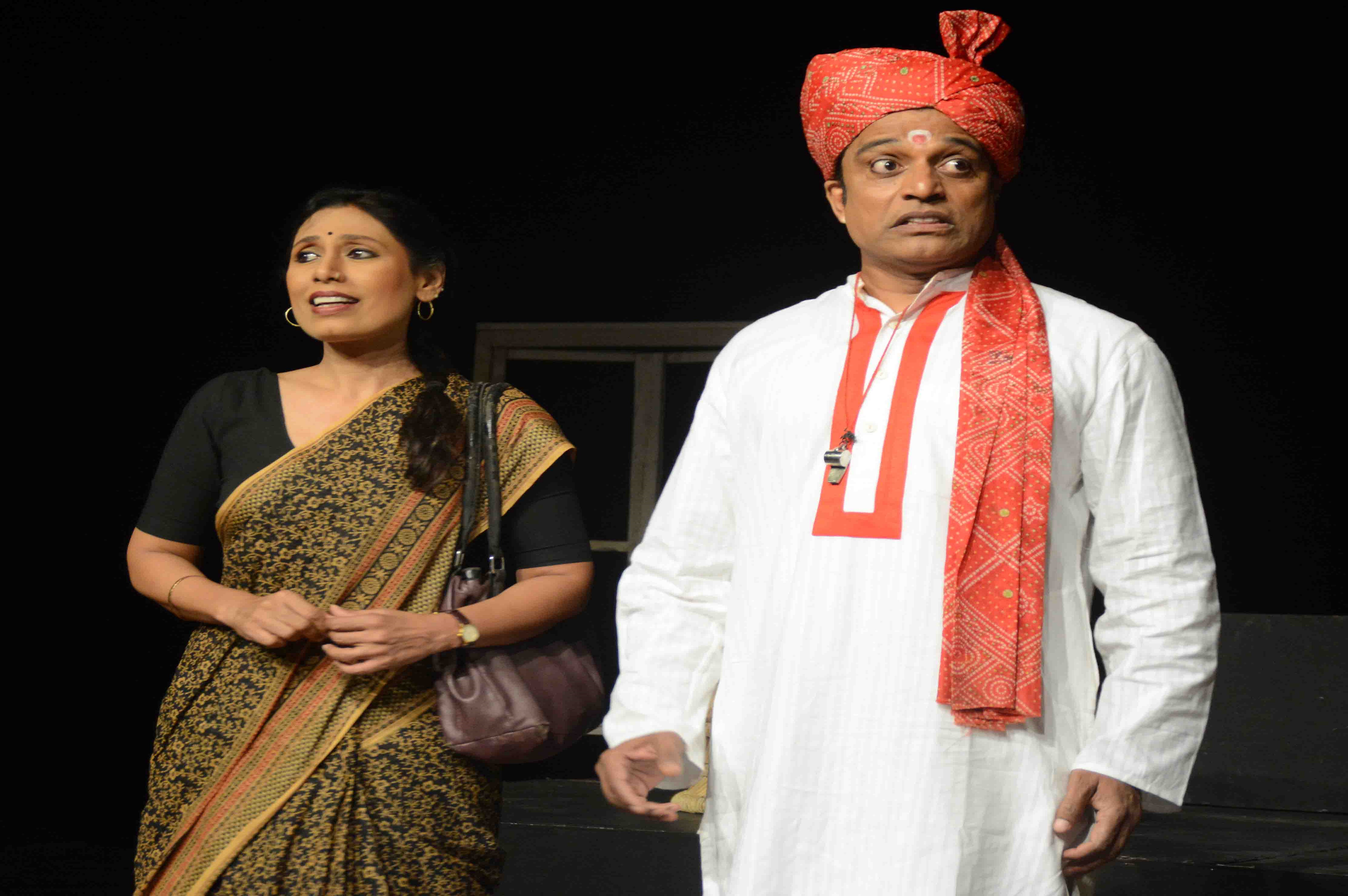
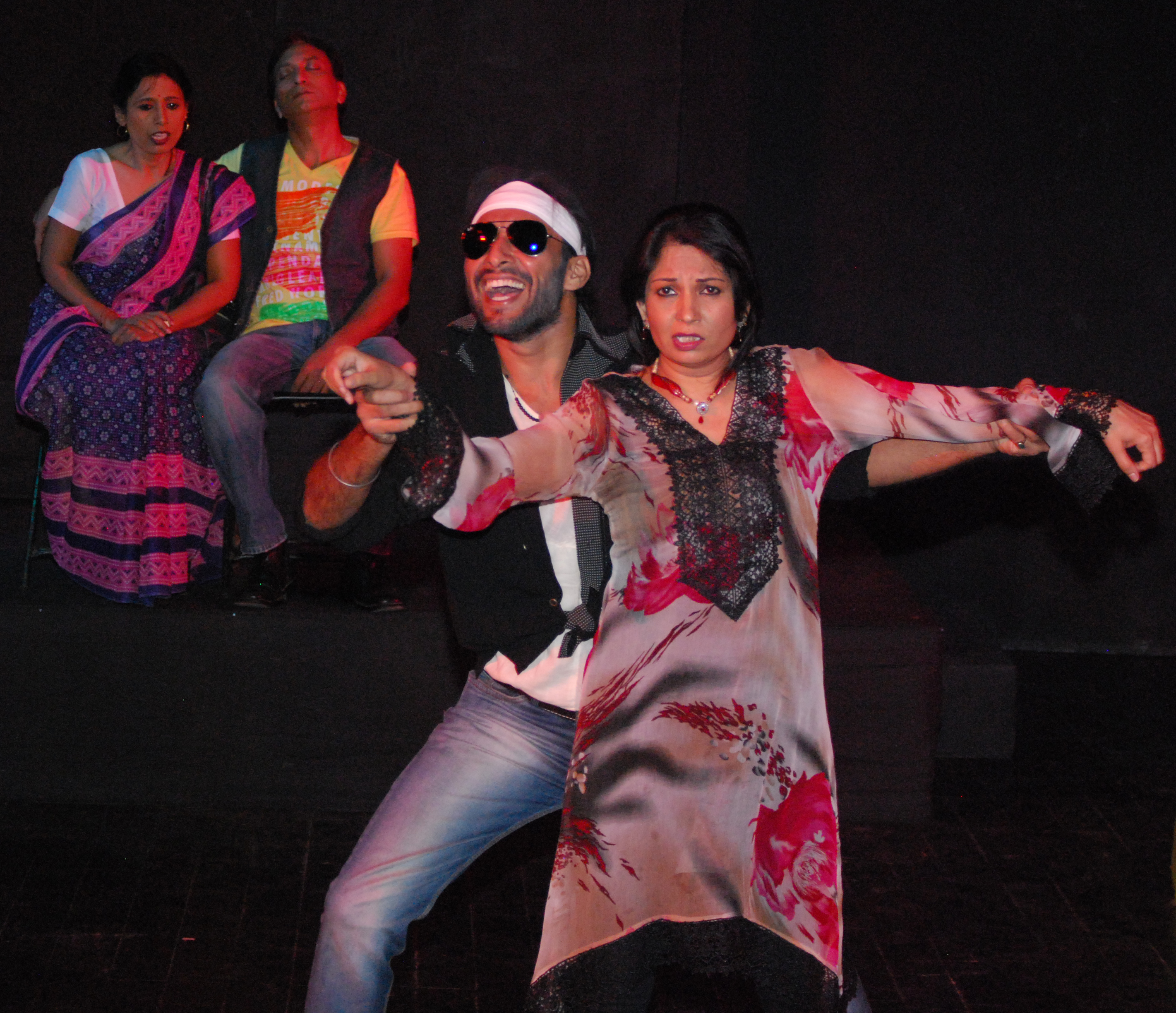
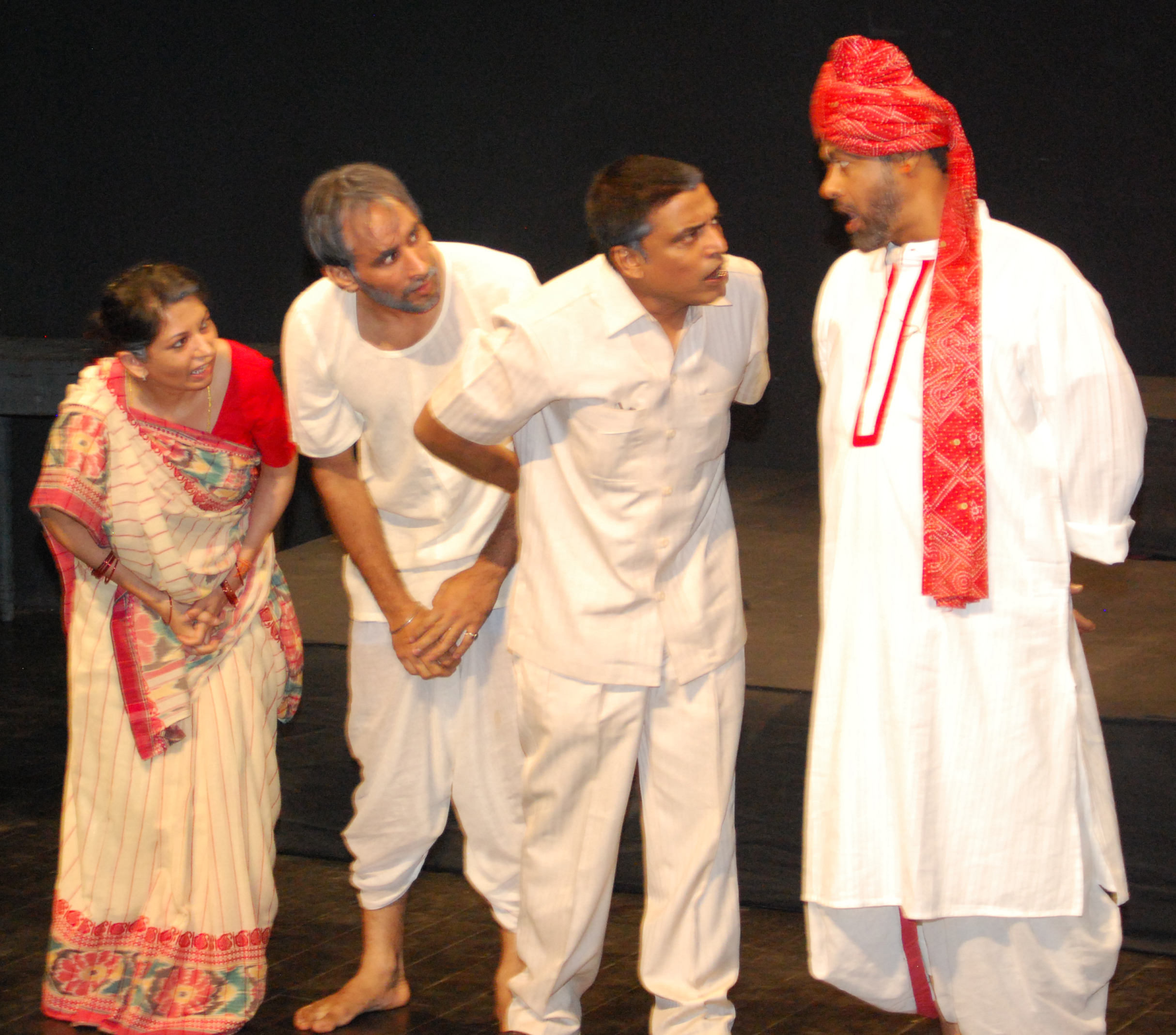
Although the play in its Marathi version did not have a very long run, the Hindi production directed by Dinesh Thakur has completed nearly 700 shows. The play has become even more relevant in today’s times when there is an express need to shun the condemnation and highlight the rehabilitation of a rape victim. The Thumri sung in the play is composed and rendered by Smt Lakshami Shankar and the Tagore poems are recited by the late Shri Basu Bhattacharya.
CAST
- Anji----------Preeta Mathur Thakur.
- Sutradhar----------Atul Mathur.
- Ustad----------Jyotindra Bhatt.
- Bhagwat Dwivedi----------Aman Gupta.
- Amma ----------Pragati Pandey/Rajni.
- Dadda----------Ajay Chourey/Hardeep Singh
- Prabhudayal----------Shankar Iyer.
- Manji----------Pragati Pandey.
CREDITS
- Lights Operation----------Shivaji Shinde
- Music Operation----------Darshan Pawar
- Make up----------Sunil Joshi
- Back Stage----------Shubhanshit, Himesh
DESIGN & DIRECTION : DINESH THAKUR.
Duration: 1 hour 50 minutes including an interval for 10 minutes.
Jaat Hi Poocho Sadhu Ki
The Hindi version of Vijay Tendulkar’s PAHIJE JATEECHE by Dr.Vasant Deo
Jaat Hi Poochho Sadhu Ki, one of Tendulkar’s more popular plays is a bitter comedy hitting out not only at casteism but the existing contradictions that are prevalent in aspects of social life. Jaat Hi Poochho Sadhu Ki is also a tongue-in-cheek comment on the education system which specializes in churning out educated illiterates. Education has hardly anything to do with individual development and everything to do with obtaining that final pass degree. It is a tool for exerting influence and manipulating a society.
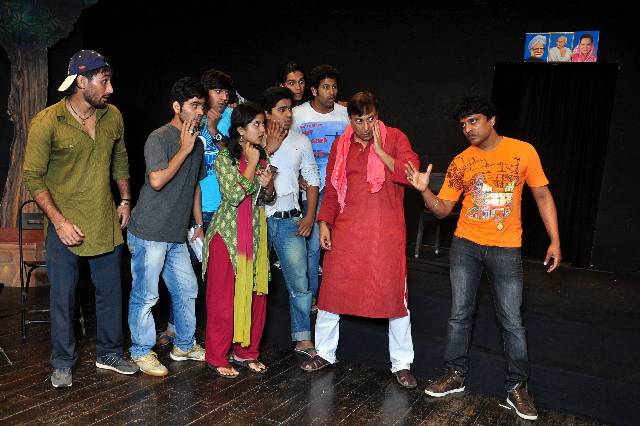
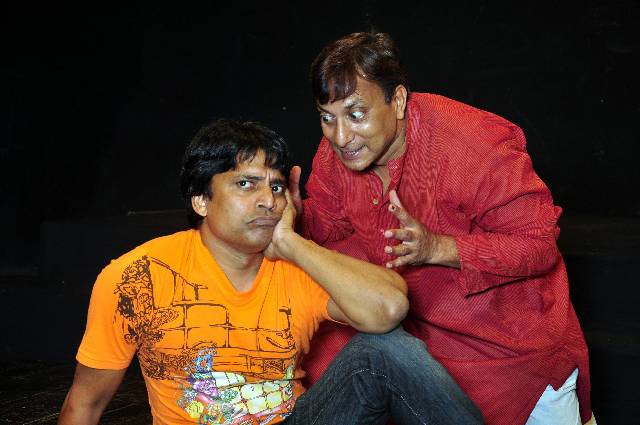
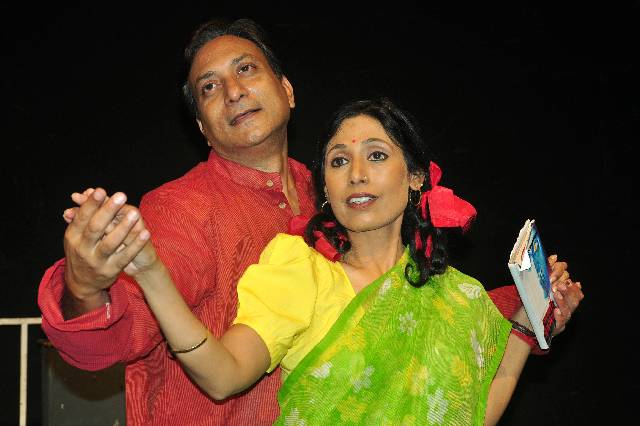
Mahipat, village born but now city bred, counting himself among the desperately unemployed, accepts a professor’s job in one of the lesser known colleges in one of the lesser known mofussil areas in the country. Young and ambitious, he is soon enlightened about the importance of caste and more importantly, about the lowliness of his own caste. Having known the desperation of unemployment, and not one to be beaten easily, he turns manipulator to beat the bosses at their own game but life has a way of turning turtle and he may end up losing the one thing he really truly desires.
Is it wrong to be ambitious? Yes it definitely is if you don’t belong to the right class, caste and society. Now, if you still insist on being ambitious inspite of the wrong caste and class credentials, then you have to become a maha manipulator, a politician to beat the greats at their game, a corrupt strategist who can take corruption to new heights! But then that is a double edged sword and you may end up cutting yourself most grievously and losing even that which you were born with. Mahipat’s story seems to be relevant in every age and time, since soaring ambitions, caste politics & manipulations continue to be our pastime.
CAST
- Preeta Mathur Thakur
- Atul Mathur
- S C Makhijia
- Aman Gupta
- Shanker Iyer
- Prabal Majumdar
- Kumkum Majumdar
- Nilesh Sakpal
- Hardeep Singh
- Abhishek
- Ashok Vohra
- Raj
- Joginder
- Kamal
- Rauf
- Ajay
- Shilpa
CREDITS
- Lights Operation----------Shivaji Shinde
- Music Operation----------Darshan Pawar
- Make up----------Sunil Joshi
- Back Stage----------Shubhanshit, Himesh
- Stage Manager----------Mohit Sharma
DESIGN & DIRECTION : DINESH THAKUR.
Duration: 1 hour 50 minutes including an interval for 10 minutes.
Atke Bhatke Latke Sur
DINESH THAKUR’S Ank, presents its 82nd production, 'ATKE BHATKE LATKE SUR', written and directed by Ashok Mishra - a comedy in 2 Solo Acts
Zenobia Mansion and Noor Mahal may be the names of just two buildings existing quite far apart from each other but they are some of the oldest denizens of this city of dreams, lending a distinct character and way of life to its inhabitants. As classical singer Susupta Gupta struggles to prepare for a prestigious concert, the disturbing environs of Zenobia Mansion threaten to completely overhelm her and derail her perfect performance. In a different part of the city, Fakhruddin struggles to ensure that his master, Bade Abba, the owner of Noor Mahal lives to see his 100th Birthday. The odds are against him...but there is a secret he cannot share and for his peace of mind and integrity, Bade Abba must live to a hundred years
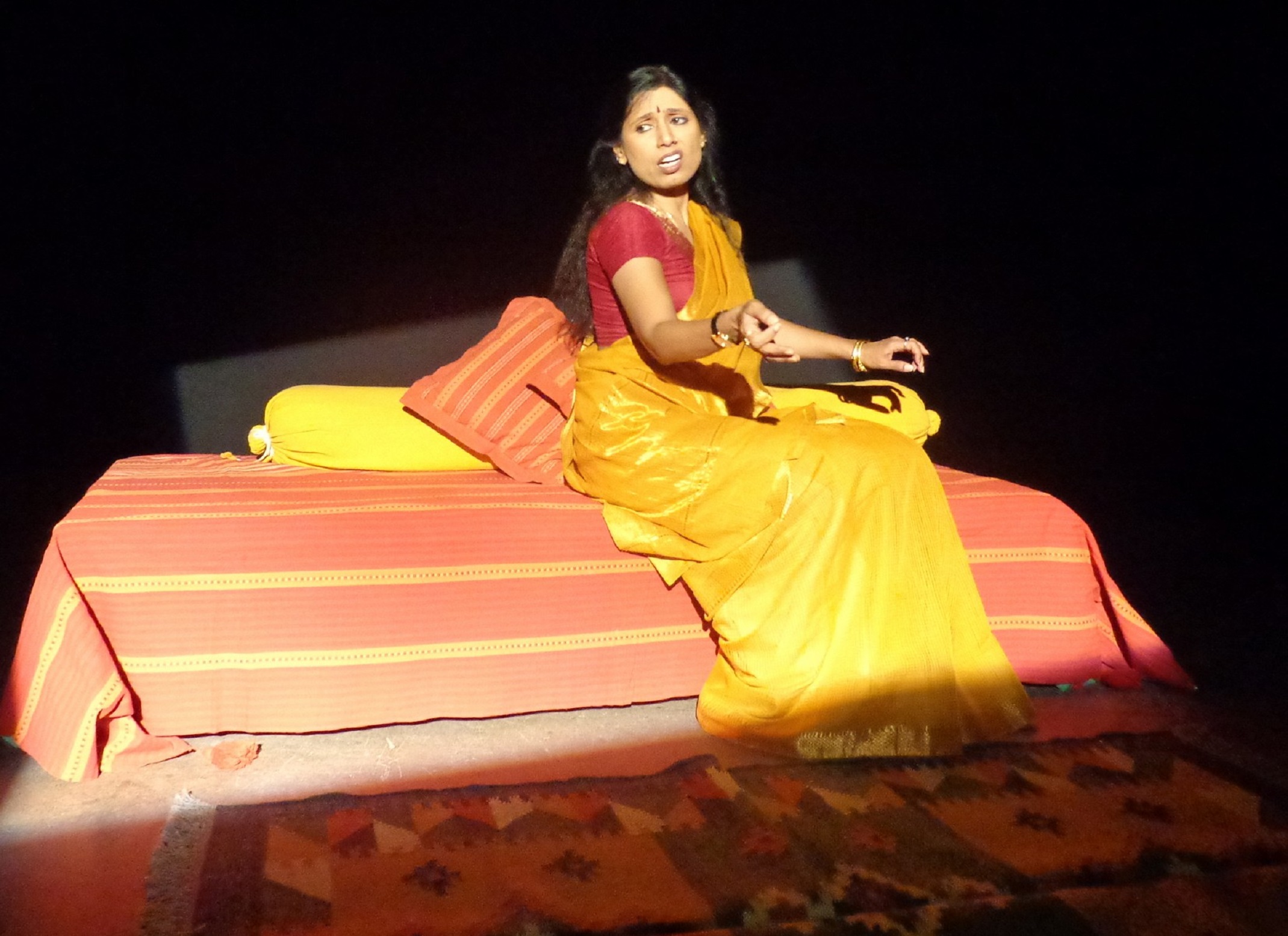
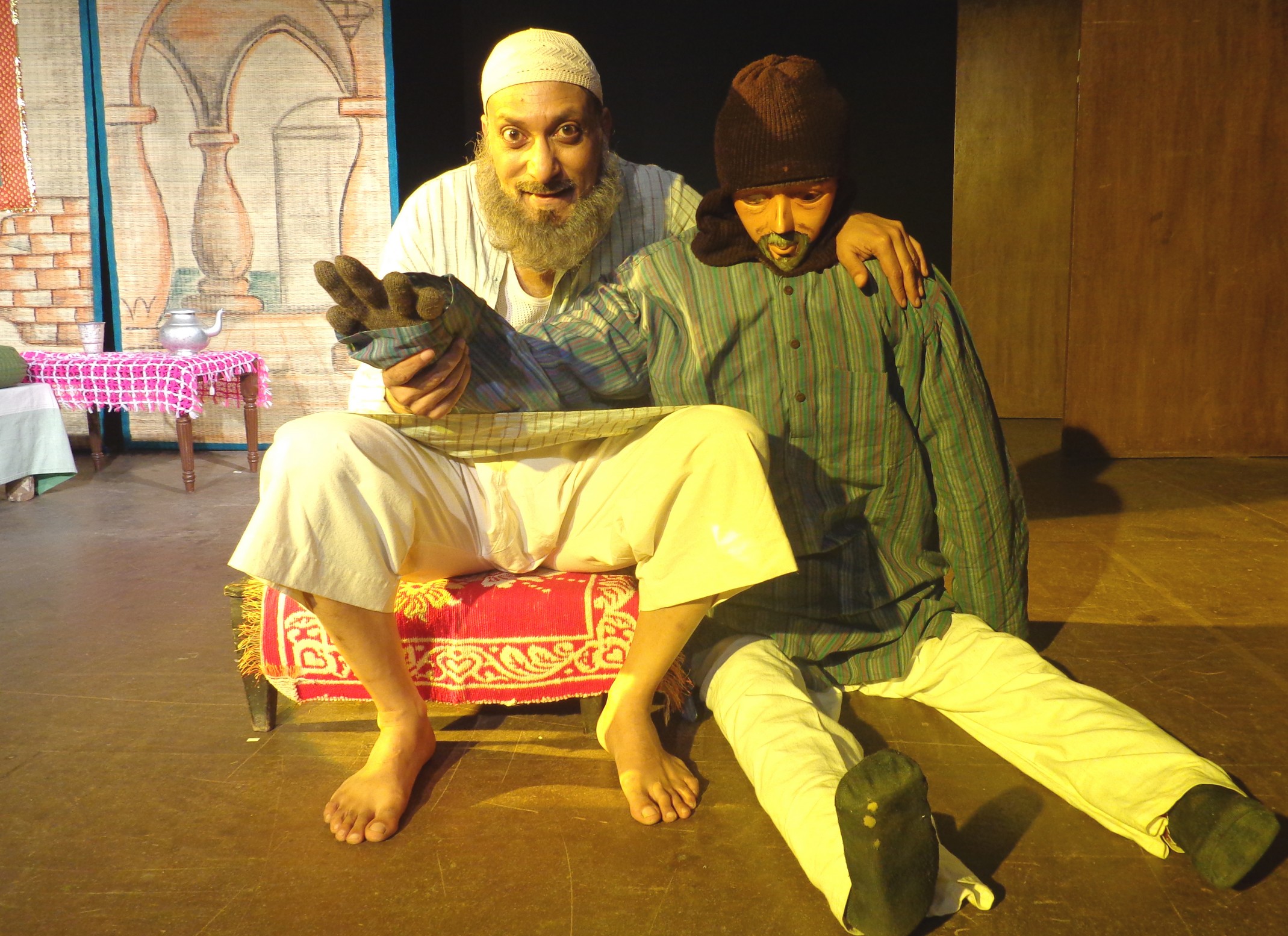
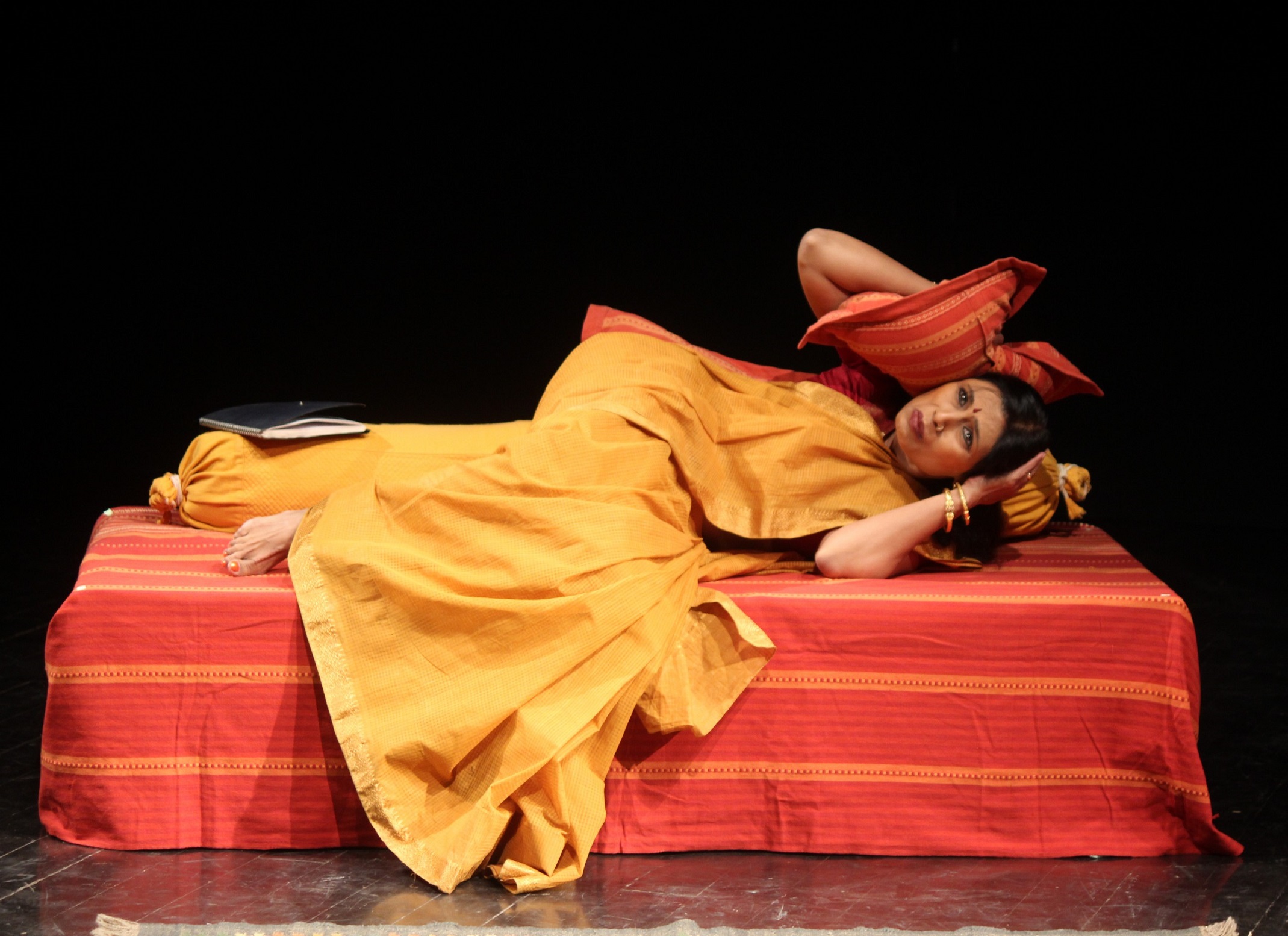
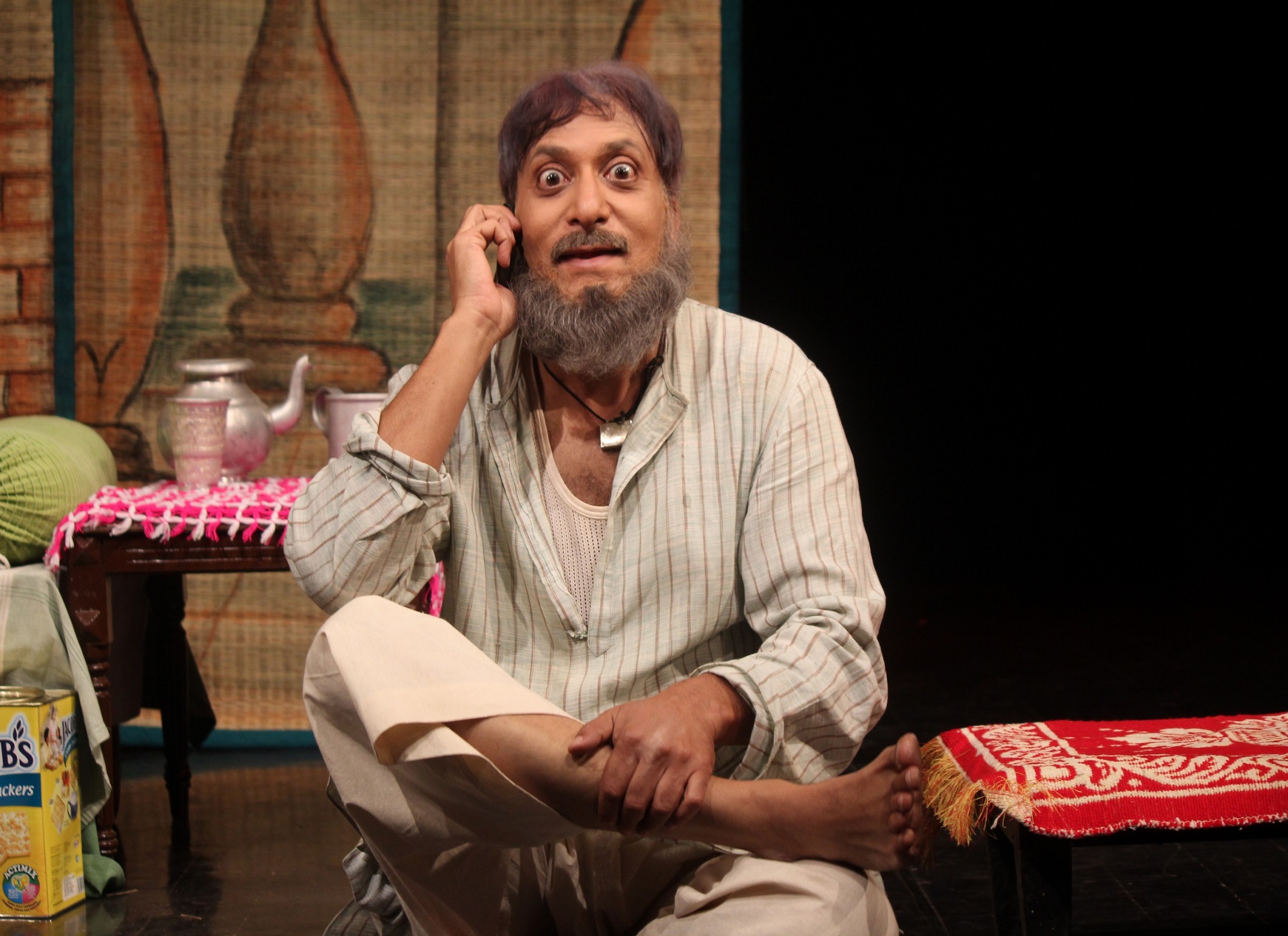
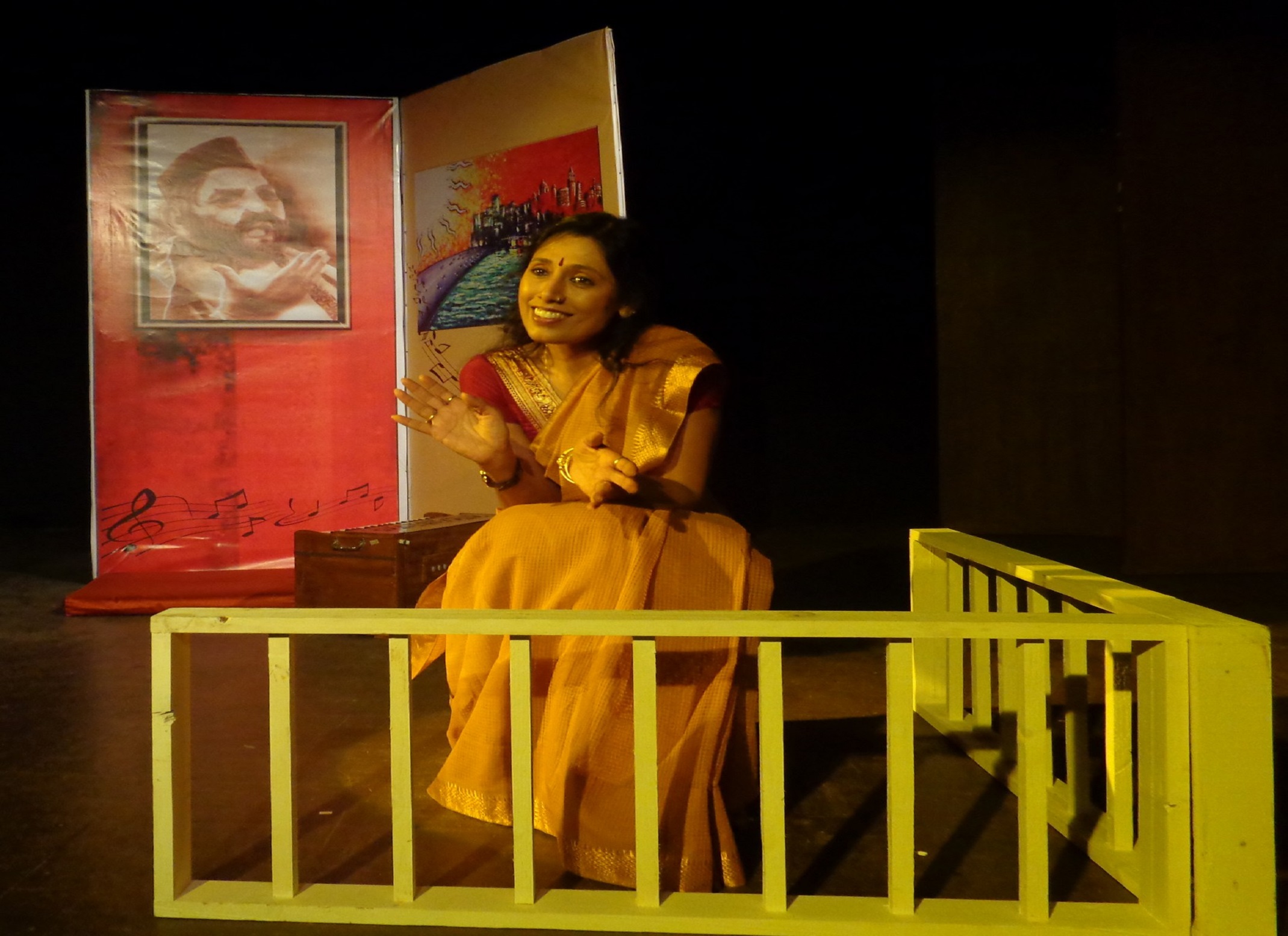
CAST
- Preeta Mathur Thakur.
- Aman Gupta.
CREDITS
- Shivaji Shinde
- Darshan Pawar
DESIGN & DIRECTION : ASHOK MISHRA.
Duration: 1 hour 50 minutes including an interval for 10 minutes.
Beewion Ka Madarsa
An Urdu version of Moliere’s 14th century classic ‘Ecole de femmes or School for Wives’ by Balraj Pandit and Surekha Sikri
Haneef Mohammed did not marry, firmly believing that all women are dishonest and cheat their husbands. However, a chance meeting with the six year old, beautiful and innocent Husnara gave him the idea of rearing her up in his own fashion to be his bride. He determined to teach her only that which would produce a beautiful, devoted and faithful wife. He provided her with all the luxuries, a convent education - the nuns were expressly instructed and two (almost) devoted servants
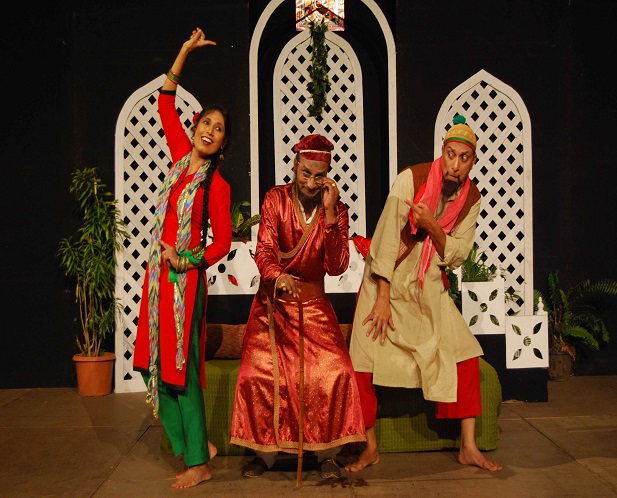
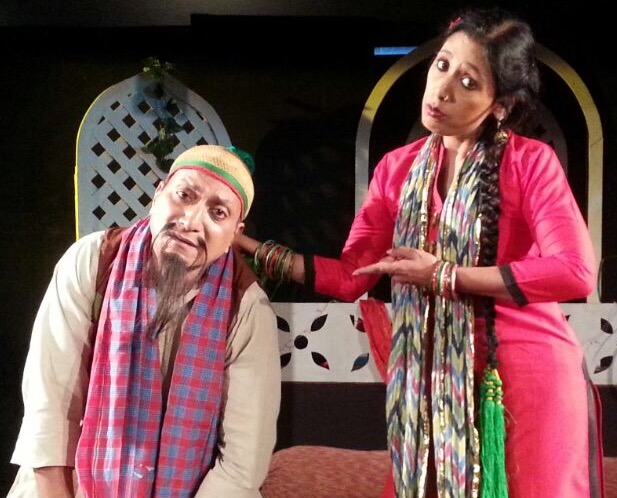
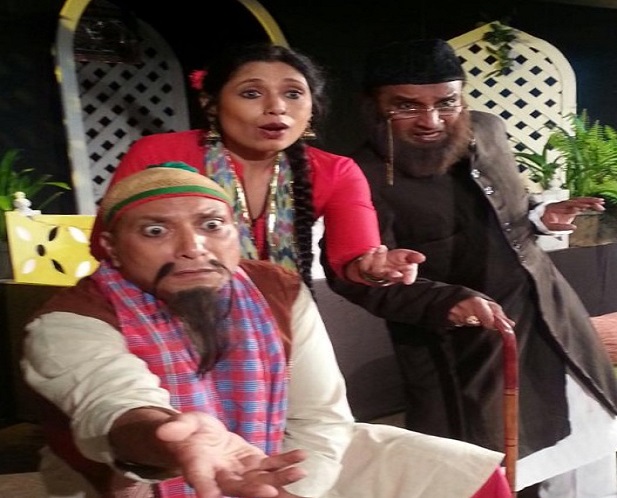
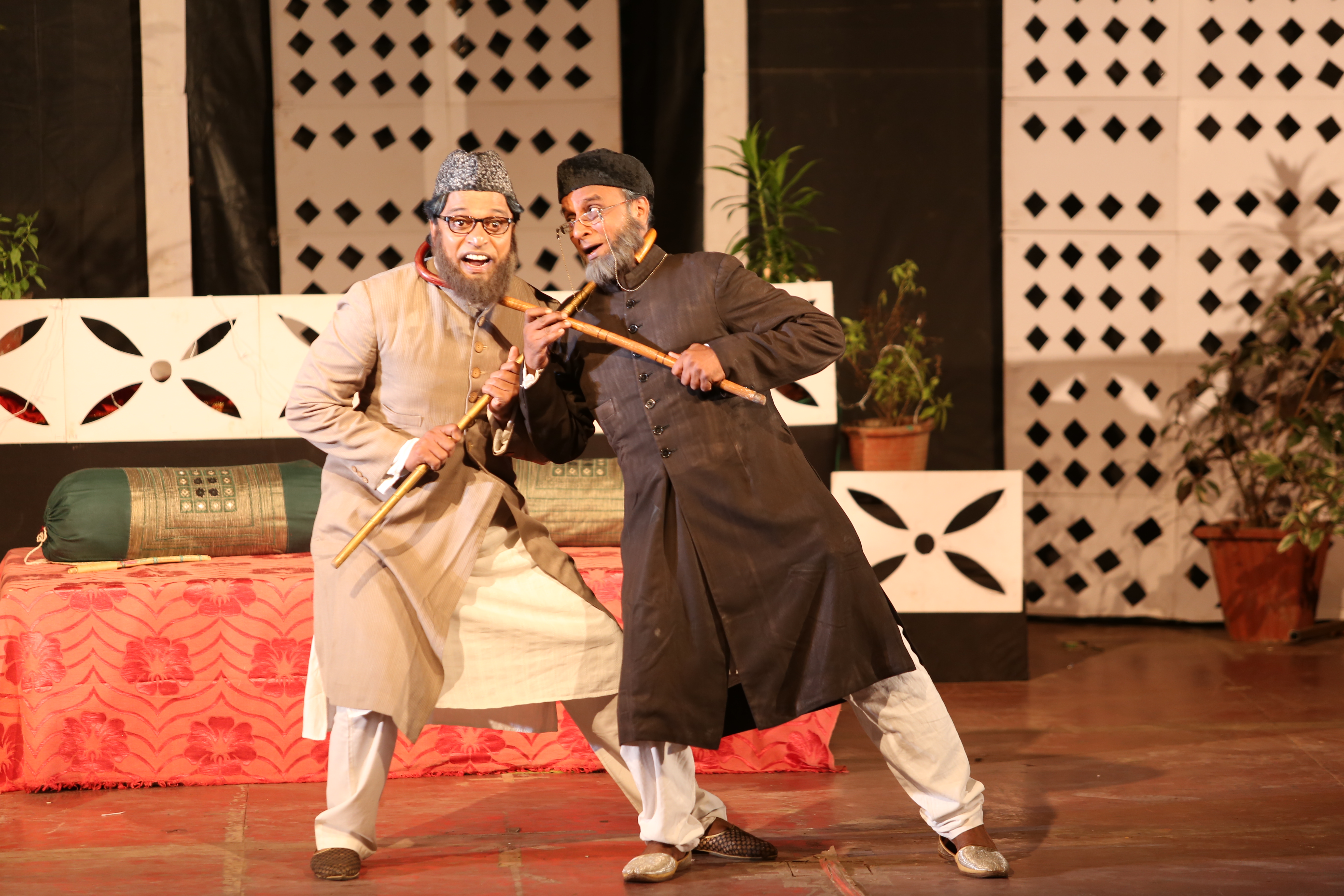
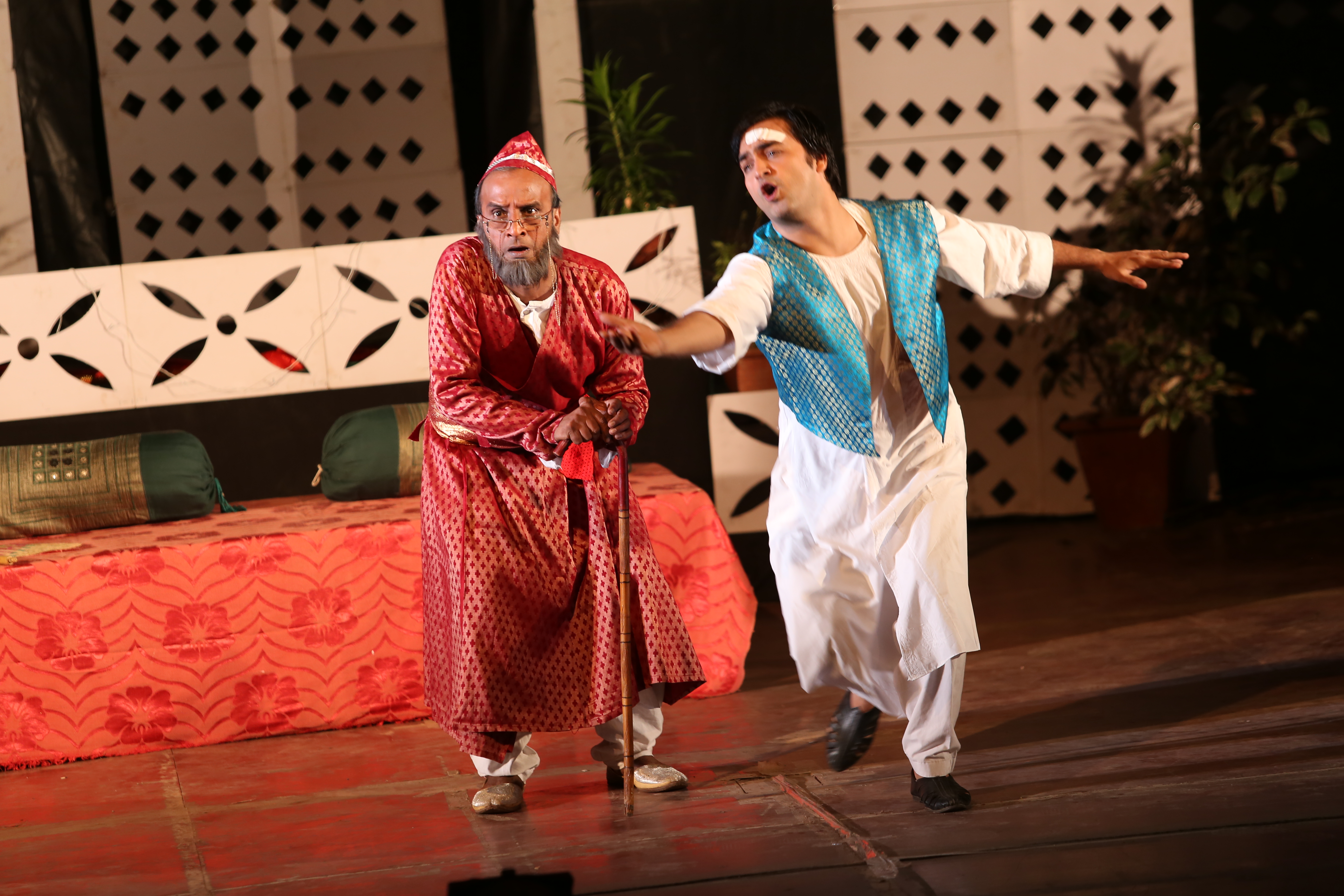
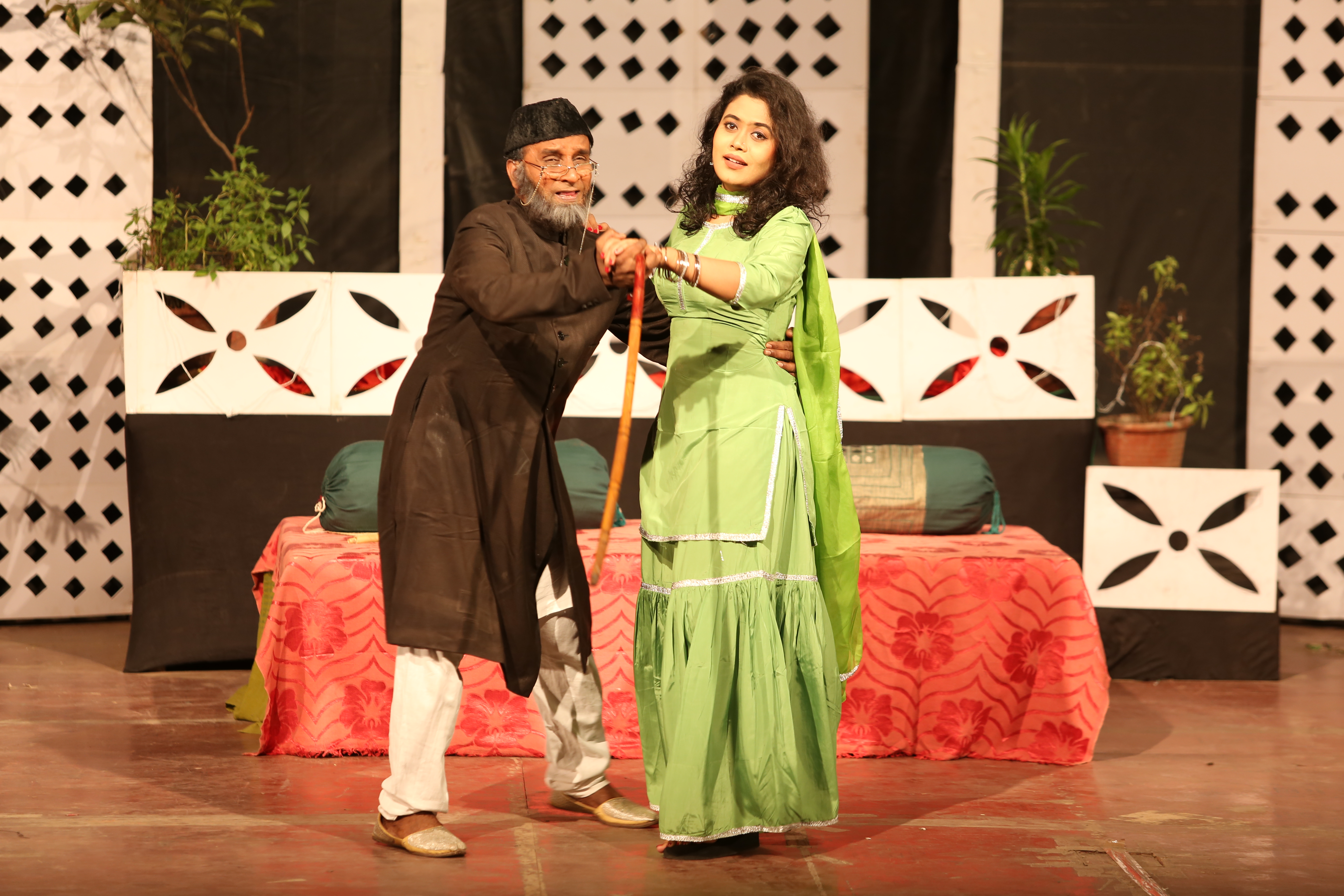
The girl turned a most comely and beautiful sixteen and Haneef Mohammed began to plan his wedding. However, fate decreed otherwise and the fruits of his labour seemed to be falling in another lap…….but Haneef Mohammed had his wits about him and along with his doubtfully devoted servants meticulously setout to outwit this young upstart of a suitor …. The comedy is constructed as a stylized farce and is the most hilarious tragedy of Haneef Mohammad The qawwali used in the play is written by Dil Lakhnawi , rendered and composed by the Late Shri Shankar Shambhu.
CAST
- Kammo----------Preeta Mathur Thakur.
- Anwar Hussain----------Ajay Chaurey.
- Sultan Ali----------Aman Gupta.
- Haneef Mohammed----------Shankar Iyer.
- Husnara----------Riya Khaund.
- Gulfaam----------Ashish Saleem
- Shauqat Hussain----------Mohit Sharma/Ashok Vohra.
- Murad----------Atul Mathur/Gunjan Sinha.
CREDITS
- Lights Operation----------Shivaji Shinde
- Music Operation----------Darshan Pawar
- Make up----------Sunil Joshi
- Back Stage----------Mohit, Himesh & Shubhanshit
- Stage Manager----------Preeta Mathur Thakur
- Dance Design----------Tanusree Gupta
- Costumes----------Richa Sharad
DESIGN & DIRECTION : Dinesh Thakur.
DIRECTION : Atul Mathur.
Duration: 2 hour including an interval for 10 minutes.
Bus Tum Aur Hum
What really makes for a successful marriage? Can you term it successful if it lasts 22 years? Shipra and Yash seem reasonably happy in this marriage – what is it that keeps them there? Two very different people with different likes & dislikes
Over 17 scenes we witness Yash and Shipra growing together as a couple from the day of their marriage. They move upward in life, have three daughters, grow in their careers and gather all the luxuries and accessories that any upwardly mobile couple would gather with more or less support from each other. It seems an ordinary everyday marriage with the only drama being provided by boring food, a new car, grocery shopping and selling furniture on an online site BUT we also witness... the weirdness, the large dollops of humour and the regular sparring... If marriages are made in Heaven what is it that keeps them going on Earth? BAS ... TUM AUR HUM presents an ordinary family in an extraordinary manner
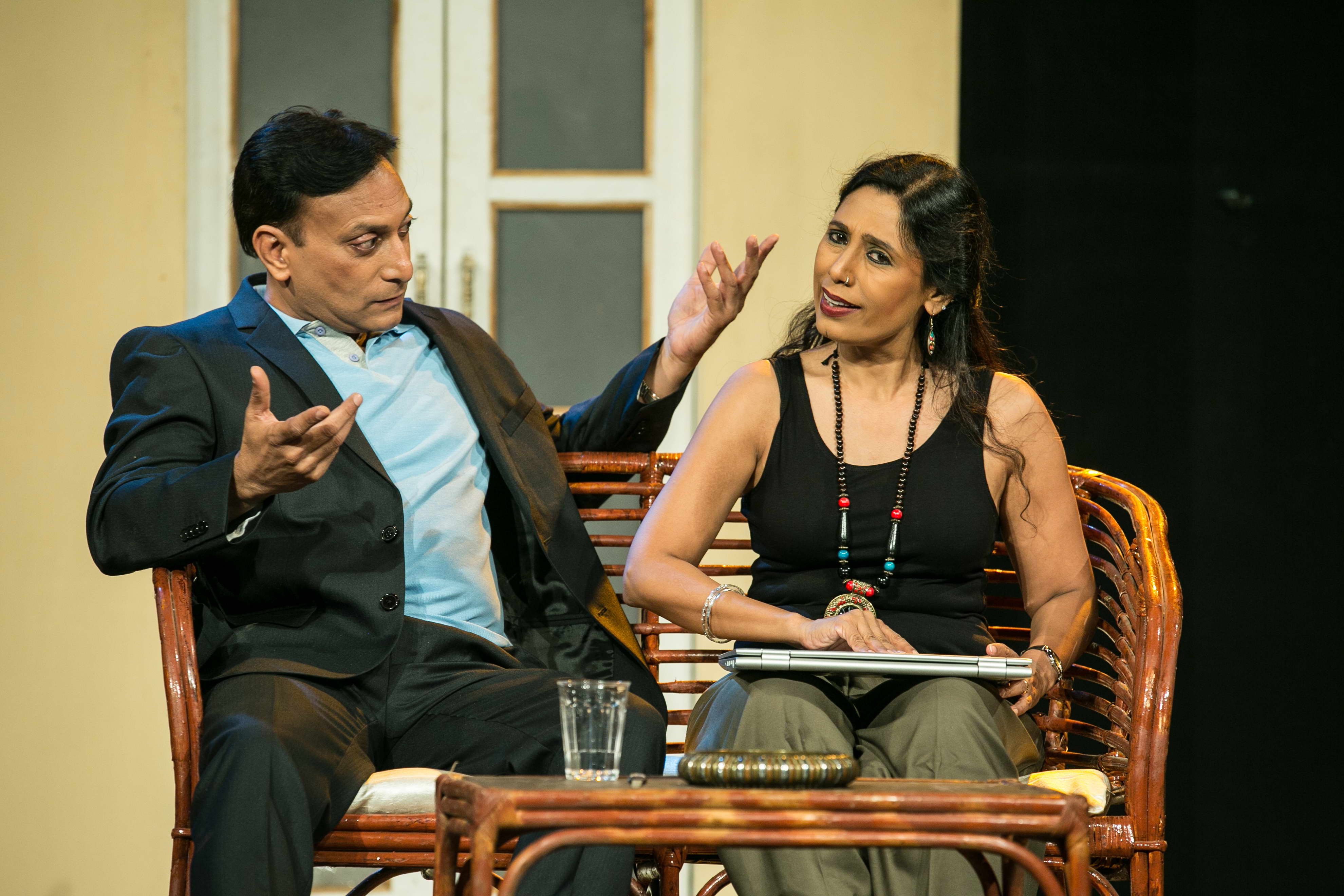
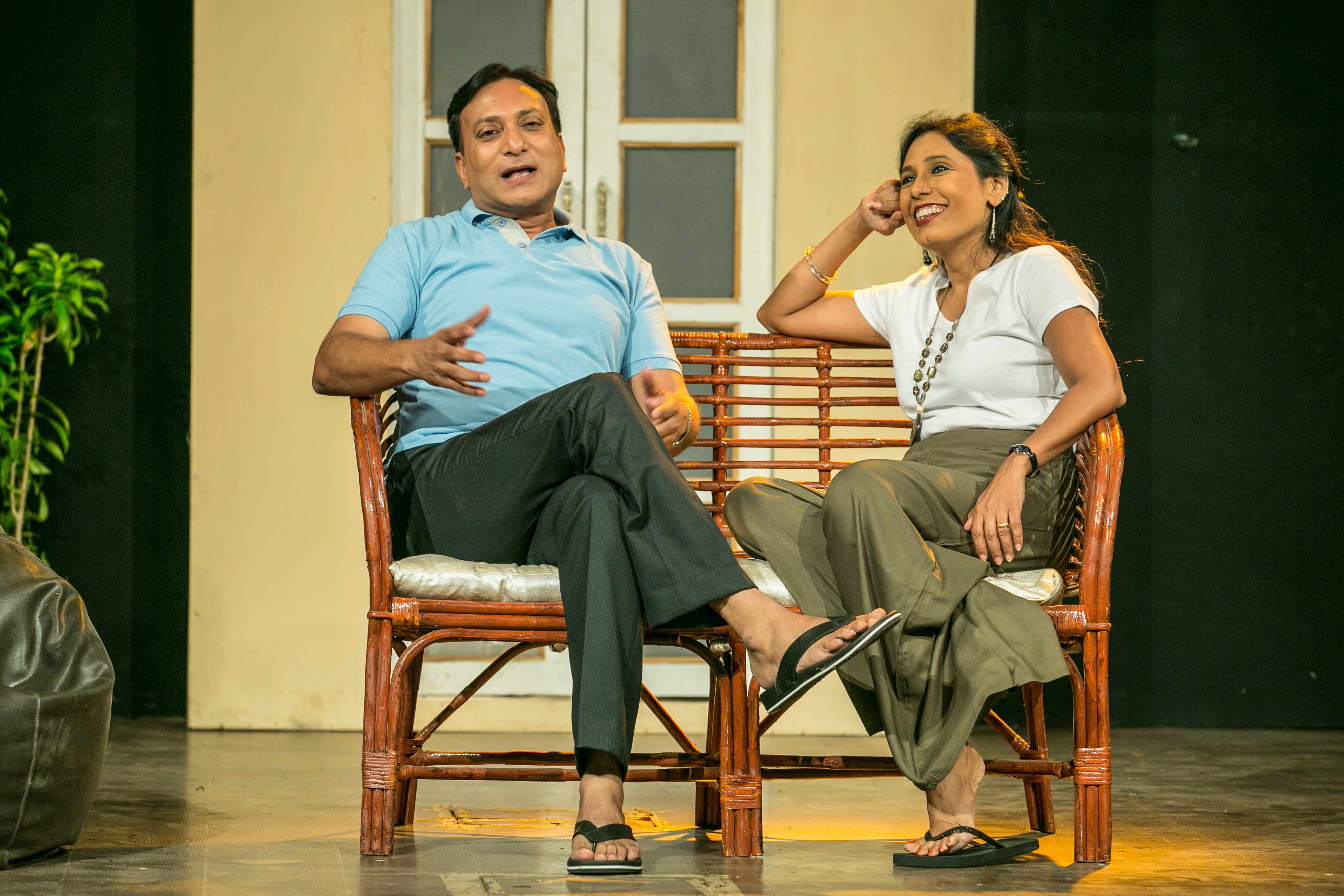
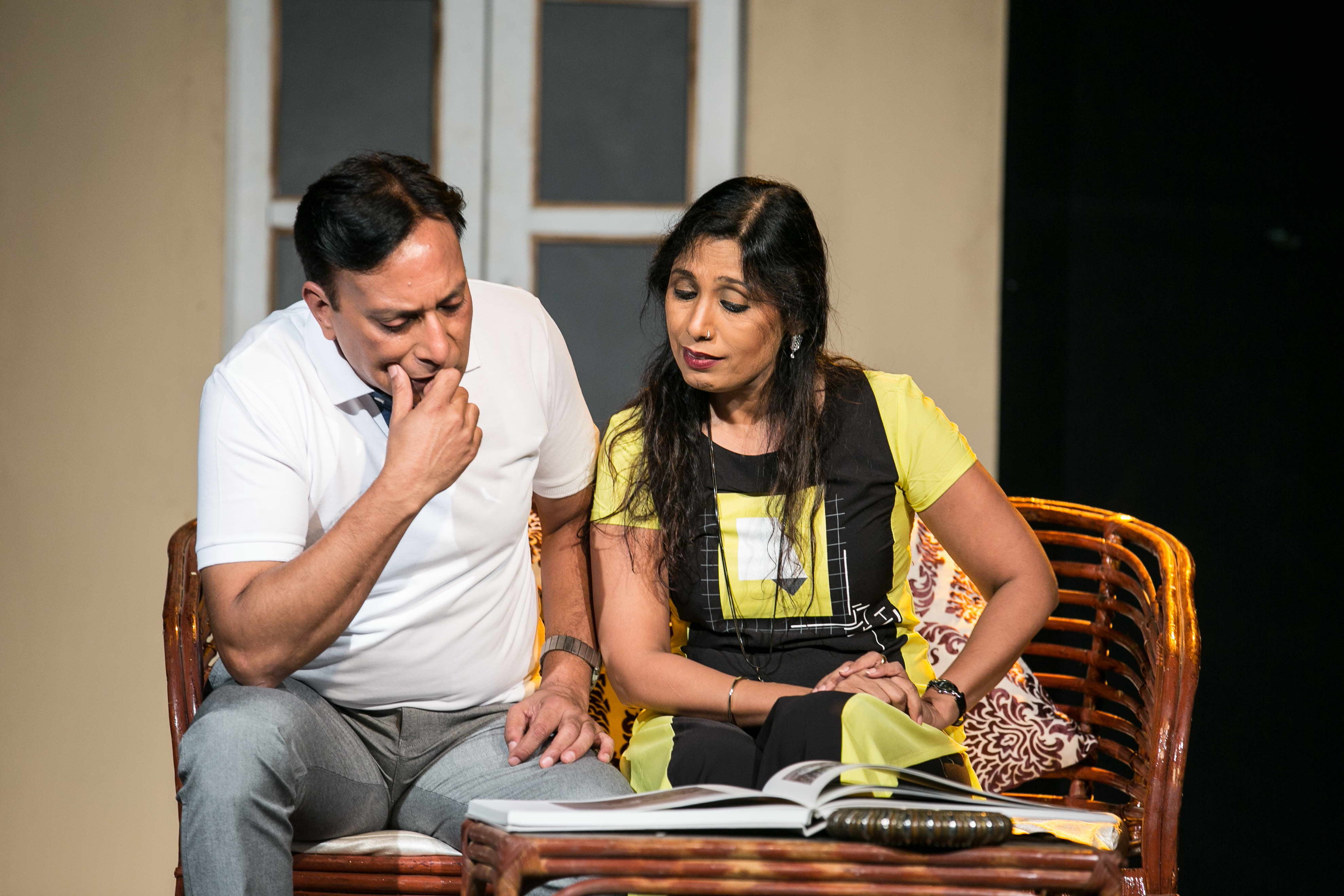
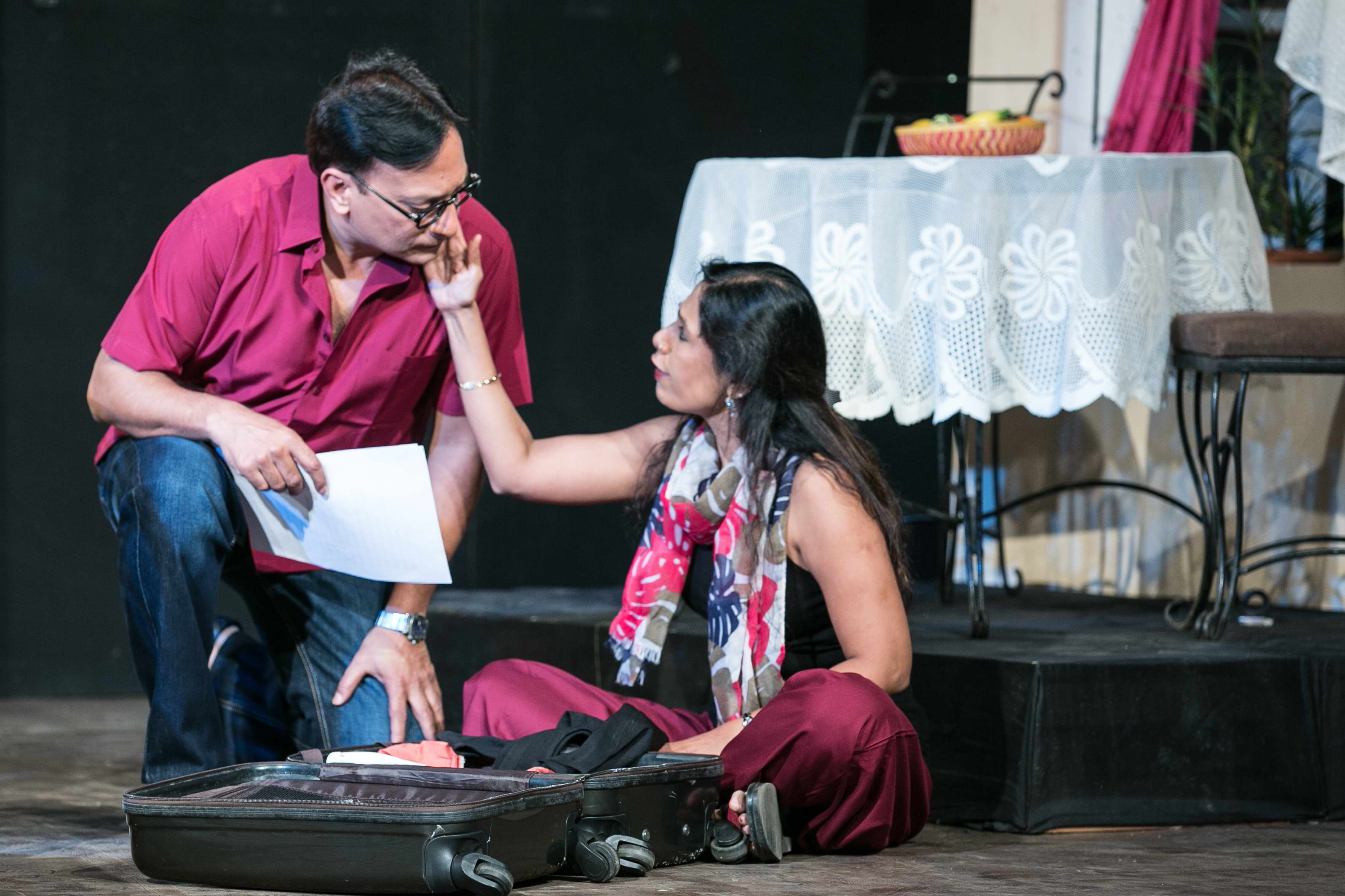
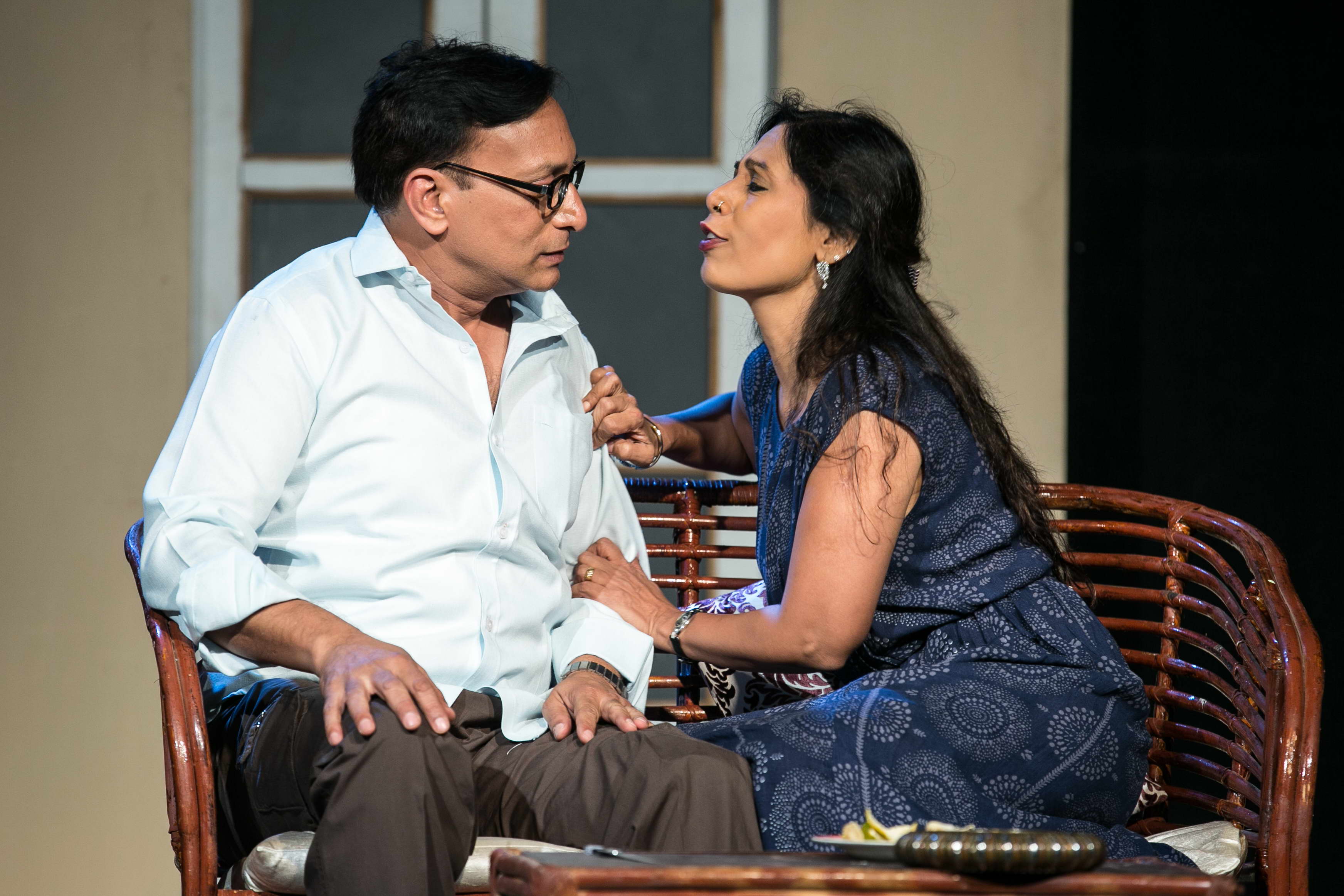
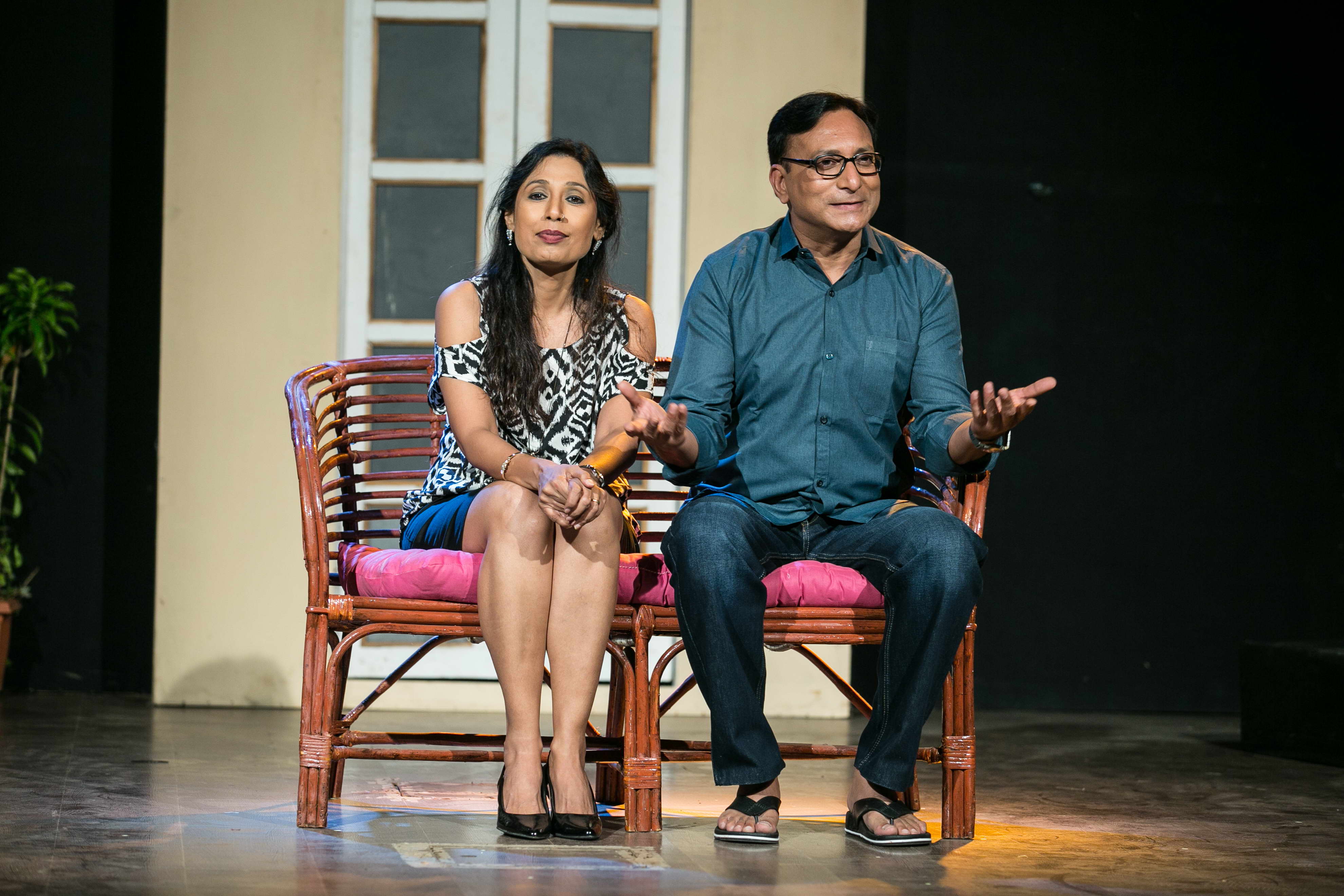
CAST
- Preeta Mathur Thakur.
- Aman Gupta.
CREDITS
- Lights Operation----------Shivaji Shinde.
- Music Operation----------Darshan Pawar.
- Costumes----------Ishi Shrivastav.
- Hindi Translation----------Richa Sharad.
DESIGN & DIRECTION : VEENA BAKSHI.
Duration: 1 hour 20 minutes including an interval for 10 minutes.
RAVINDRANJALI
SEASONS OF LOVE,GURUDEV KE SANG
Of all his creations, his songs occupied a special space in Gurudev Rabindranath Thakur’s heart. He has differentiated between his poems and his songs...... “My plays, poems and stories may not stand the test of time but Bengali society will ensure that in the court of the future, my songs shall live on forever….on the lips of the householder and that of the lone traveller…….in the cultivating fields and on the rivers….they shall resound into the future….because they arise involuntarily from my consciousness, they are the intrinsic expressions of my free mind..”
Love is the life-blood of Gurudev’s songs – they may be songs of worship or songs of Nature, they may talk of an intense physical attraction or the search of a beloved beyond, Love is predominantly woven into the fabric of his songs. The growth and changing face of this love, expresses the changing phases of Gurudev’s life.
The imagery of Nature is all-pervasive in Gurudev’s songs. Everyday life lived in the lap of Nature and a waiting… hearts filled with a unique yearning, a seeking…. From the imagery of Nature emerges the face and being of the Creator which in turn deepens our experience of Nature, links our inner core with the outside and brings a longing for a deeper, more profound union.
From the Love and celebration of Nature in its changing seasons to physical Love and then a yearning for the ultimate union, an invitation to the divine, this dramatic presentation is a selection of Gurudev’s songs as translated into poems by the noted Hindi Poet, Prayag Shukla. It is a recitation of Gurudev’s favourite songs in Hindi linked to Rabindra sangeet in Bengali and embellished with the Rabindra dance form and abhinay.
This is a unique production aimed equally at lovers of Rabindra Sangeet as well as those who seek to be overwhelmed with Gurudev’s genius. It is also aimed at those members of the Hindi audience who are newcomers to Bengali and Gurudev’s works. The presentation therefore aims at not only celebrating Tagore but making him more accessible and understandable to the wider Hindi speaking audience. Above all this is an effort to culturally enrich ourselves and our society.
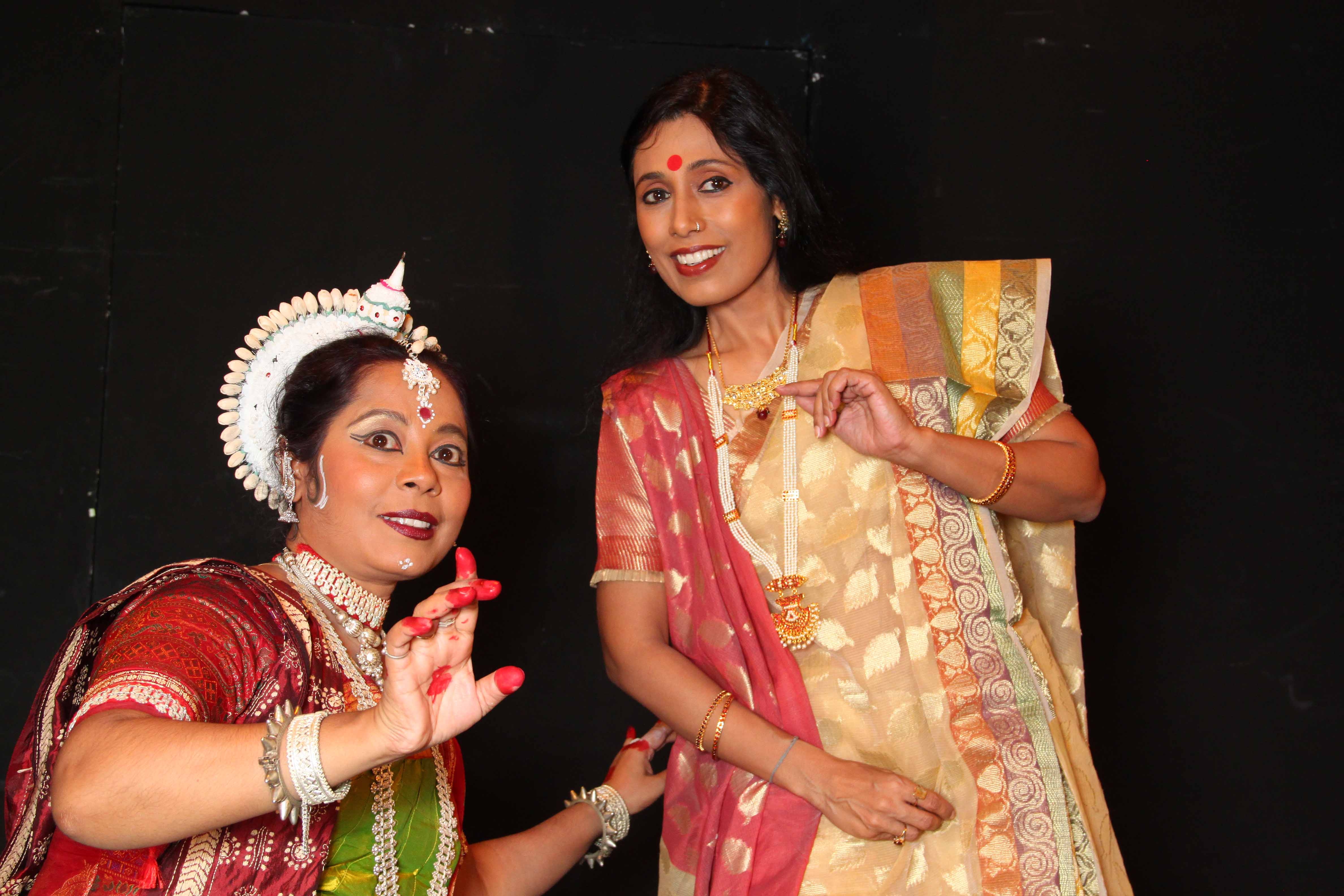
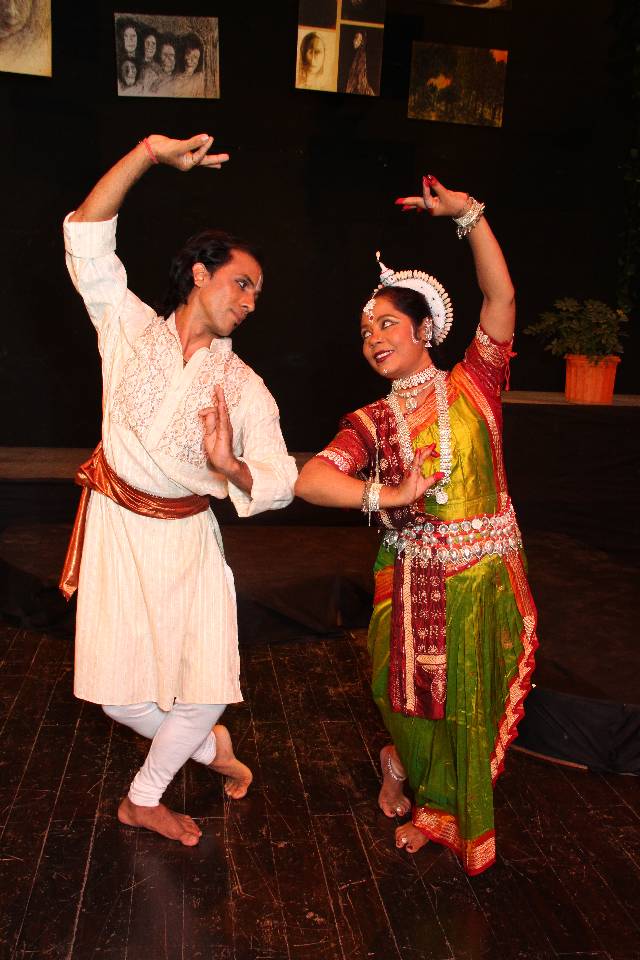
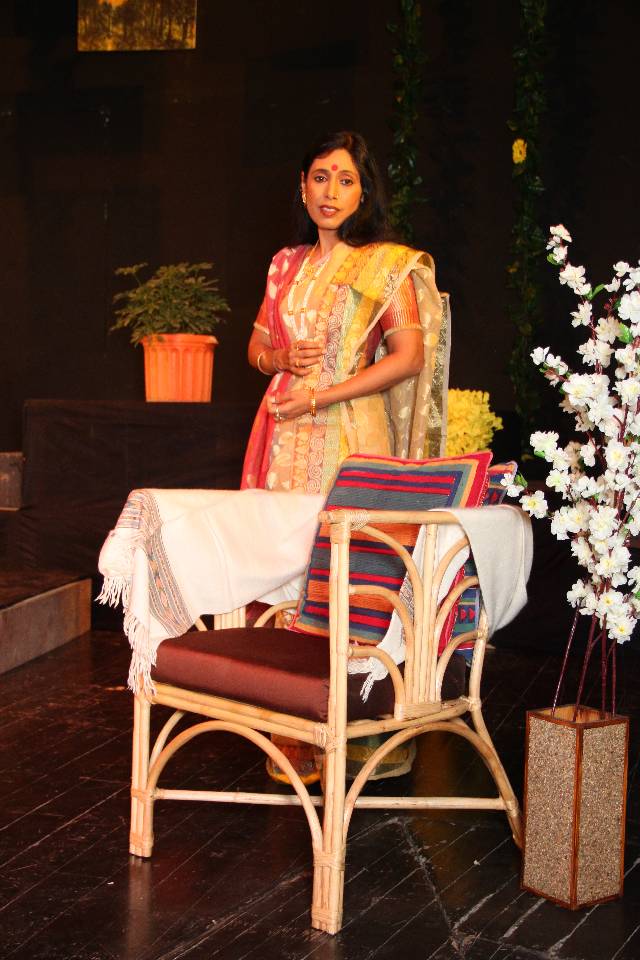
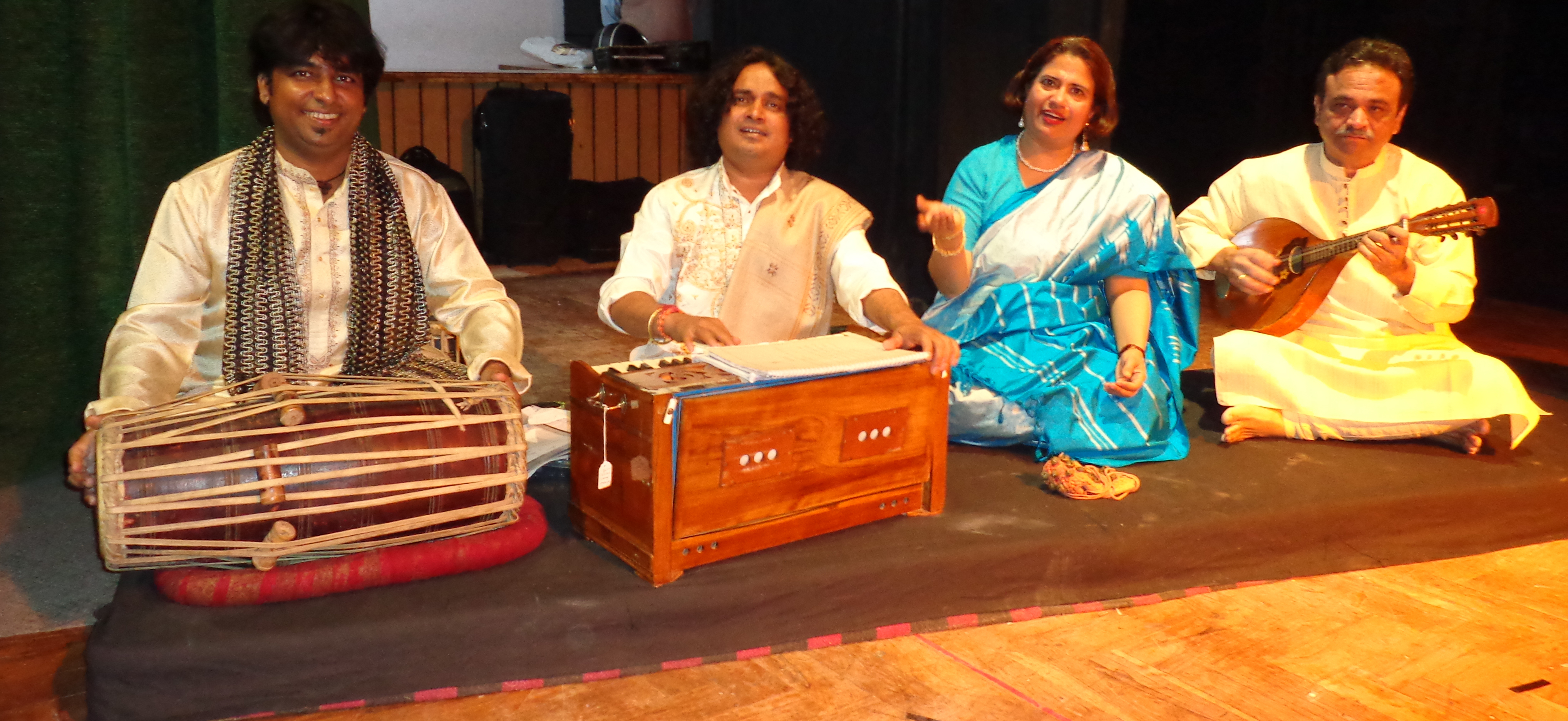
CAST
- Dinesh Thakur
- Preeta Mathur Thakur
- Aman Gupta
- Anagh Bannerjee
- Punita Chopra
- Jyotindra Bhatt
- Anupam
- Poornima
- Yogi Rajput &
- Tanushree Gupta
CREDITS
- Lights Operation----------Gunjan
- Music Operation----------Darshan Pawar.
- LIGHTS & SETS----------Dhanendra Kawade
- CHOREOGRAPHY----------Tanushree Gupta
- MUSIC DIRECTION:----------Prabal Majumdar
- Script----------Prayag Shukla’s adaptation of Rabindranath Thakur’s SONGS in ‘SUNO DEEPSHALINI’ & ‘NIRUPAMA KARNA MUJHKO SHAMA’
DESIGN & DIRECTION : Dinesh Thakur
Duration: 1 Hour with no interval
PRASHN PANCHALI
On the 5000th anniversary of the great Mahabharat war, Ank presents the great epic in fast forward
The Epic Mahabharat talks about the war between the Kaurav and Pandav cousins. The Pandavs aligned themselves for war with their cousins, the Kauravs to avenge the humiliation of their wife, Draupadi and to gain what was rightfully theirs, denied to them by their cousins.
Draupadi Questions…..
The Mahabharat has been the eternal mirror of any society. The characters of the Mahabharat are real, flesh and blood with human foilbles, weaknesses and strengths. This mirror reflects the same questions in every age. In difficult, tumultuous times in our lives, the questions arise to suffocate us, even the memories of happier times become question marks!
In Prashn Panchali, Draupadi takes up the cudgels on our behalf. Even as she talks about her relationships and situations, they find an easy echo in the life situations of today’s women. But this is just not about women alone, she reasons about the other characters and their questions are just as overwhelming. There is ecstasy and pride alongside anguish, suffocation and desperation and also guilt that seems to find no absolution.
Does Draupadi have the answers to the questions that Karna, Bhim, Duryodhan and even Gandhari put to her? And who has the answers to her questions? Is this life just an endless search for deeper meanings, a search for inner values, a search for answers of cosmic questions? And where are the answers? Are there any?
OrIs this life just a submission of all questions onto the lotus feet of the Lord, is it about a surrender so absolute that the questions disappear?
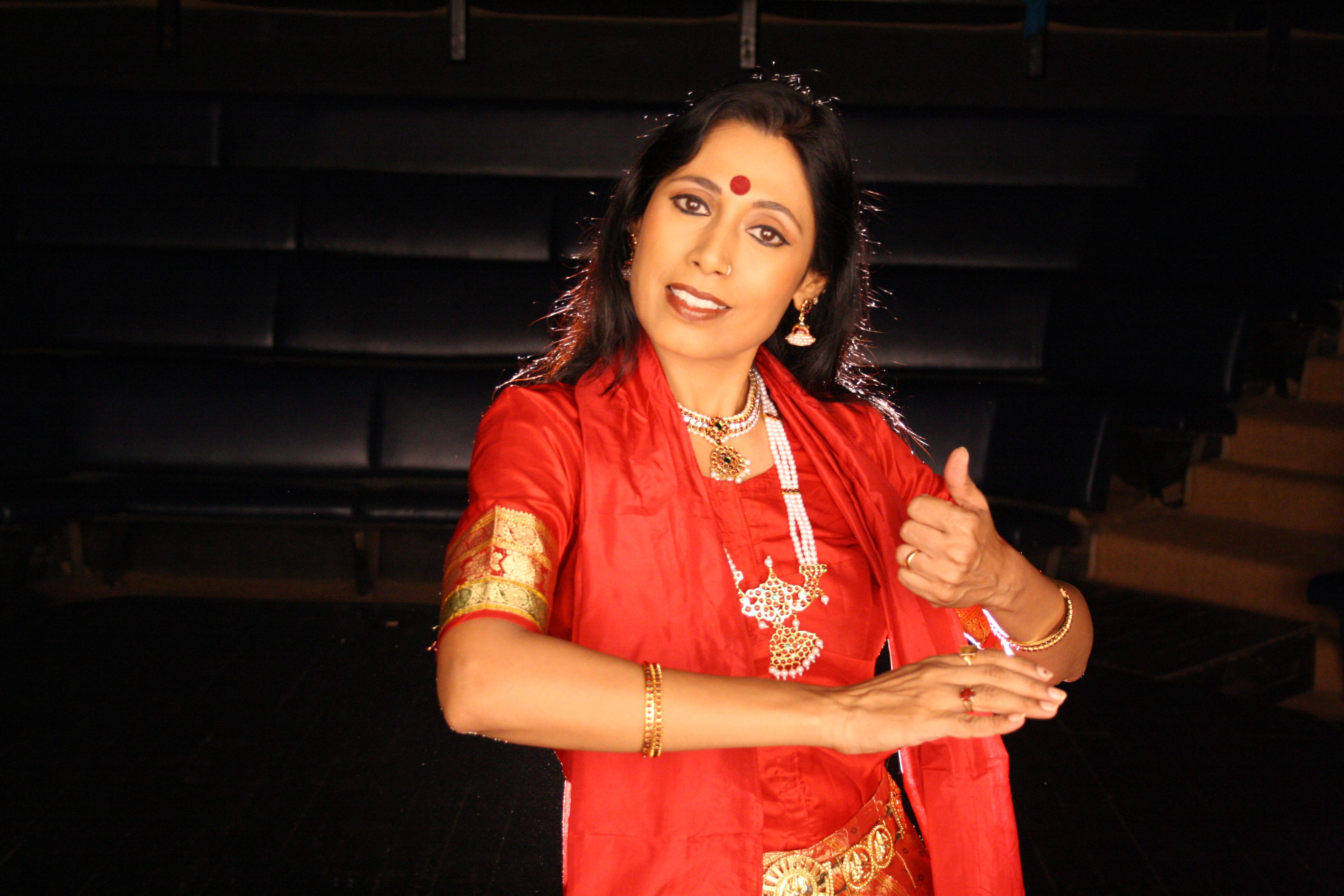
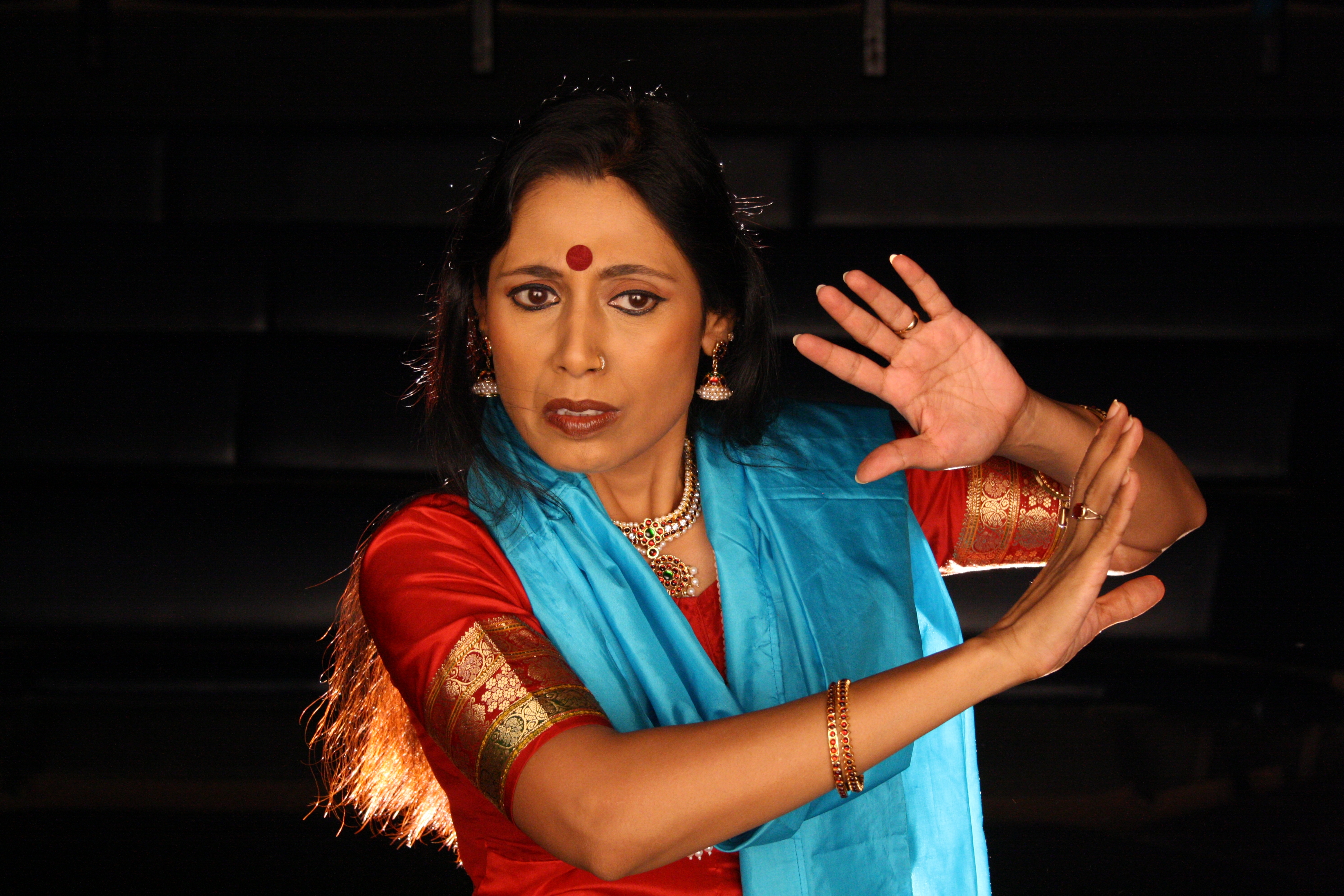
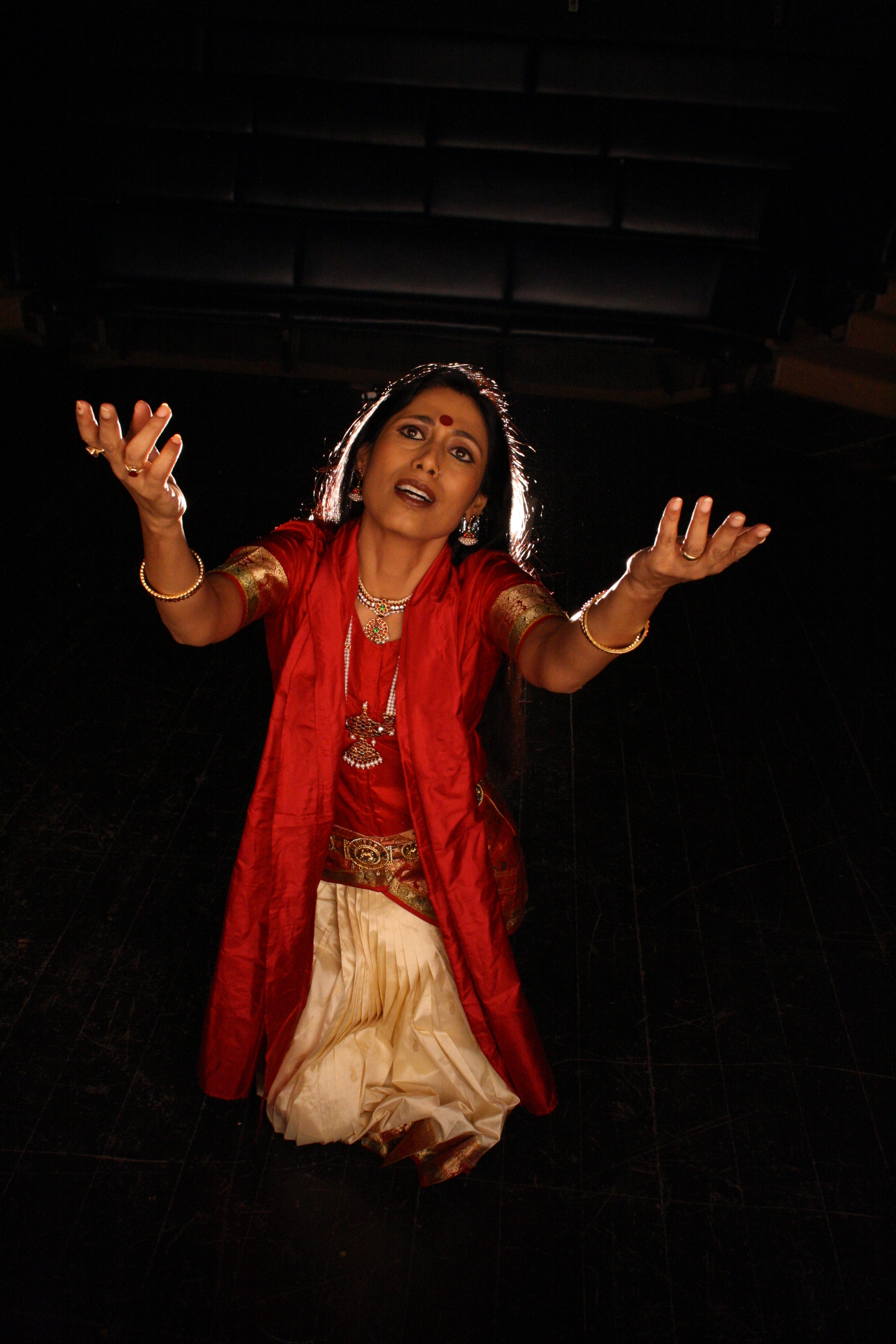
CHARACTER
- KUNTI : The mother of the Pandavs
- KARN : Kunti’s eldest son whom she abandoned, born before her marriage to Maharaj Pandu
- DRAUPADI : Daughter of King Dhrupad and wife of the five Pandav brothers (also known as KRISHNA or PANCHALI)
- ARJUN : The third of the Pandav brothers who won Draupadi in the Swayamvar
- DRAUPADI (KRISHNA/ PANCHALI)
- BHIM : The second Pandav brother and one of Draupadi’s five husbands
- DURYODHAN :The eldest of the Kaurav brothers
- GANDHARI :The mother of the Kauravs and wife of Dhritirashtra, the Kaurav King
- DRAUPADI (KRISHNA/ PANCHALI)
- KRISHN:The Lord Himself
CAST
- Preeta Mathur
CREDITS
- Design & Direction......DINESH THAKUR
- Music (recorded).........AMOD BHATT
- Percussion.................... Ashish Jha & Anoop Sinha; Sitar- Aparna Deodhar
- Alaap........Rubi Bhatt, Ankit & Pushkar
- Costumes & Choreography.....GOWRI RAO MEHTA
- Lights.... AMAN GUPTA, Sound: DARSHAN PAWAR
DEATH IS THE CREATION OF THE UNAWARE. IF YOU ARE AWARE, IT IS LIFE, LIFE & LIFE ALONE -SADHGURU JAGGI VASUDEV
KAAMIYA
Winner of the Sultan Padamsee Award when it was first written in the 1970s, KAAMIYA is invested with overtones of the seventies life and society of its author. Although making hilarious comments on society and the upbringing in a conventional Punjabi household, it highlights the isolation a woman must face if she necessarily wants to find herself. The play is about the space to grow that a society denies its women.
Having left the marital home, KAAMIYA begins where Ibsen’s Nora (Dolls House) leaves off. What could be the reason to leave a husband who loves and adores you? He worships the ground you walk on and allows you to have your way in most things. Perhaps this does not make for a healthy equation of the genders but what of the equations that exist as you return to your father’s home, your home? Can the patriarchal home you grew up in help to find your identity, allow you to live life on your own terms or is it a return to abhorrent stereotypes? Or perhaps Kaamiya is wiser now and can make a difference where it matters…..succeed now where she earlier failed….
The play also seeks to gain an insight into the Indian Women's liberation movement which started in the seventies and the confusion that existed in most minds as to what really constituted women's rights. Freedom makes sense if those upon whom it is bestowed know well how to use it or perhaps Freedom is also the freedom to make your own mistakes and find your own way……
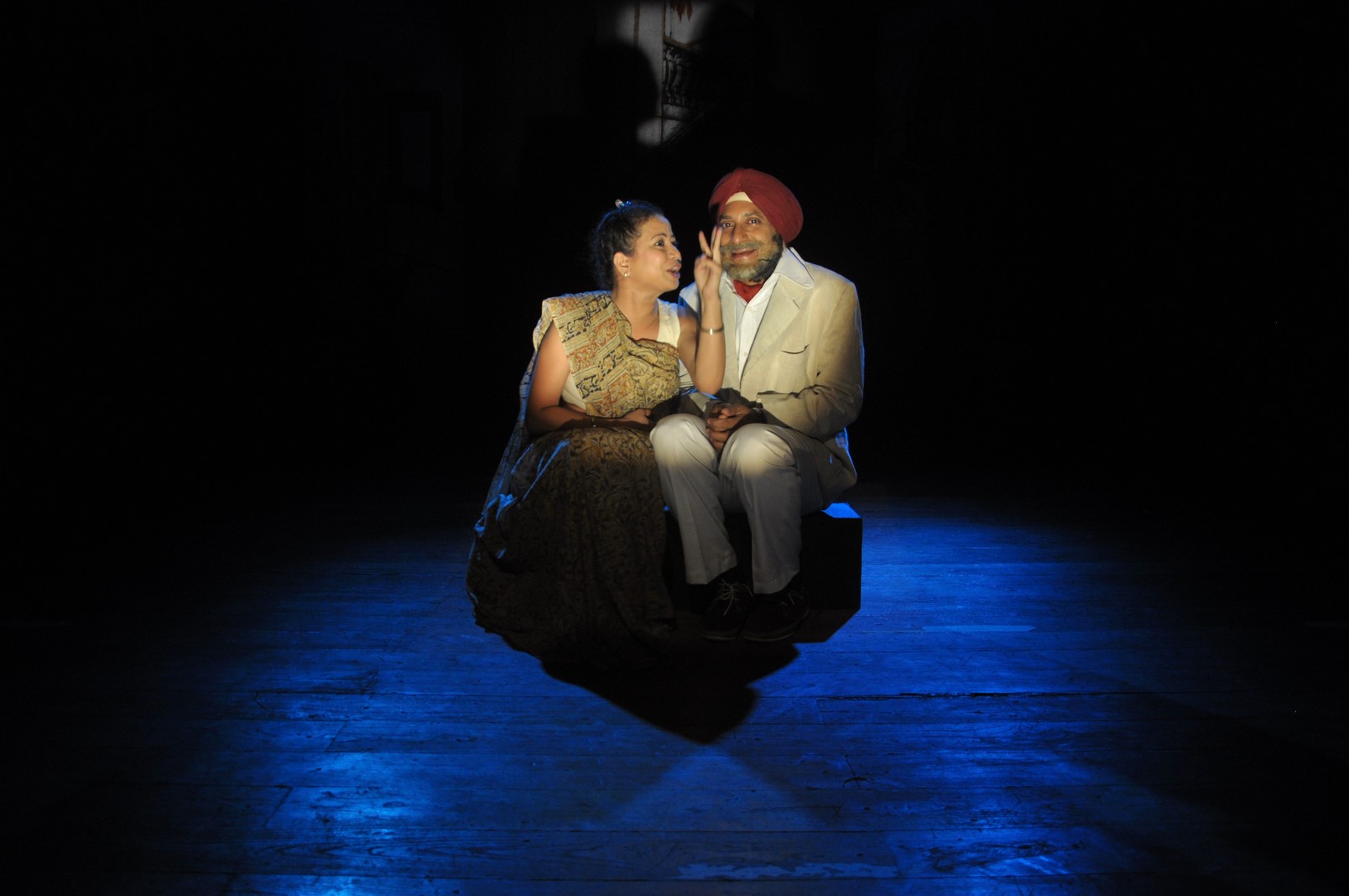
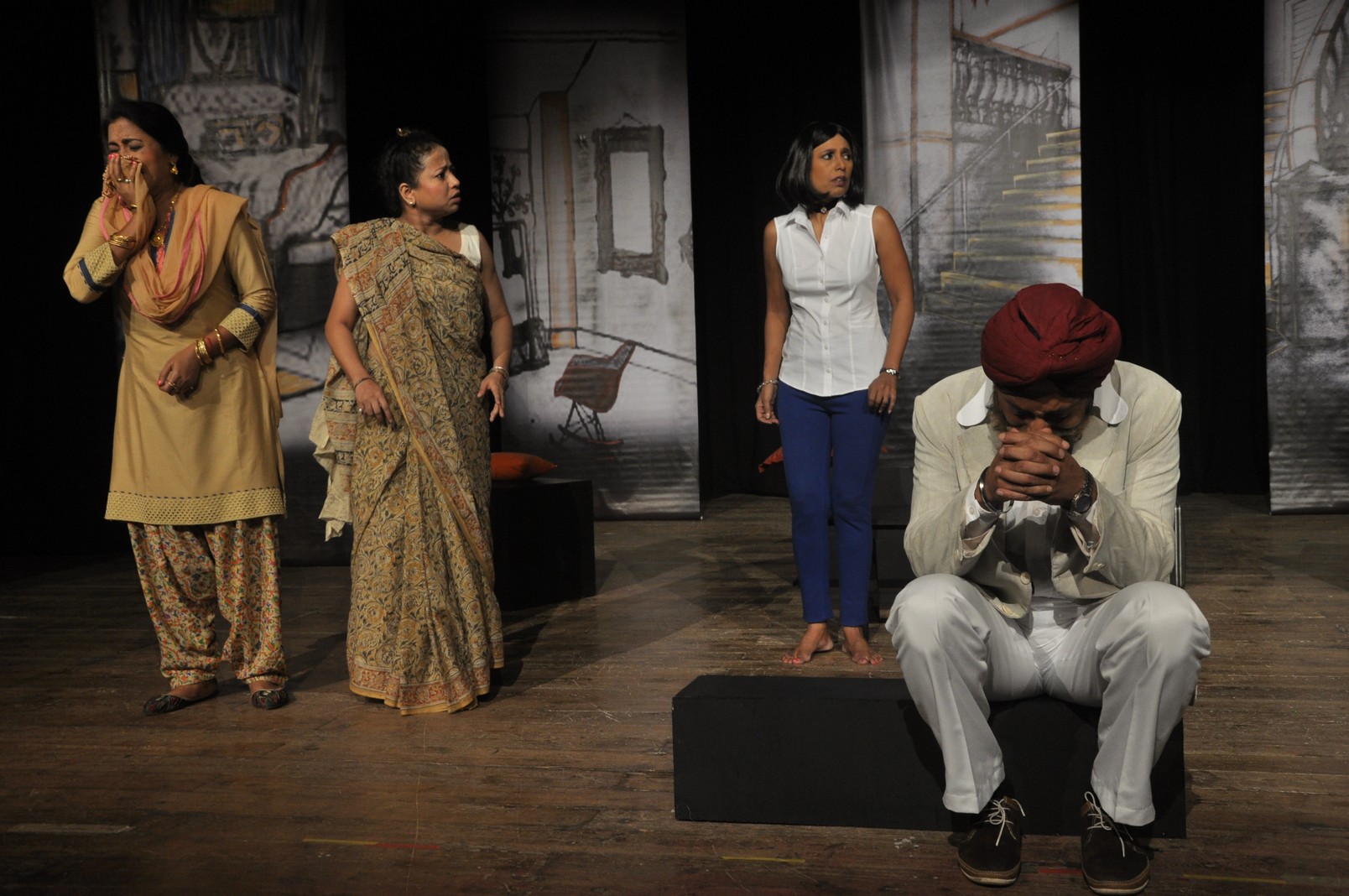
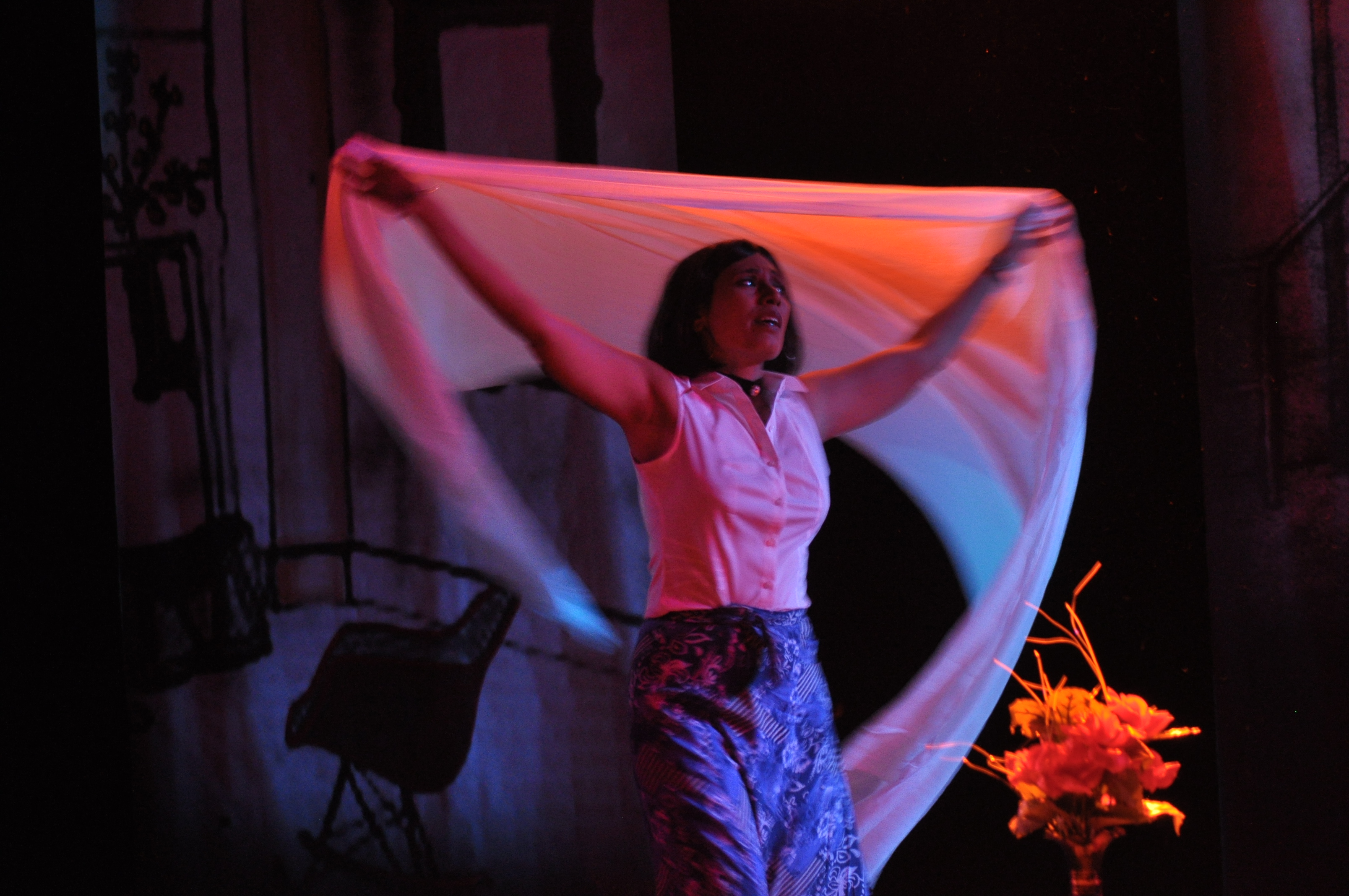
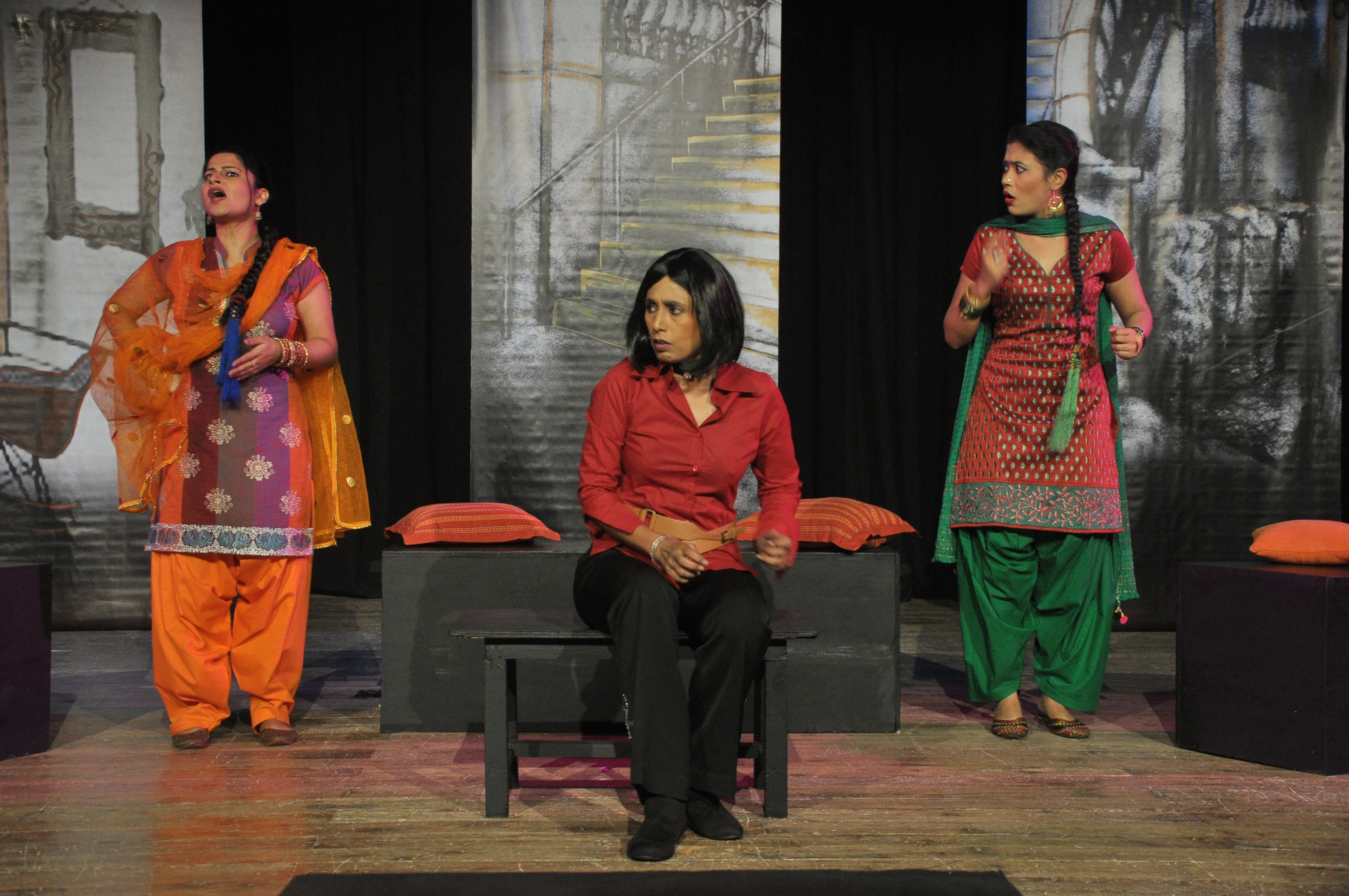
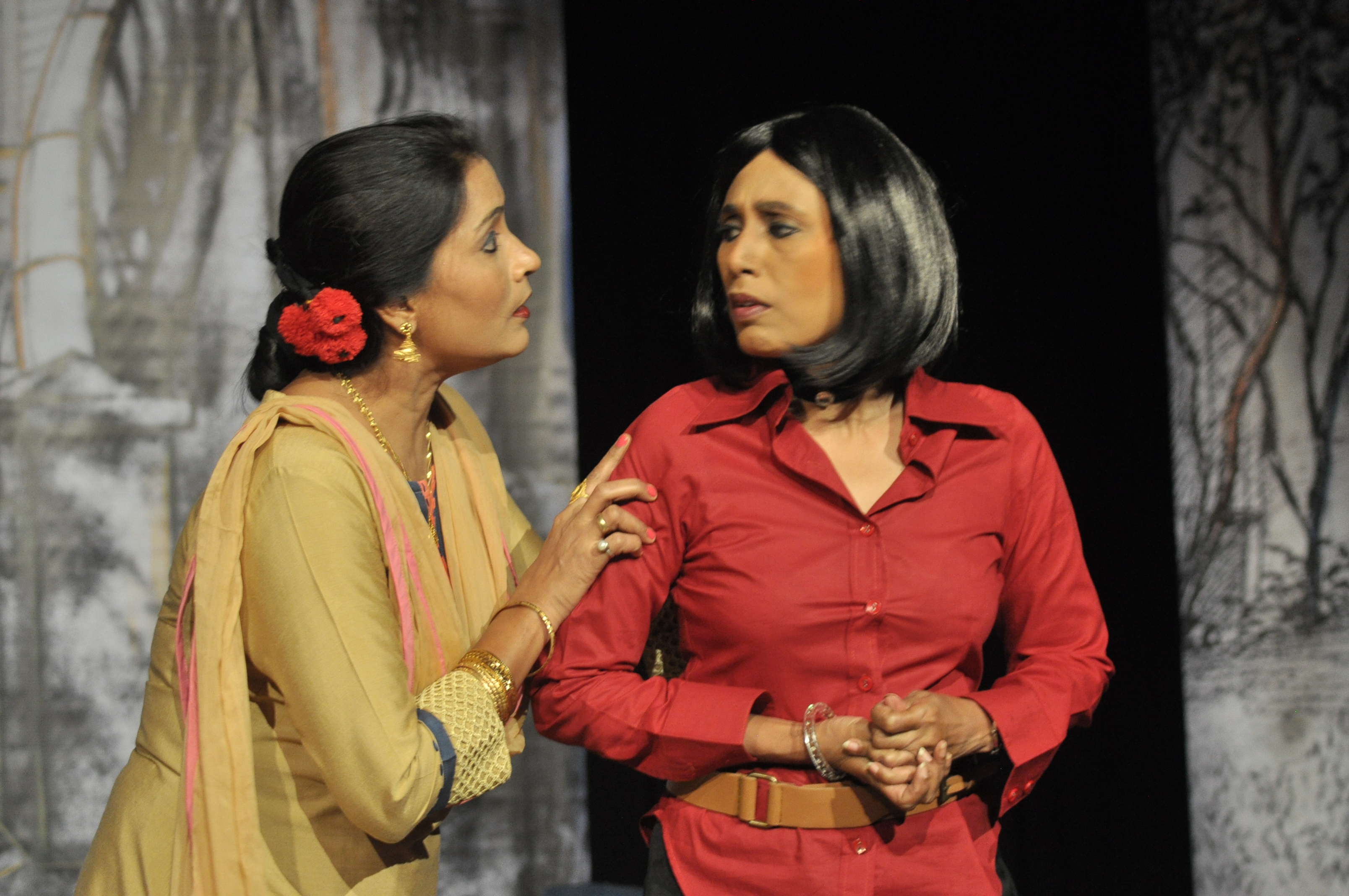
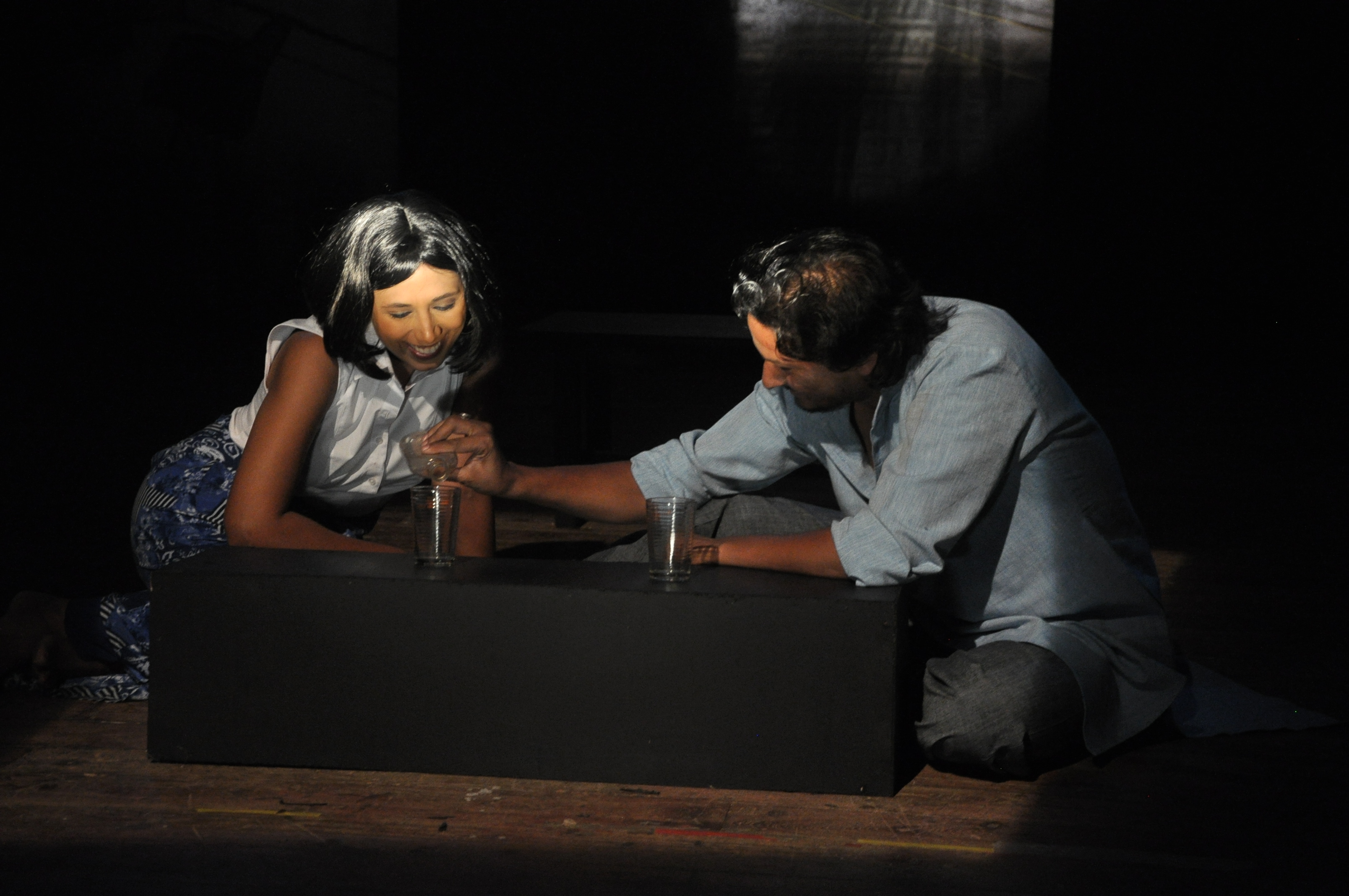
CAST
- KAAMIYA….Preeta Mathur Thakur
- MUMMY….Meena Vaibhav
- SARLA AUNTY…Laxmi Rawat
- DADDY…….Aman Gupta
- KAMLA………… Riya Khaund
- SAHELI 1……. Arunima Joshi
- SAHELI 2…… Riya Khaund
- NAUKAR…….Rahul Malik
- AMRITSARI…… Gunjan Kumar
- STUDENT……Sumit Bharadwaj
- MURLI……….Gunjan Kumar Music Design…..Aman Gupta Music Operation…Darshan Pawar Light Operation….Pradeep Bharti
CREDITS
- Writer ----------Kamla Kapur.
- Direction & Hindi translation ----------RAM GOPAL BAJAJ (assisted by Laxmi Rawat).
- Costumes----------Richa Sharad.
- Design----------Dhirendra Dwivedi
Direction & Hindi translation RAM GOPAL BAJAJ (assisted by Laxmi Rawat)
Costume by Richa Sharad Design by Dhirendra Dwivedi
Duration: 100 mts. Without interval
MITRO MARJANI (Woman of Passion)
In ank’s series of Performing Literature…..
Shattering the image of the revolutionary and ideal-upholding women characters of great literature, mitro is our controversial heroine of true Punjabi soil. Embodied with love, grit passion and fertility, unafraid to air her carnal desires in the face of conventional religion and society….yet….desperately seeking a ….fulfilment.
Peopled with characters we may find in our own homes who have an empathy , consideration and regard for each other and who yet set great store by doing what is righteous and expected in society, Krishna Sobti weaves a world that is quintessentially Indian. Resenred in a unique storytelling format, Krishna Sobti’s rich Hindi text is a treat for the Actor’s and audiences alike.
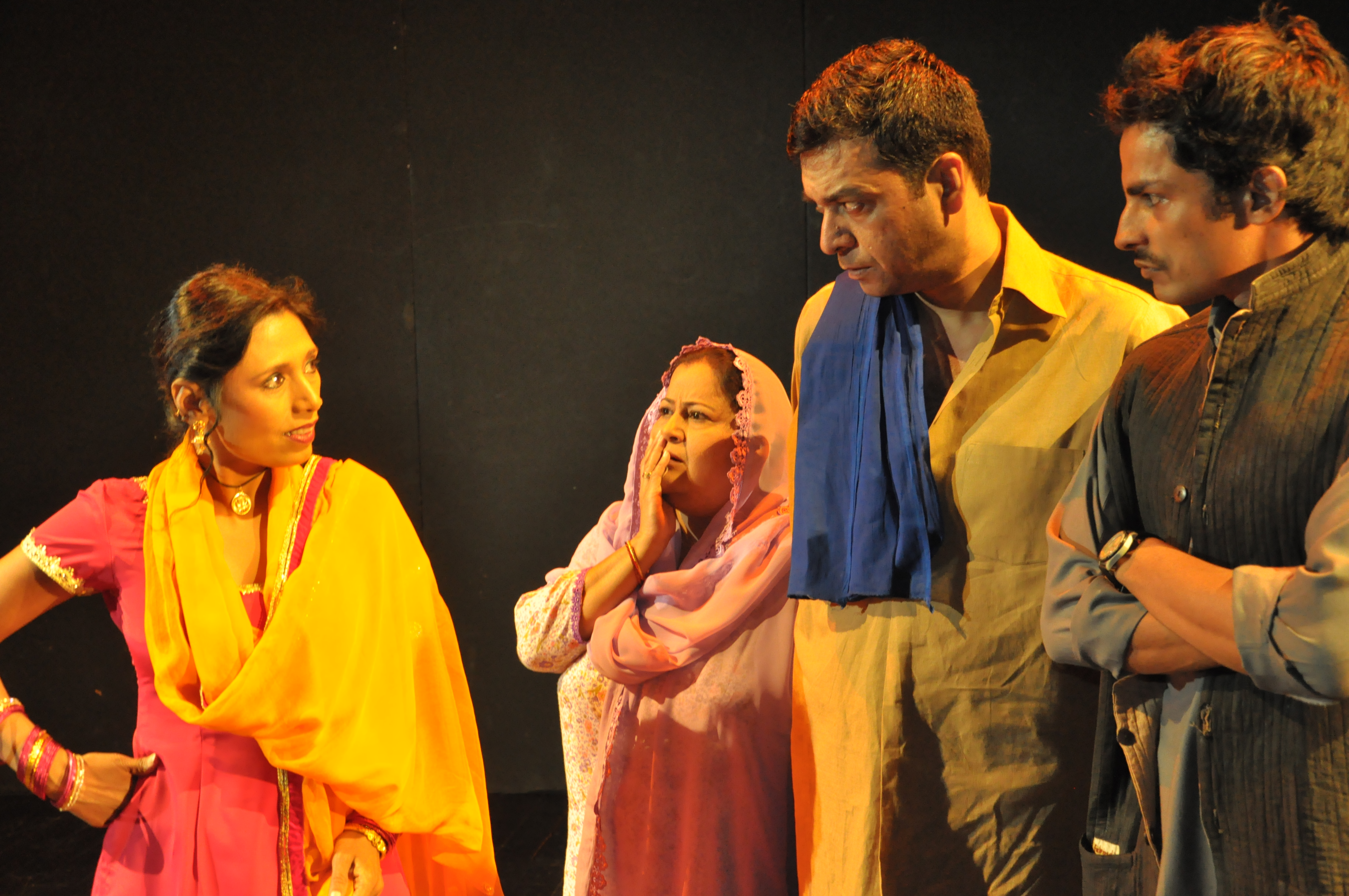
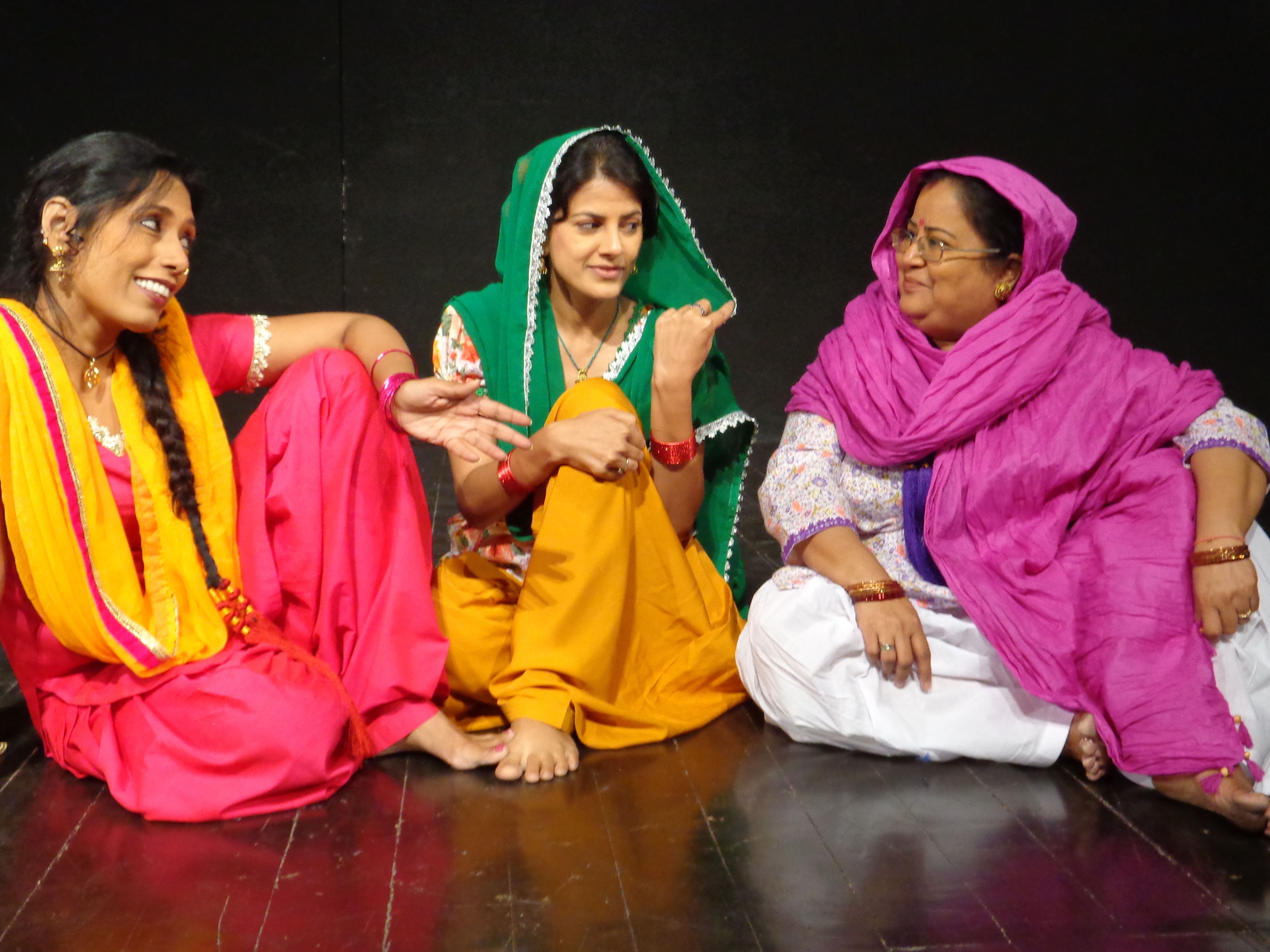

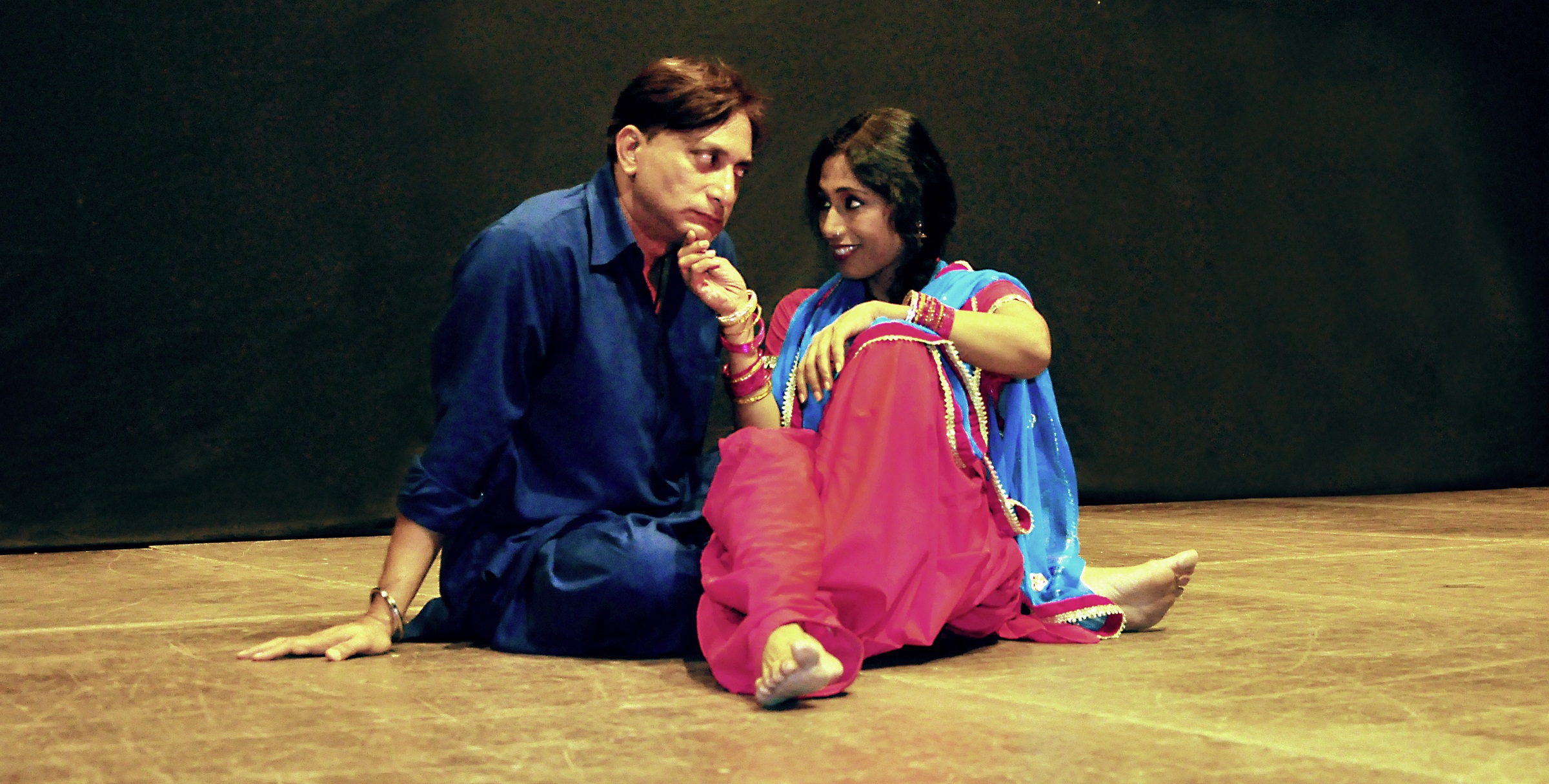
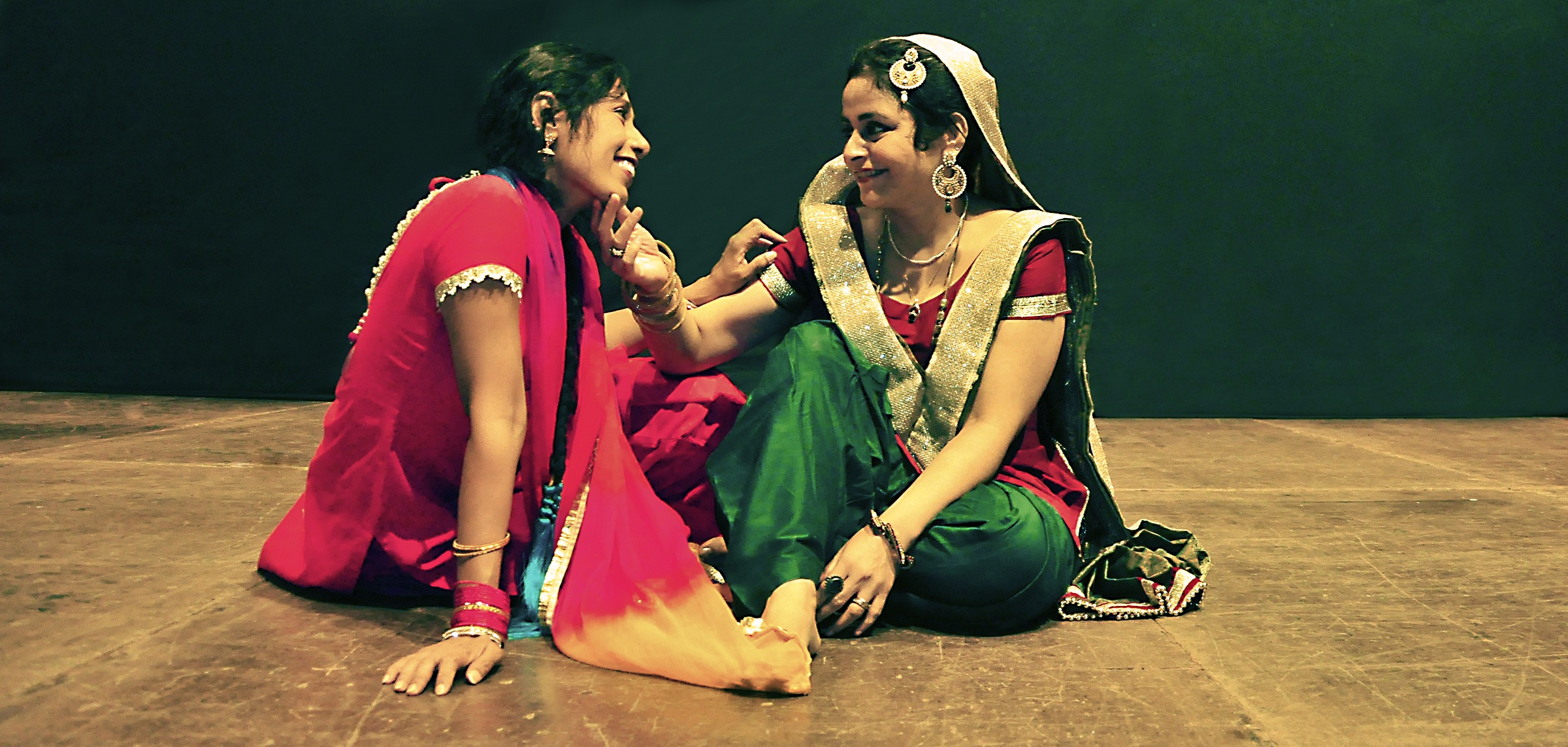
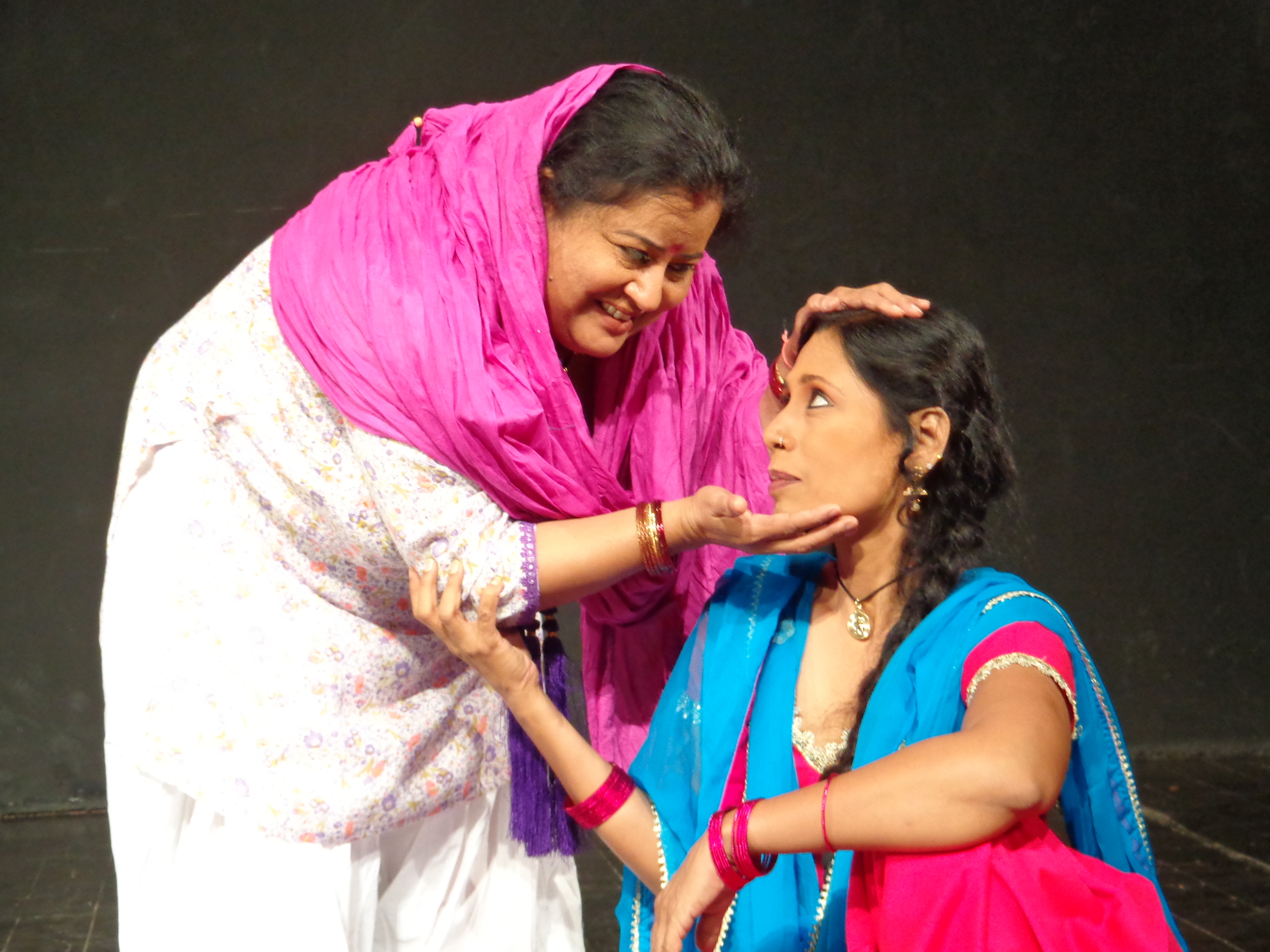
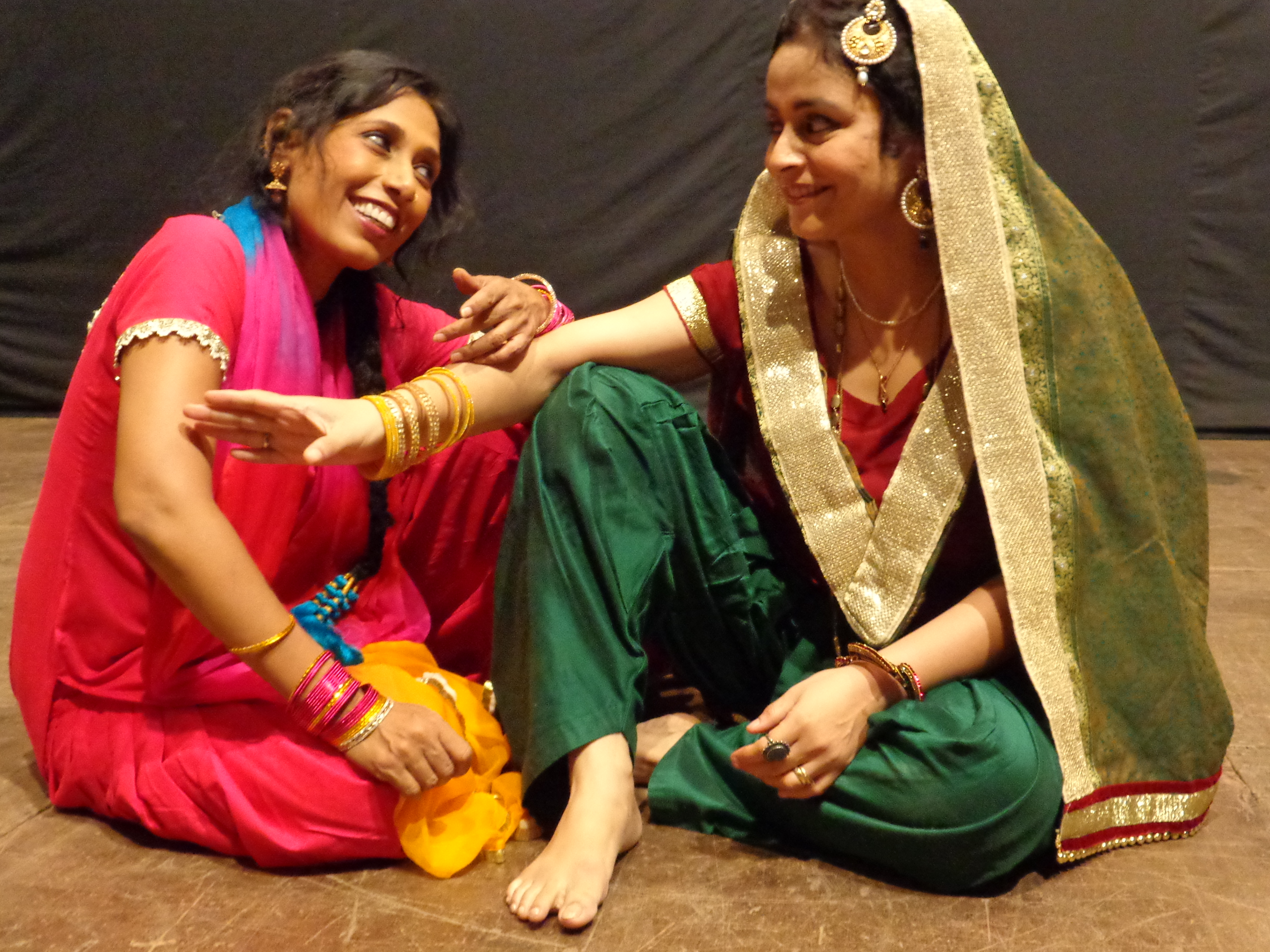
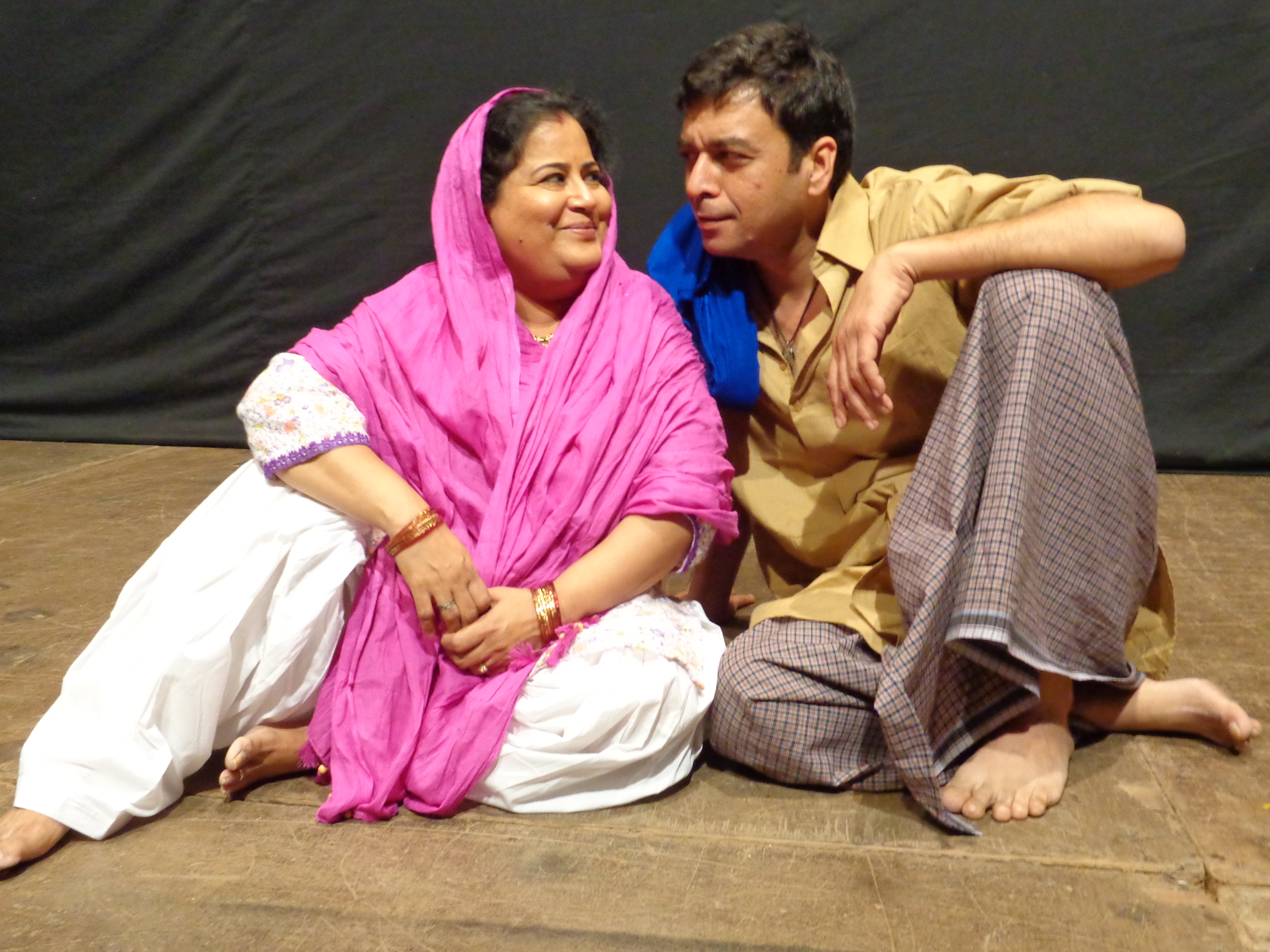
CAST
- Preeta Mathur Thakur
- Aman Gupta
- Satyajit Sharma
- Kanika Dang
- Anju Jatley
- Nivedita Baunthiyal
- Shilpi Om
- Romit Ranjan
- Achher
- Hardeep Singh
- Kunwar Singh
CREDITS
- Lights Operation........Shivaji Shinde
- Music Operation..........Darshan Pawar
- Make Up.............Sunil Joshi
- Backstage..............Burhan, Rajat & Shubhanshit
- Music................Kuldeep Singh
- Costumes.............Richa Sharad
- Lights Design...........Dhanendra Kawade
Design & Direction:DEVENDRA RAJ ANKUR
1 Hr 30 mts. Without Interval
KHAMOSH - Years-1983-1993-2011
Vijay Tendulkar’s Contemporary Classic Satire
A Searing play about a woman at the mercy of social forces that threaten to engulf her. Working on various levels, the play reveals her plight amid the inner violence prevailing in the society, revealed through a mock trial by a group of actors, that rises to a dramatic crescendo!
A group of actors arrive at a small town from the city for a performance- disseminating important social messages through their plays is a task they take seriously. Not all of their troupe has turned up and they have time to kill, so they set about replacing their missing actor with a local. The mock trial to give the newcomer an experience of the courtroom, however, begins to turn violent as the boundaries between game and reality blur and unfulfilled desires, long denied frustrations and hidden insecurities come to the fore. A society that acutely feels its incompleteness and inferiority preys upon its weakest members. The easiest way to acquire a superiority in the eyes of peers and superiors is to push down those weaker and more vulnerable!
This play is Vijay Tendulkar’s telling comment on the cruelty of a society. Is India really in Sync with the times where women power is concerned? A society is judged by the manner in which it treats its weakest and most vulnerable. In the presence of a powerful constellation of immortal Devis we pray to, are we giving the mortal woman her due? Hardly so! Gender discrimination and harassment has evolved new forms in Corporate workplaces. The existing male order, highly insecure and immature, conspires to limit the progress of women in newer ways of victimization and corruption.
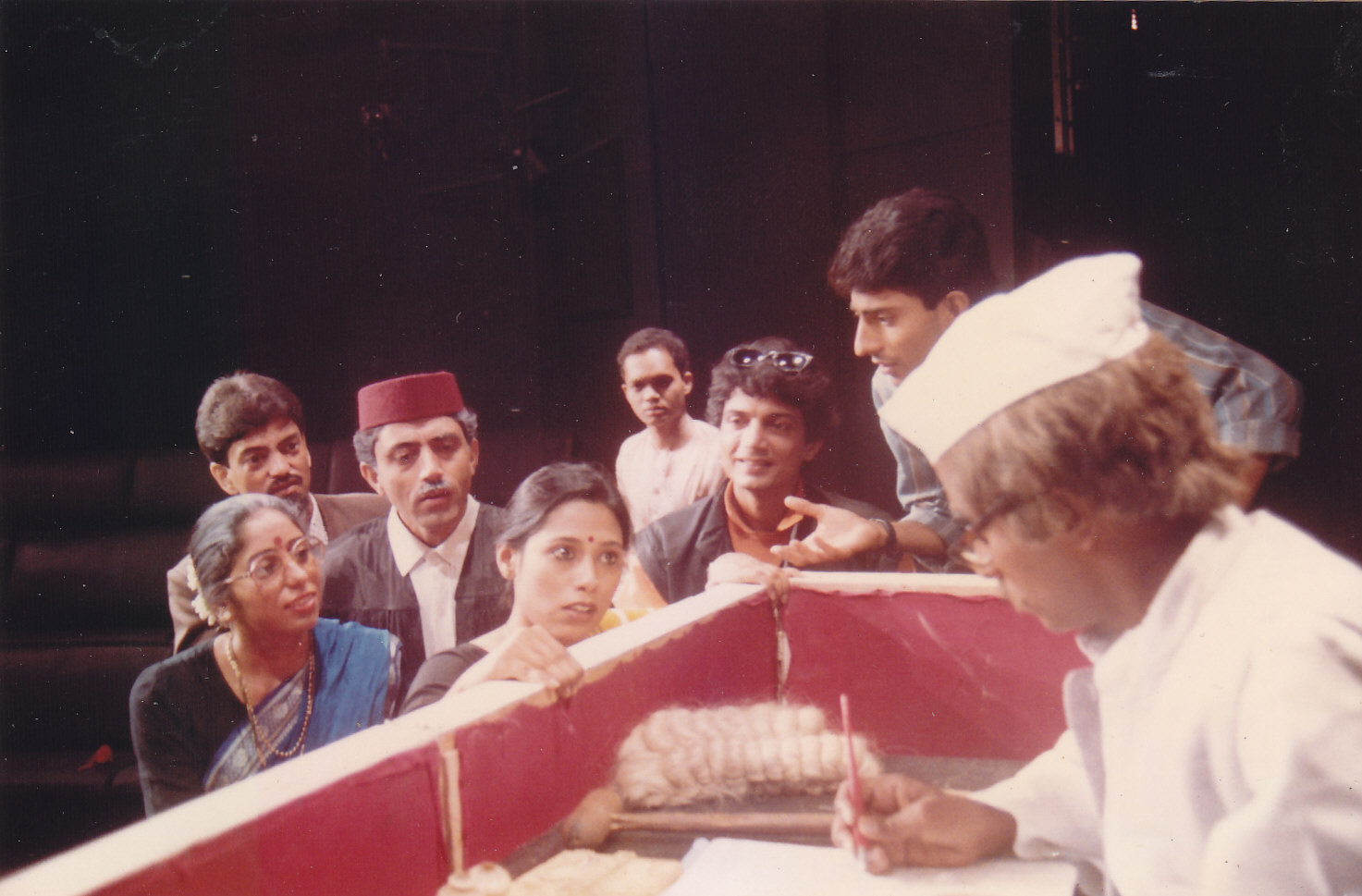
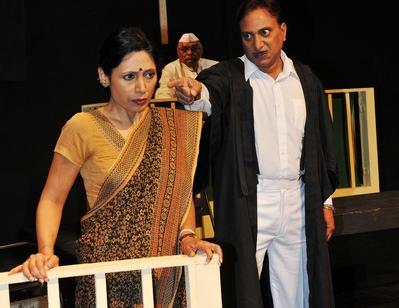
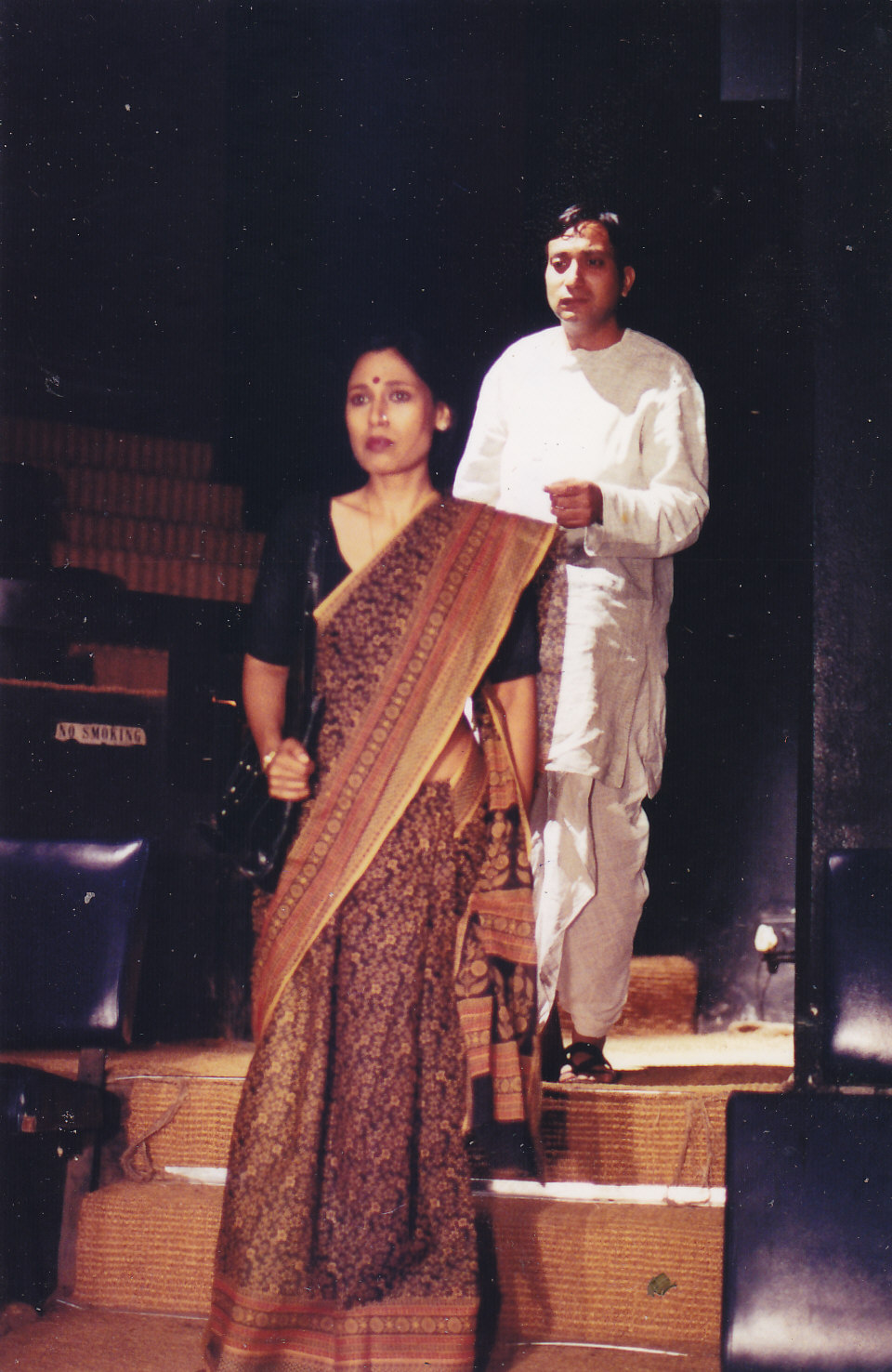
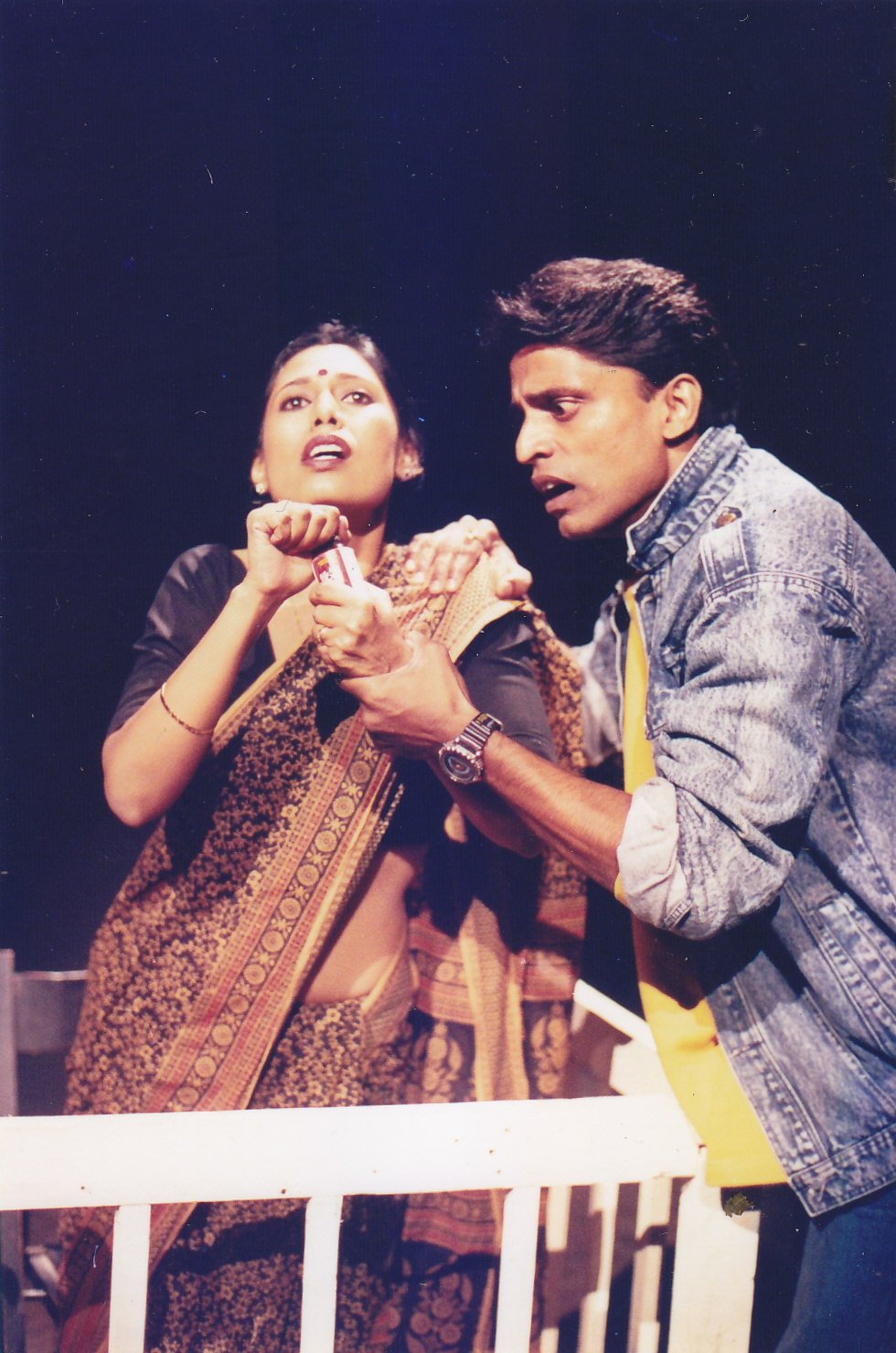
CAST
- LEELA BENARE………………………… ……Preeta Mathur
- SAMANT……………………………………….. Shanker Iyer
- PONKSHE……………………………………….Akshay Sharma
- SUKHATME……………………………………..Aman Gupta
- BALU ROKDE…………………………………..Ashish Salim
- KARNIK………………………………………….Binnie Mariwala
- MRS KASHIKAR………………………………..Madhu Shrivastav
- MR KASHIKAR..………………………………..S C Makhija
CREDITS
- Lights Operation…………………………….Nitin Sharma
- Music Recording………………….…………Radiowani
- Music Operation…………………………… Rohan Shroff/Sunil Deshmukh
- Sets……………………………………………Stage Vision –Pravin Bansode
- Make up………………………………………Sunil Joshi
- Publicity………………………………………Kajal Ads, Neha Aggarwal
- Stage Manager……………………………… Rohit
DESIGN & DIRECTION : DINESH THAKUR
Duration: 2 hours including an interval for 10 minutes
HAMARI NEETA KI SHAADI
Aa rahe hain na aap?
HAMARI NEETA KI SHAADI, written by National award winning Filmmaker, Veena Bakshi is a laughter beset 90 minute play that takes a look at the Indian obsession with weddings by looking at the day before a wedding. Kaveri and Dashrath, upwardly mobile typical Bomayites, originally from UP suddenly find their UP backbone when it comes to their daughter’s wedding. They are determined to have a beautiful wedding for their daughter Neeta with Kaveri striving for the most perfect party, food and décor that would be talked about amongst her social –set for years to come. The entire household, friends, assorted domestic help, an ever-interfering uncle have all been deployed by Kaveri to have a perfect traditional-by-the-book wedding! Living in Mumbai since she was born, the bride is oblivious and couldn’t care less for traditions which her mother has suddenly discovered as very important. Even as Dashrath and son Alok try to adhere to Kaveri’s exacting standards, the bride herself puts a spanner into this major work in progress on the day of the haldi, just before the wedding. Neeta who has been brought up with all the fuss and indulgences of the UrbsPrima is now being told to do things and perform rituals she has never seen or heard of. In fact, she is unable to recognise her mother as the same person she has known for the 24 years of her life! She is angry with her mother for choosing a yellow cotton saree for the haldi. For God’s sake, what will her friends say! And then not getting the prime wedding venue and the special going away car for the bride & groom is just too much! But Kaveri masterminding operations will brook no interference in what she now regards as her major project in life – her daughter’s wedding! Dashrath is happy to go along with his wife’s vision with his suggestions being occasionally accepted by the boss. Poor Alok is a bit torn between the boss and the bride! Neeta’s solution. Boycott the wedding by locking herself in the bathroom! Will the wedding take place at all? Will the two generations find the middle path to sanity?
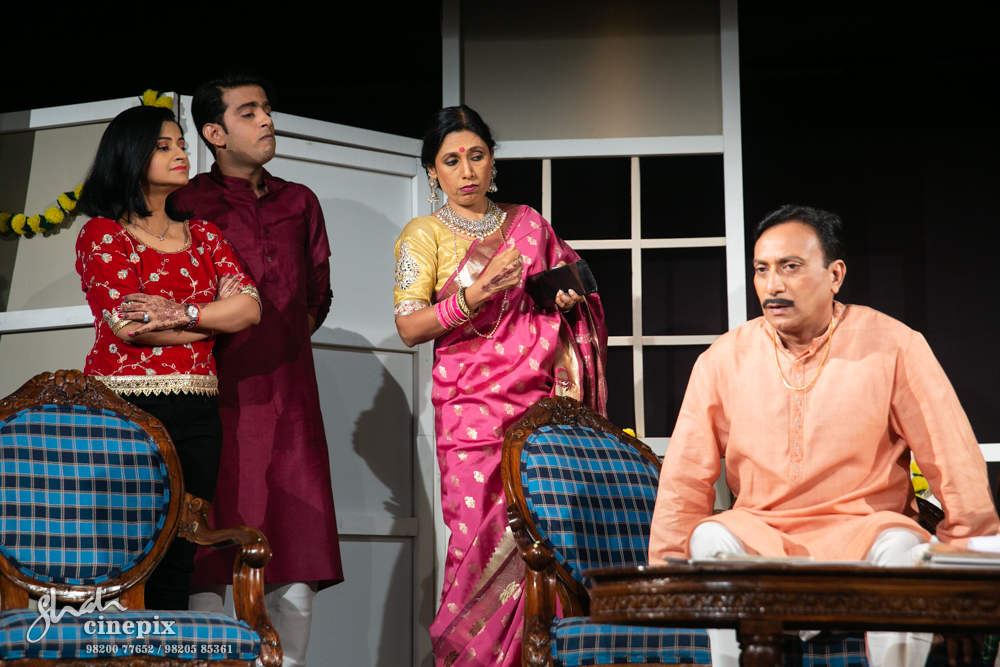
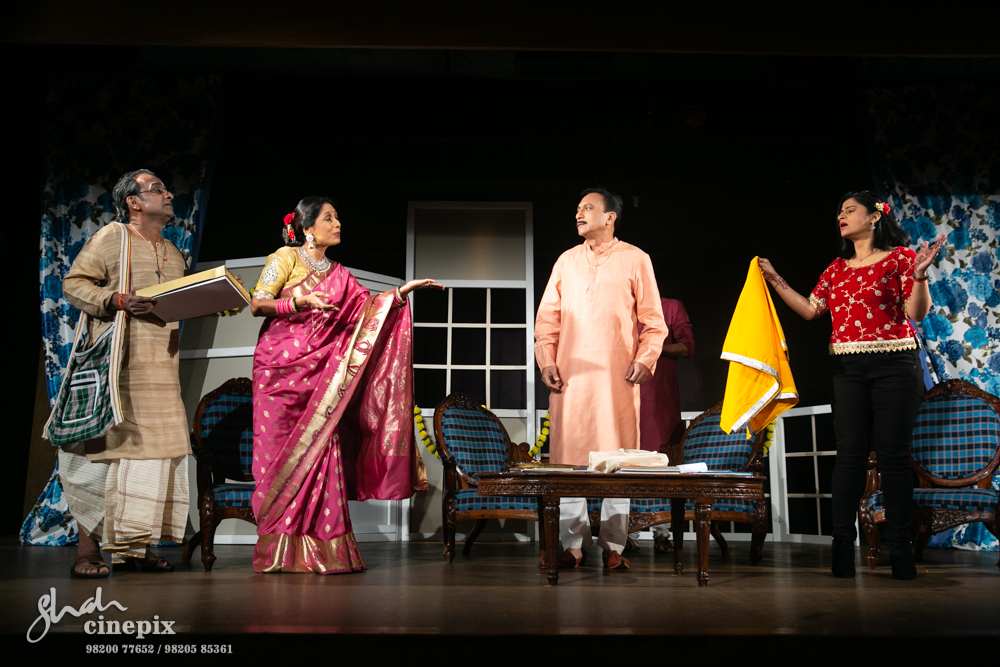
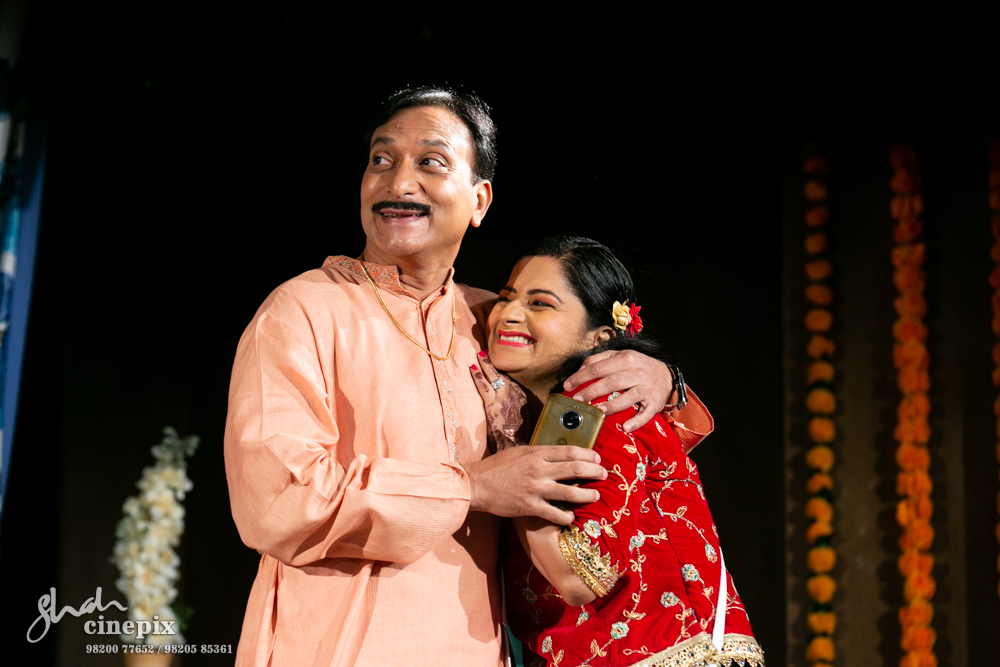
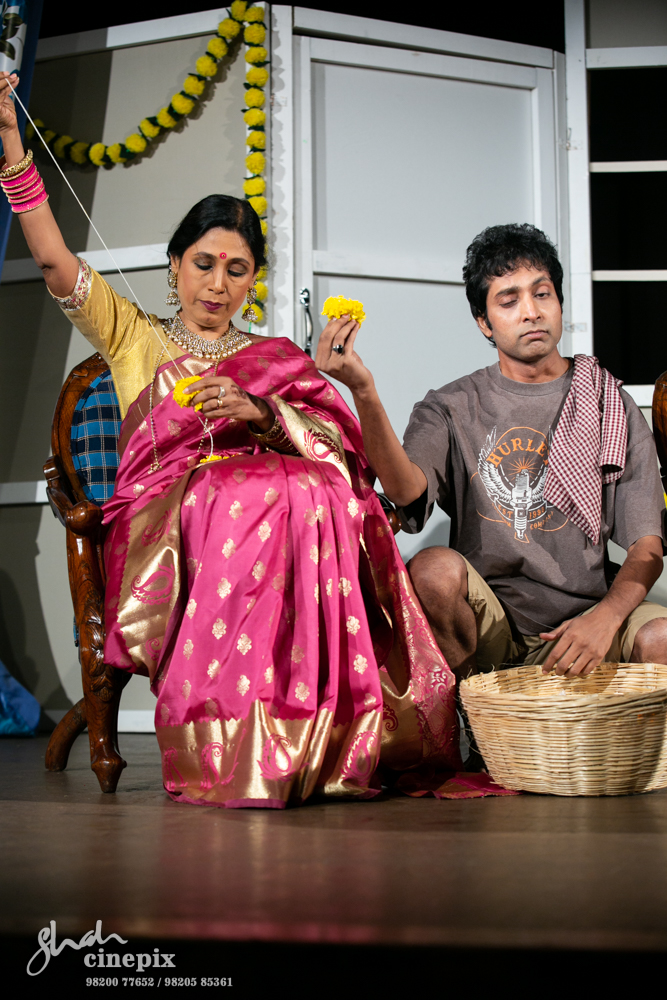
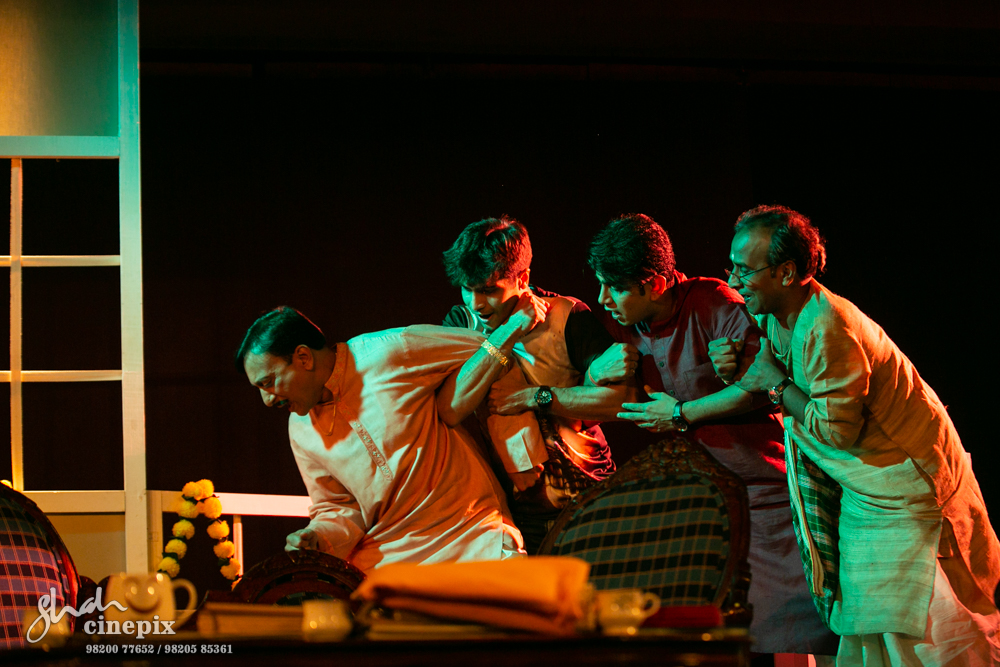
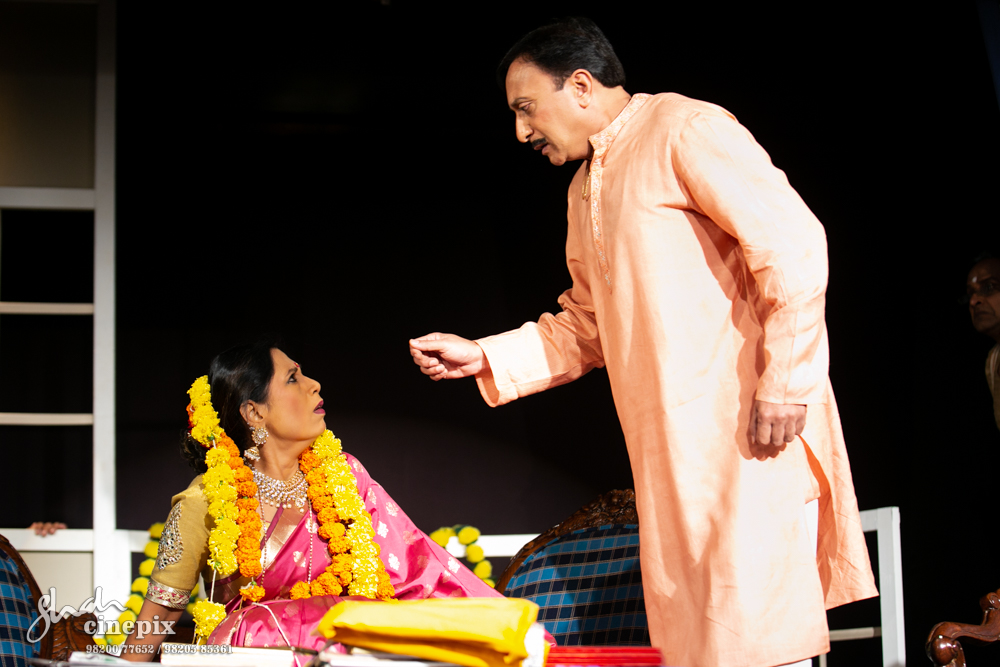
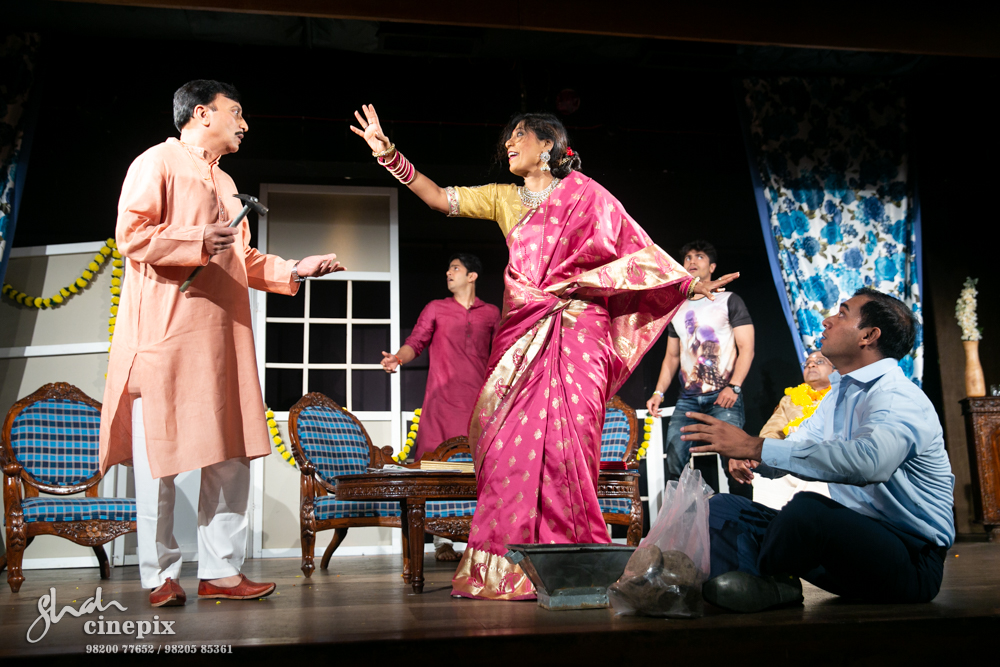
CAST
- Preeta Mathur Thakur
- Aman Gupta
- Shankar Iyer
- Arunima Joshi
- Burhannudin Topiwala
- Jawed Rehman
- Mani Pillai
- Rajat Yadav
- Shubhanshit Priyadarshi
CREDITS
- Soundscape..............Aman Gupta
- Set Design.........Dhanendra Kawade
- Costumes.............Richa Sharad
- Management & Production......Preeta Mathur Thakur
- Choreography..........Tanushree Gupta
- Lights..........Shivaji Shinde
- Sound Operation.......Himesh Lokwani
Script & Direction: Veena Bakshi
1 Hr 30 mts. Without Interval
Akal Ki Pudiya
The annual Jhande ka Mela has come to Badripur and Bhanu wants nothing more than to spend all his time among the various sights and sounds of the Mela with his friends Bansi, Gopal & Sudarshan. There is the Balloon seller and the Toy seller and the Sweet seller who have come with fascinating products from far off lands but unlike his friends, Bhanu is fascinated by the wisdom seller Chatura and ends up buying her advise for one gold coin. But the advise that Bhanu should never stand around when two people are fighting does not please his father Shamsher Singh and he confronts Chatura to get his gold coin back. Chatura gives it back only on a promise that Bhanu will never follow her advise. Faithful to his father’s promise, Bhanu stands around when the two dress designers from the palace, Urvashi and Srishti fight over a beautiful stole, both wanting the same for their respective Queens, Queen Roopa and Queen Tara. And true to Chatura’s advise, this lands Bhanu in deep trouble when both the Queens threaten him with dire consequences if he does not take their side when the matter of the fight comes up for hearing in the court before King Chandrasen! What will save Bhanu now? Rahim Chacha advises his father Shamsher and mother Indu to seek Chatura’s help since she is always ready to help everyone in Badripur with good advise. But after her recent confrontation with his father, will she now agree to help Bhanu? And if she does, will her advise really save him?
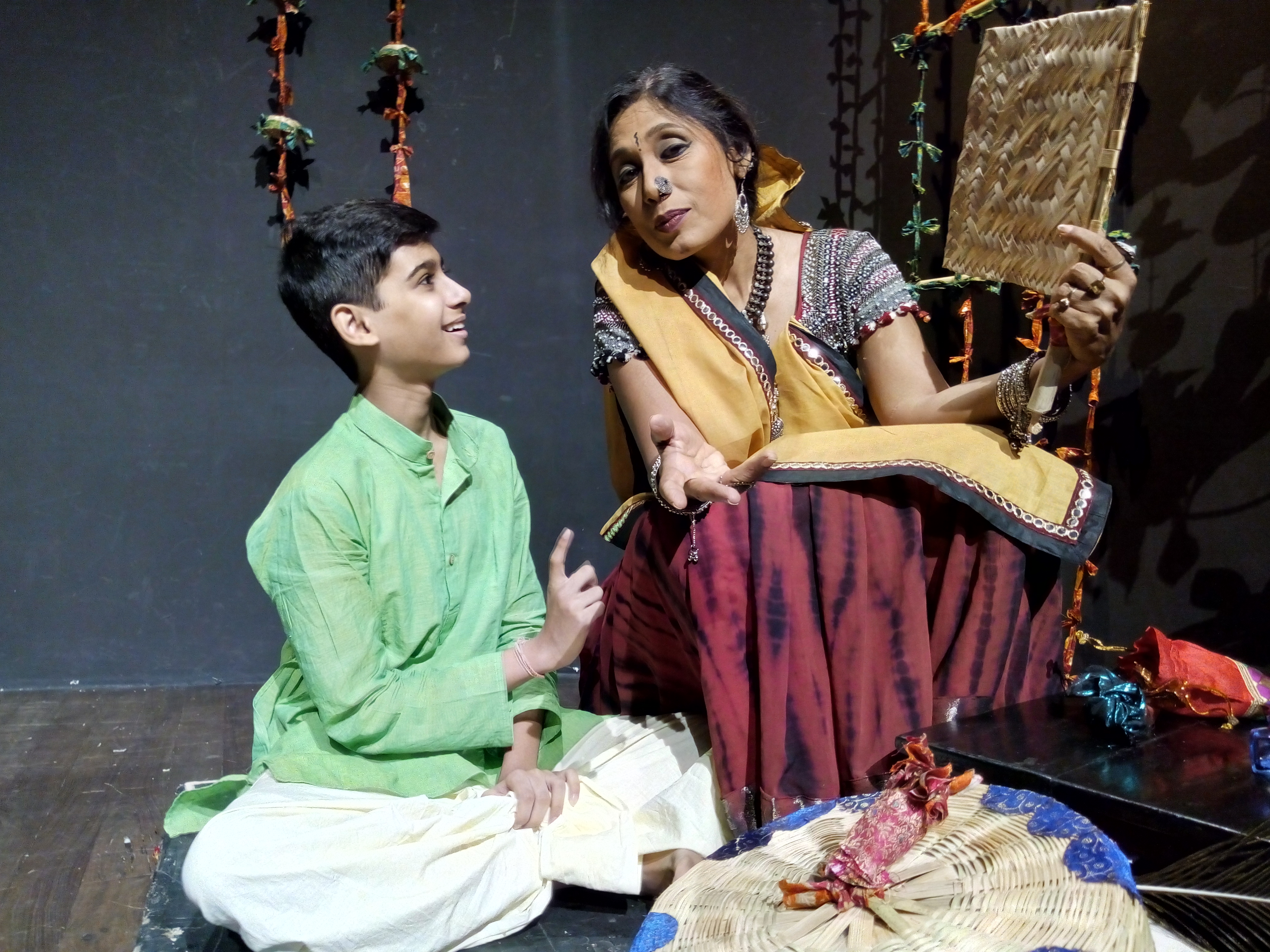
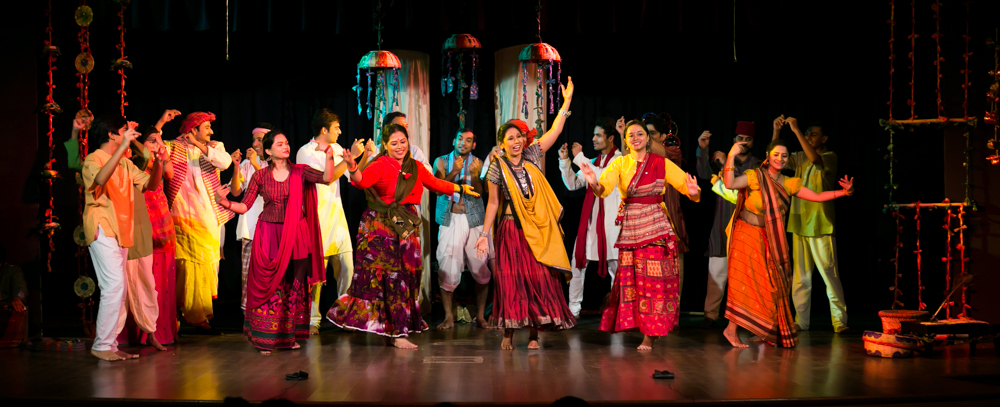
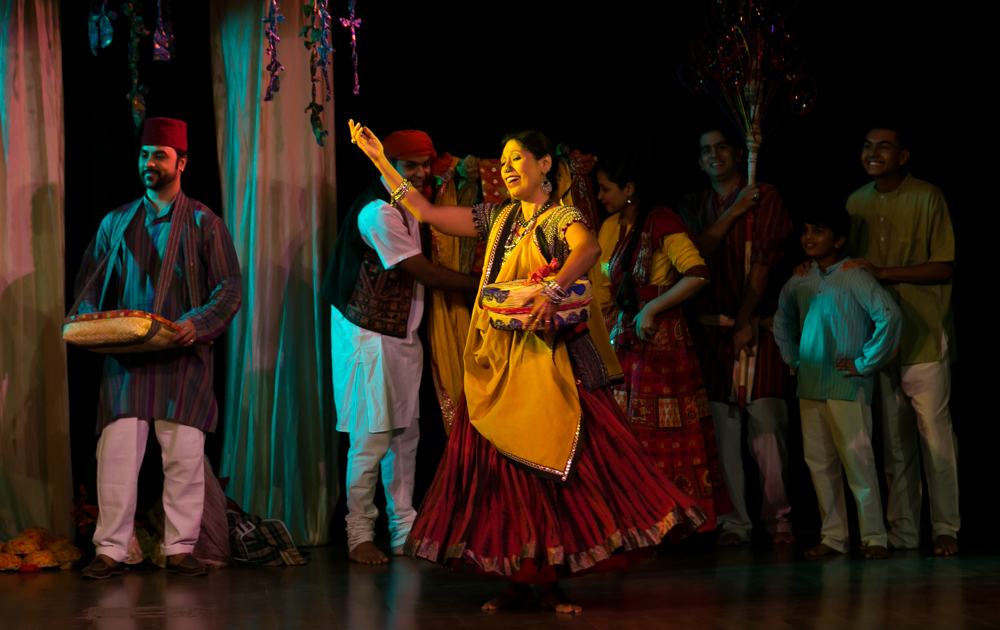
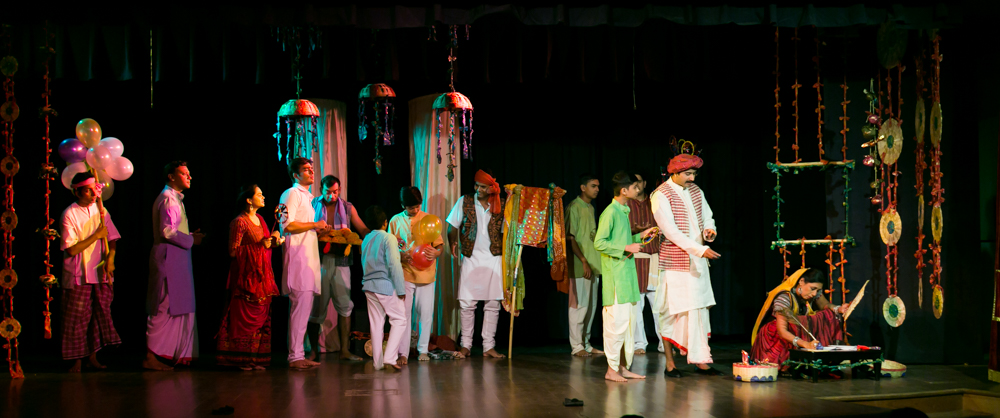
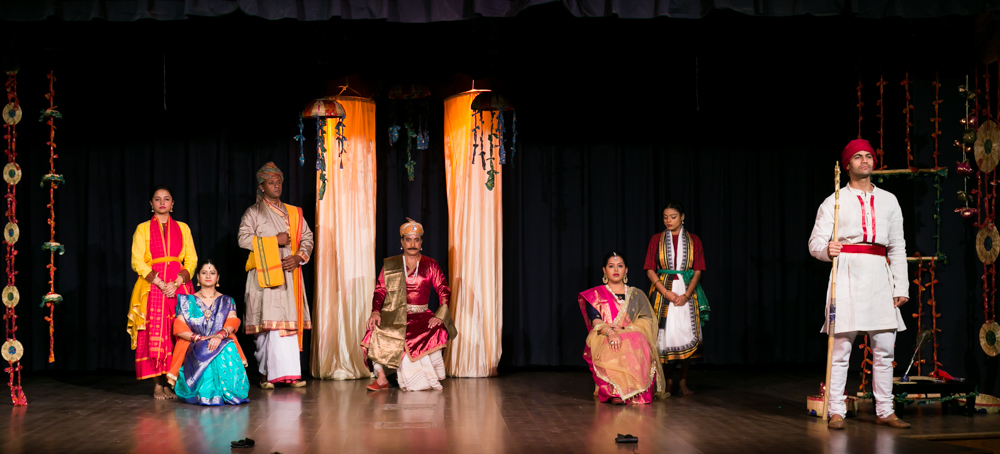
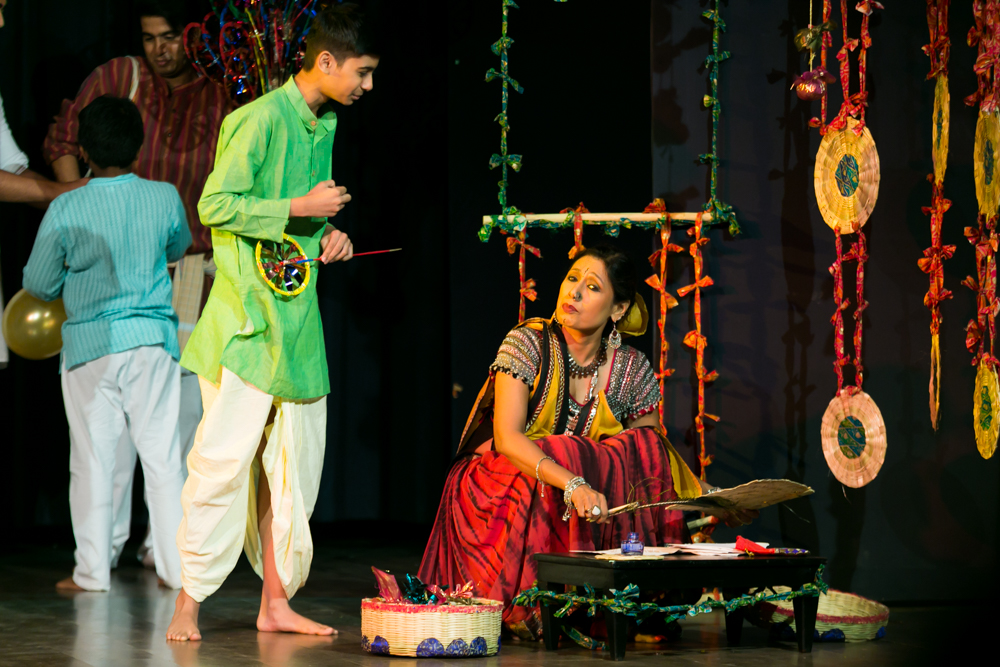
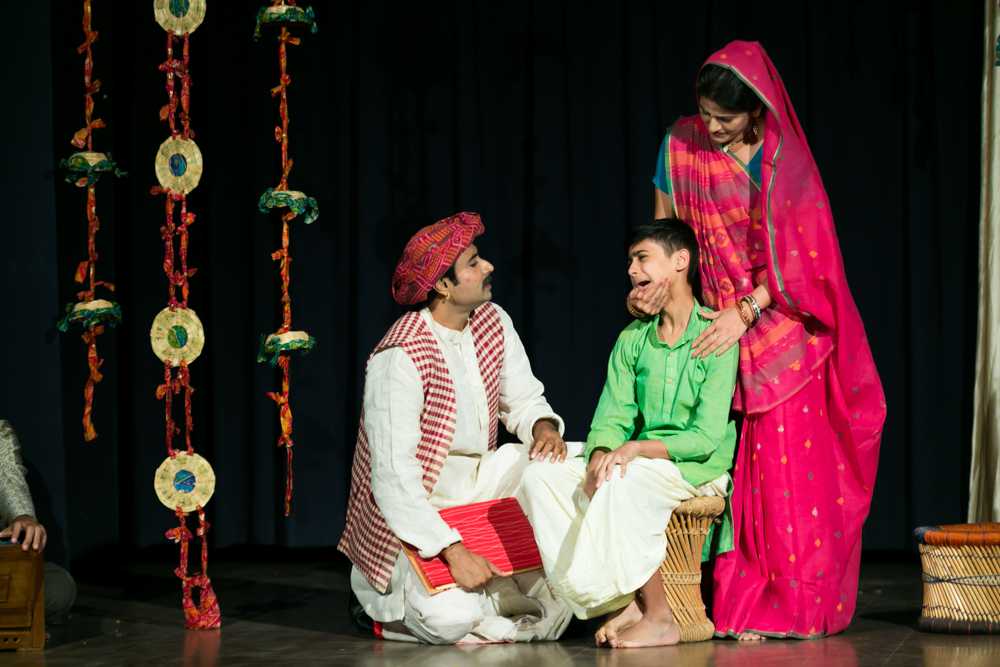
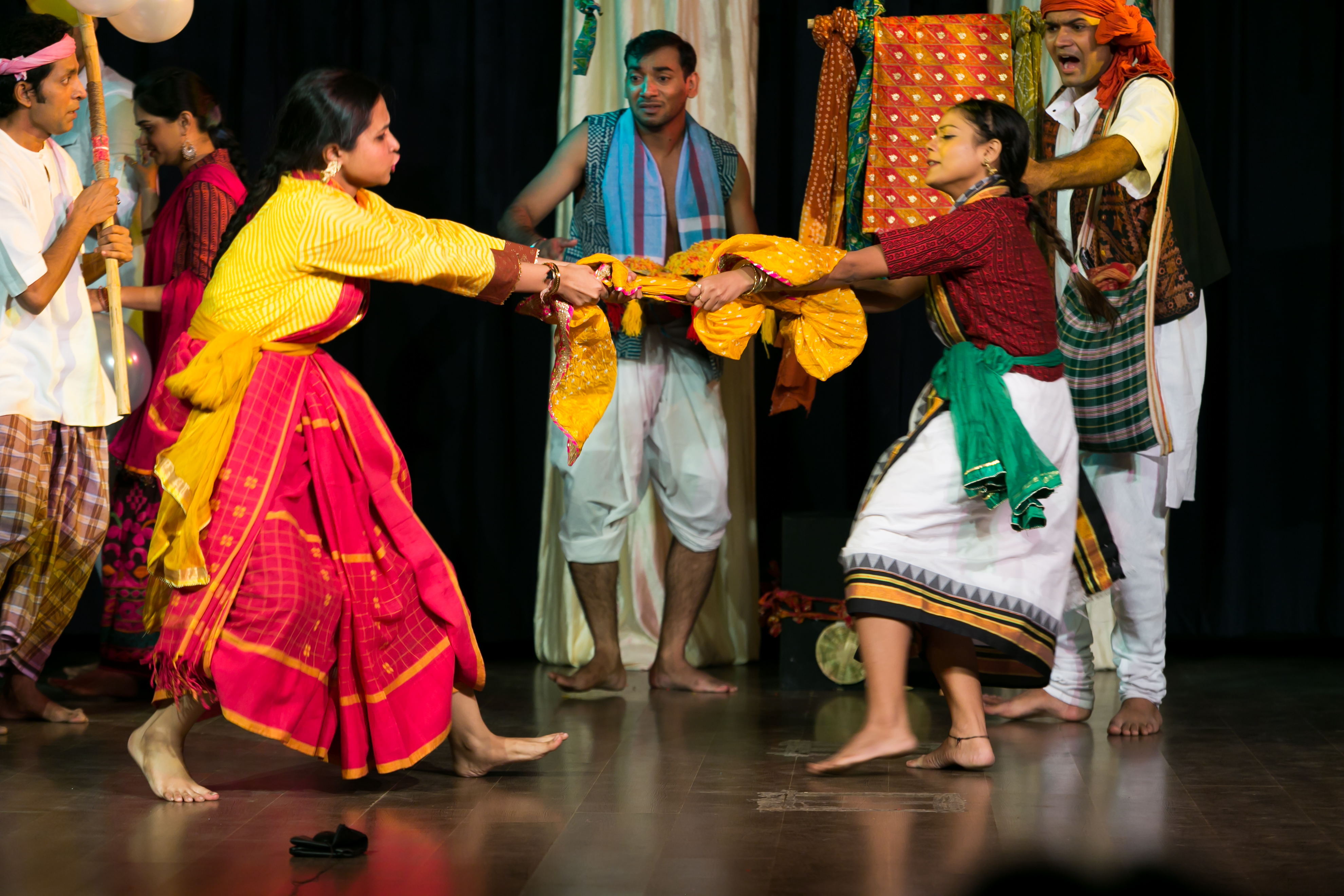
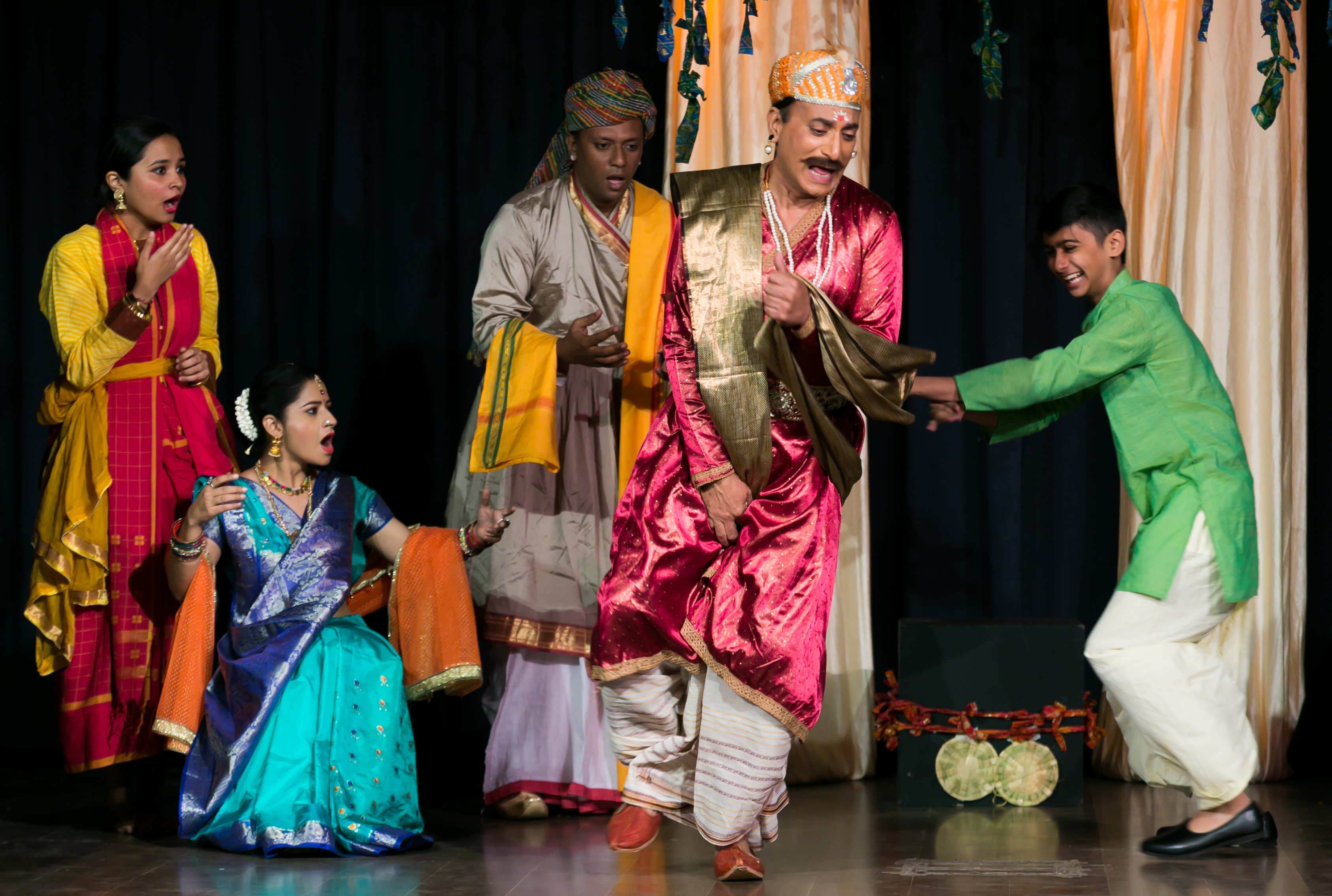
CAST
- Preeta Mathur Thakur
- Aman Gupta
- Sumit Bhardwaj
- Arunima Joshi
- Rohit Choudhary
- Shilpa Chakraborty
- Shilpi Maheshwari
- Rajat Yadav
- Shubhanshit Priyadarshi
- Twisha Baunthiyal
- Archana Prajapati
- Burhan
- Mani
- Javed
CREDITS
- Shivaji Shinde
- Himesh Lokwani
- Lyrics..............Nivedita
- Music Makers.........Priya, Punita, Kumkum, Satish, Aman
- Costumes.............Ishi Shrivastav
- Set Designs...........Dhanendra Kawade
- Sound Design..........Aman Gupta
- Management & Production......Preeta Mathur Thakur

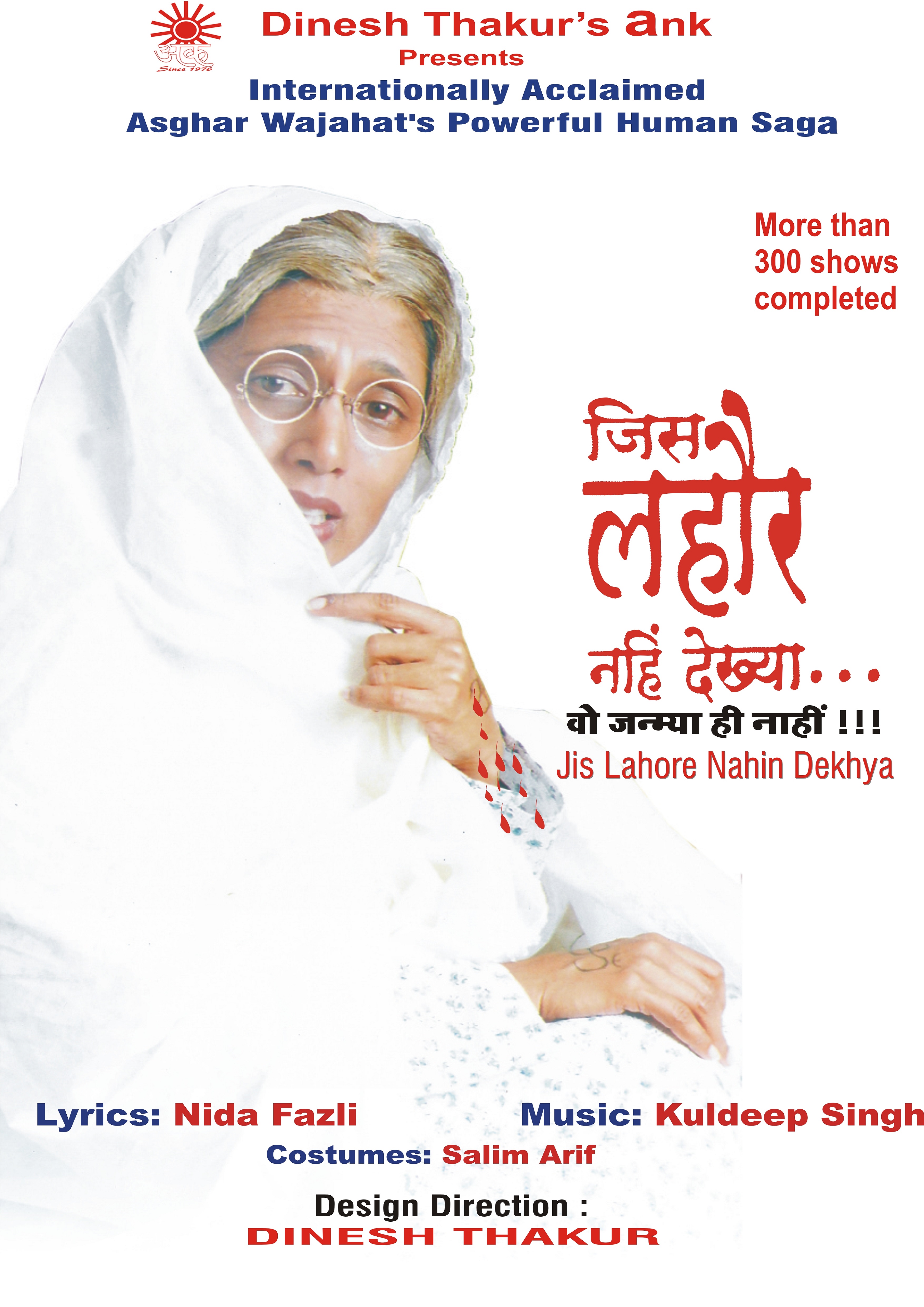
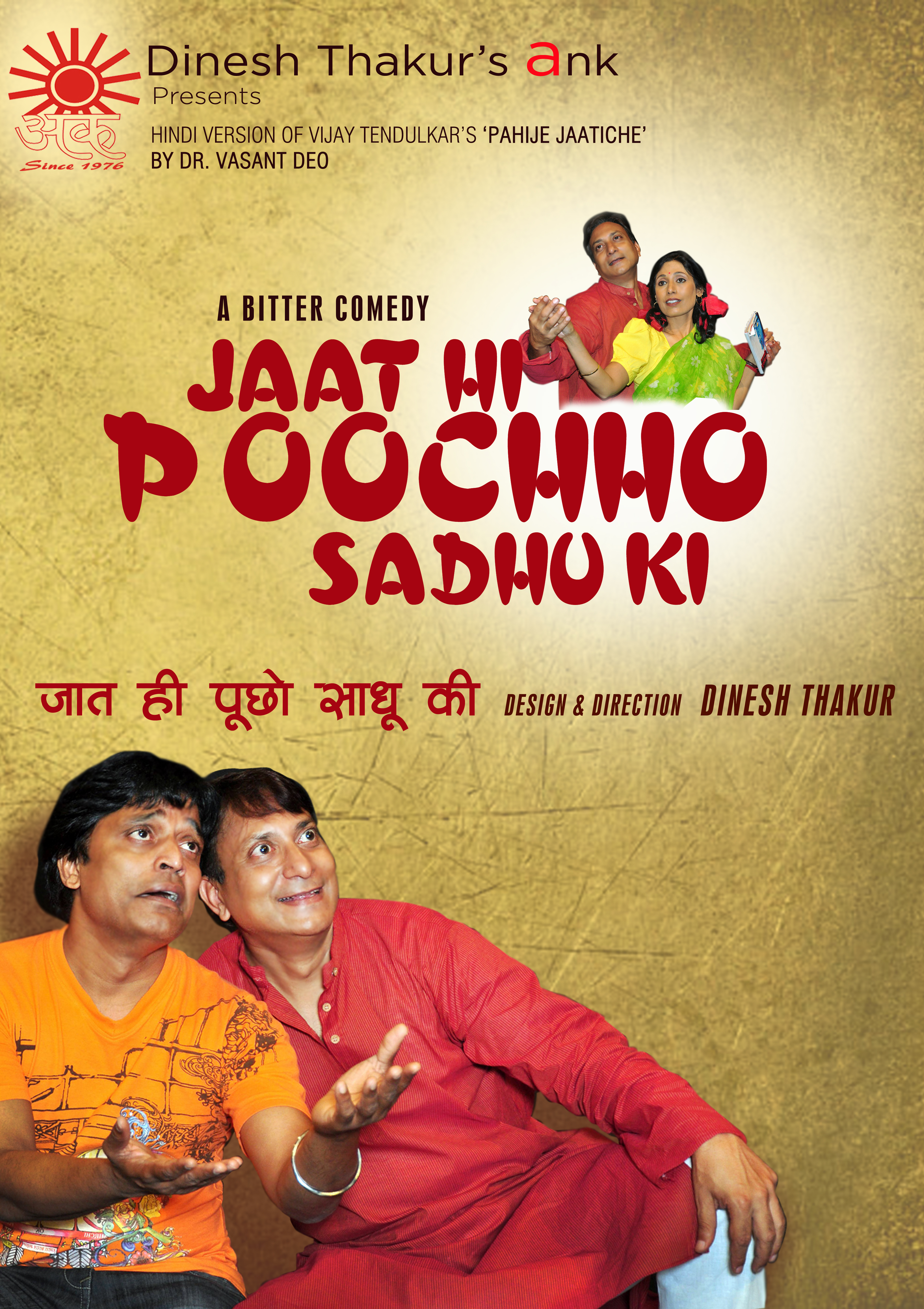
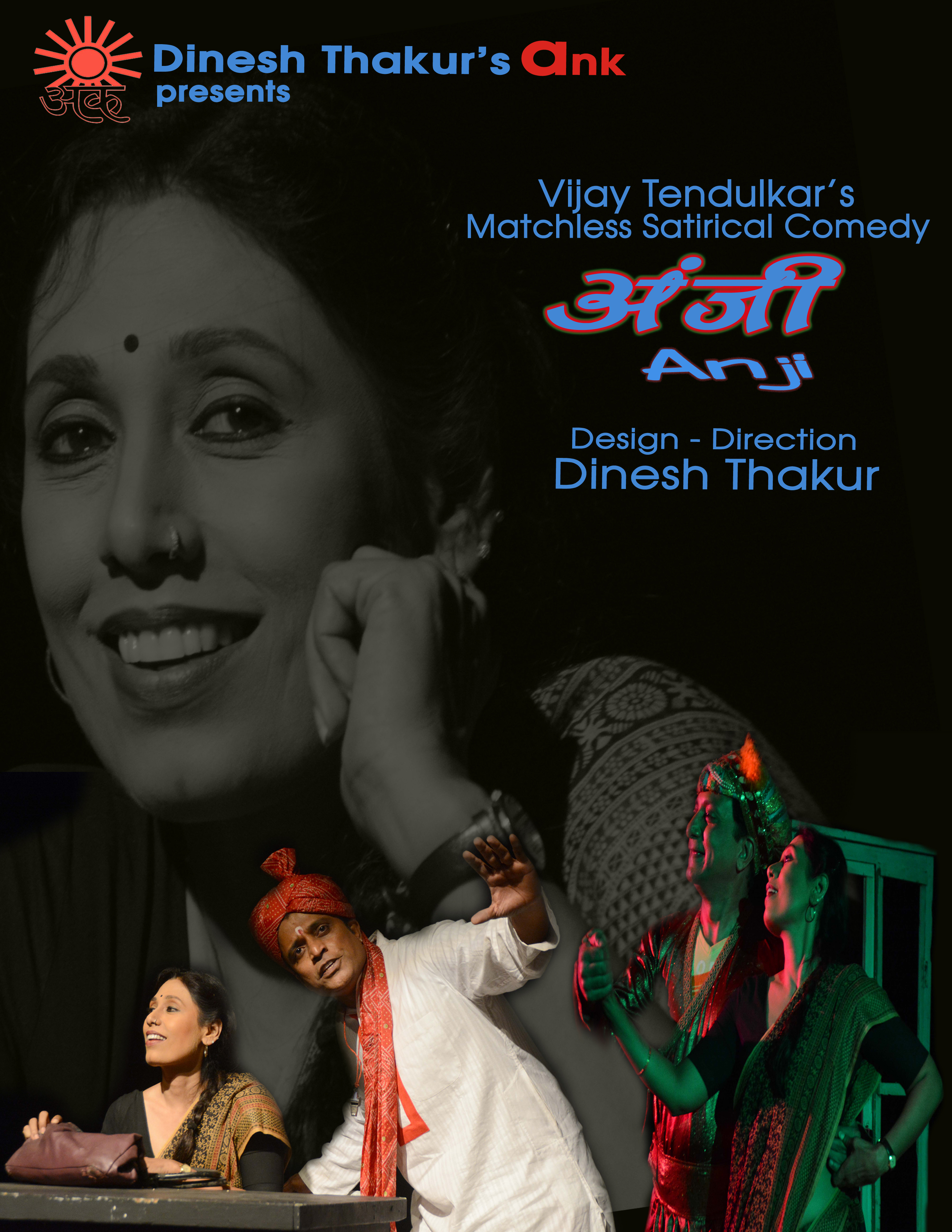
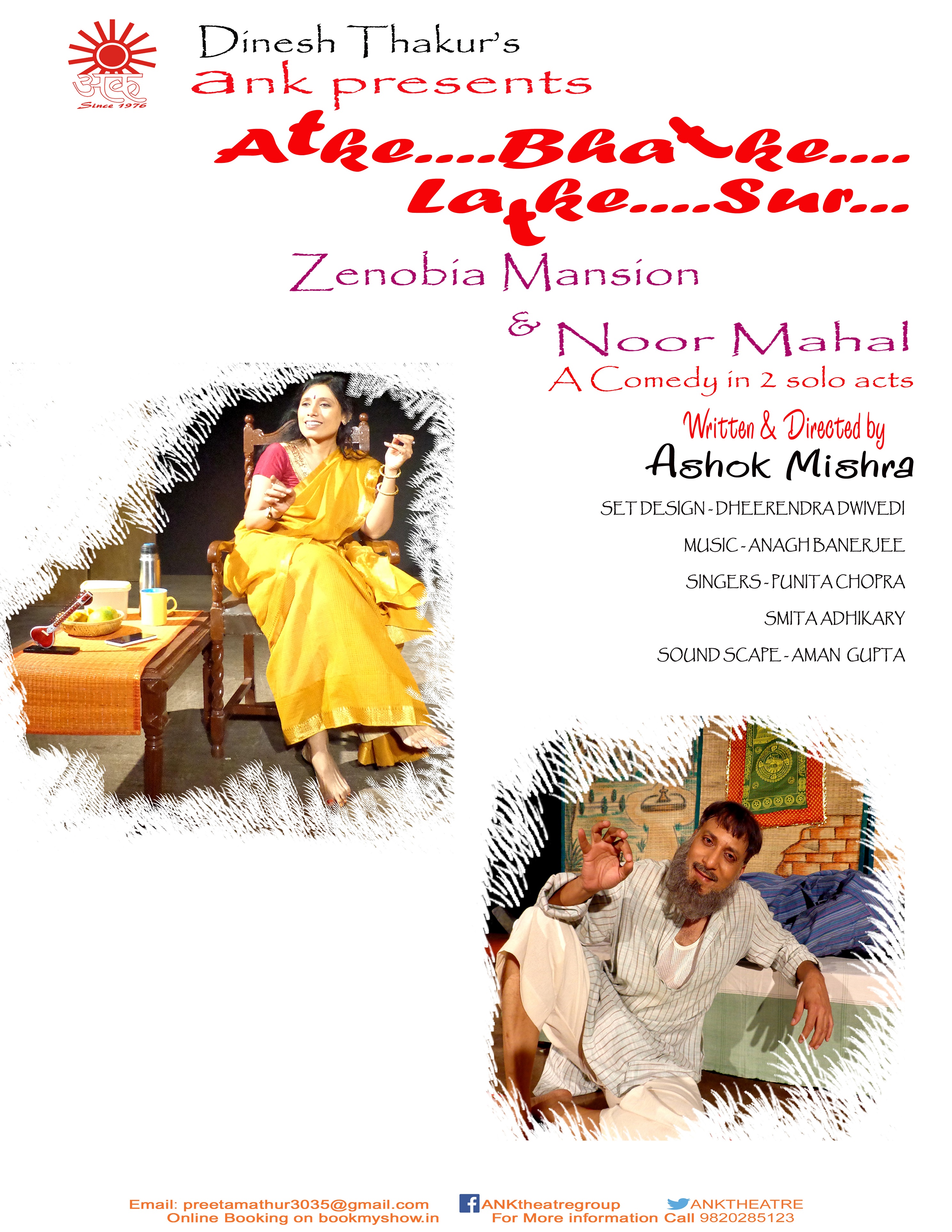
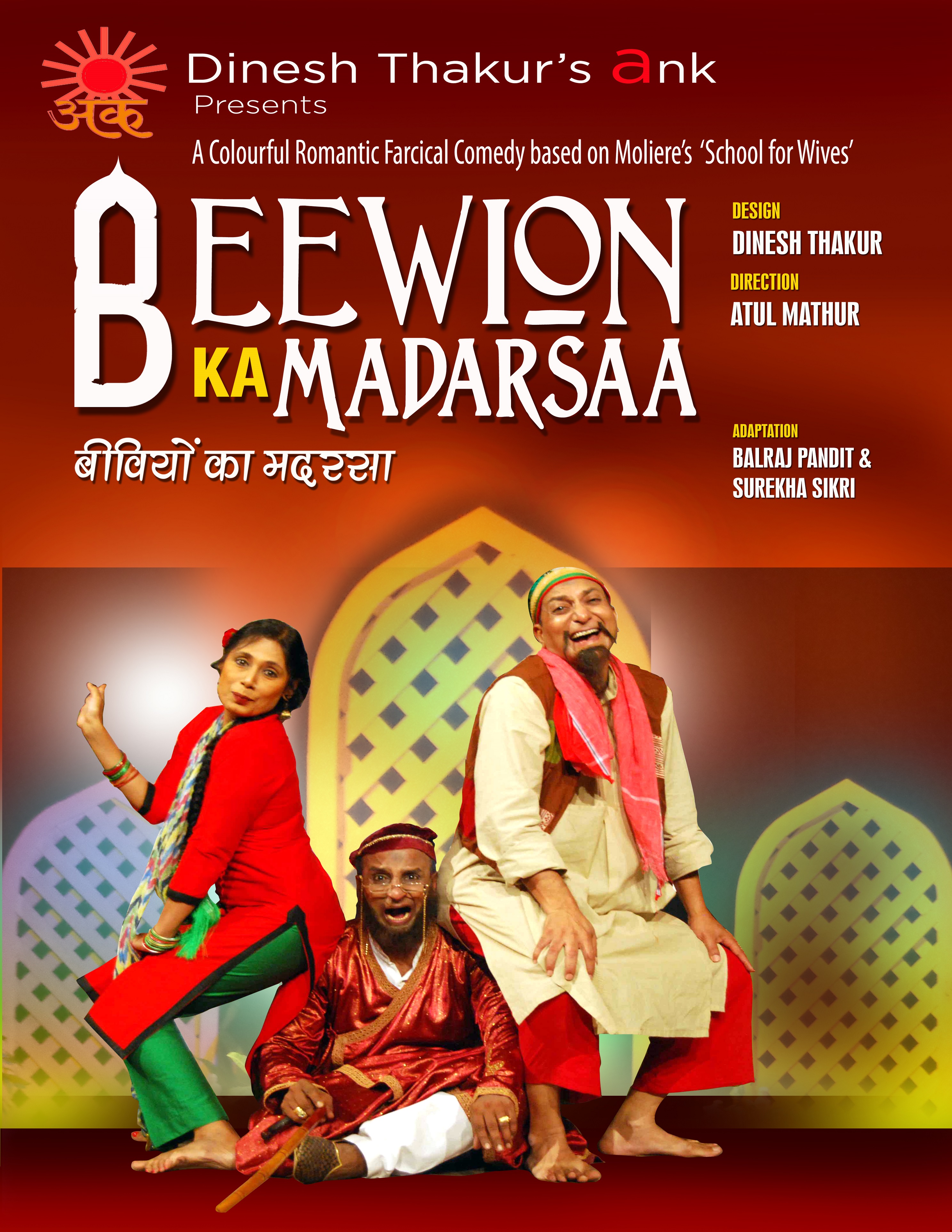
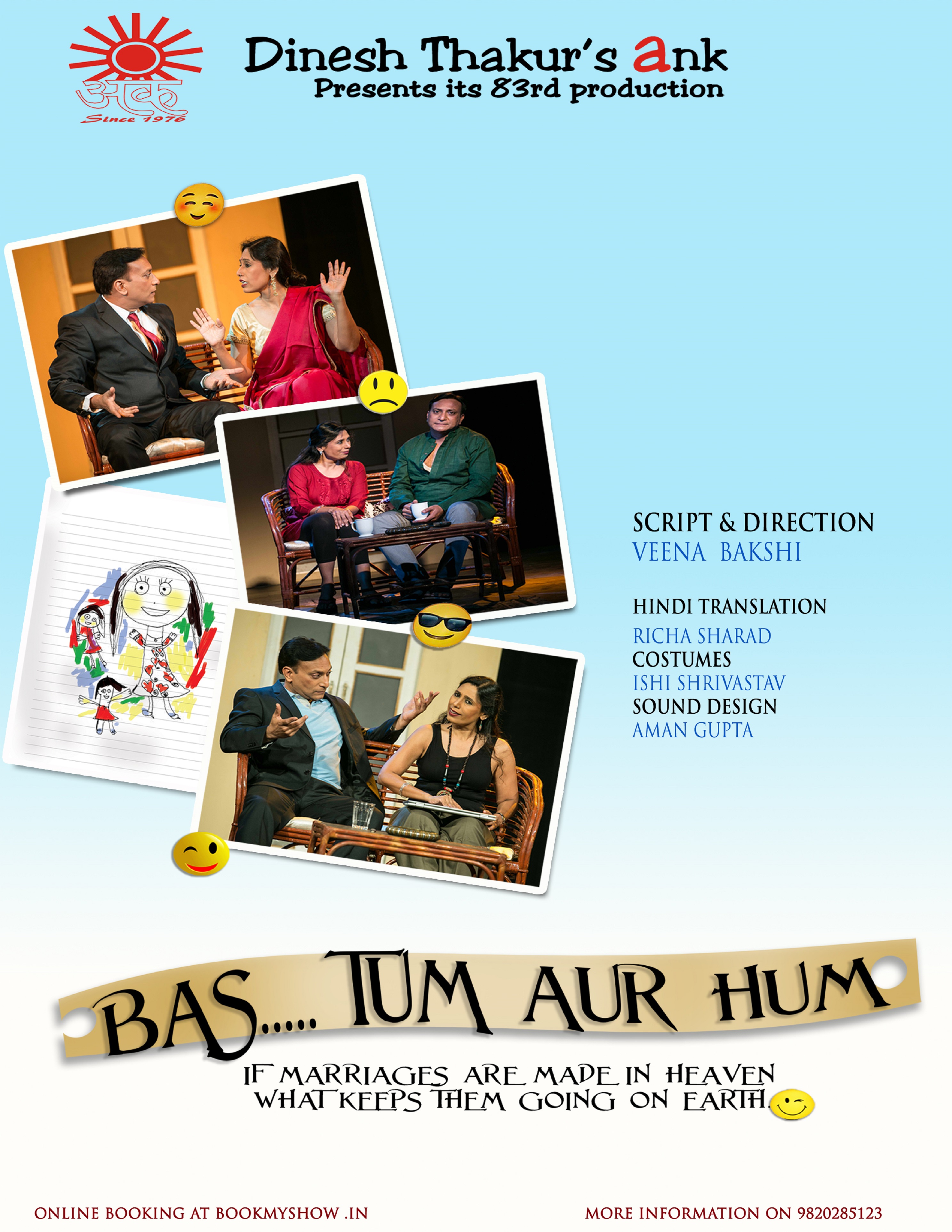
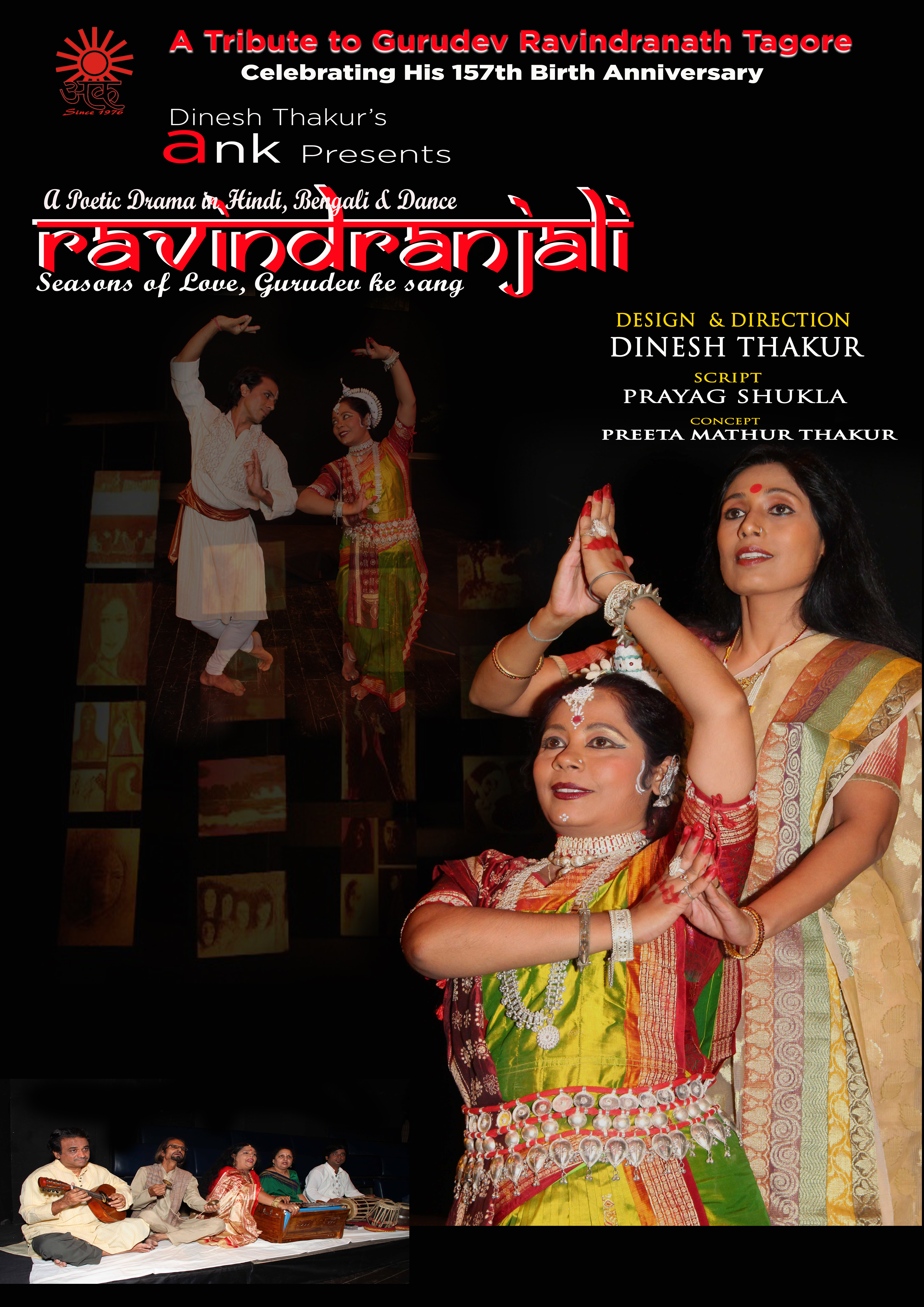

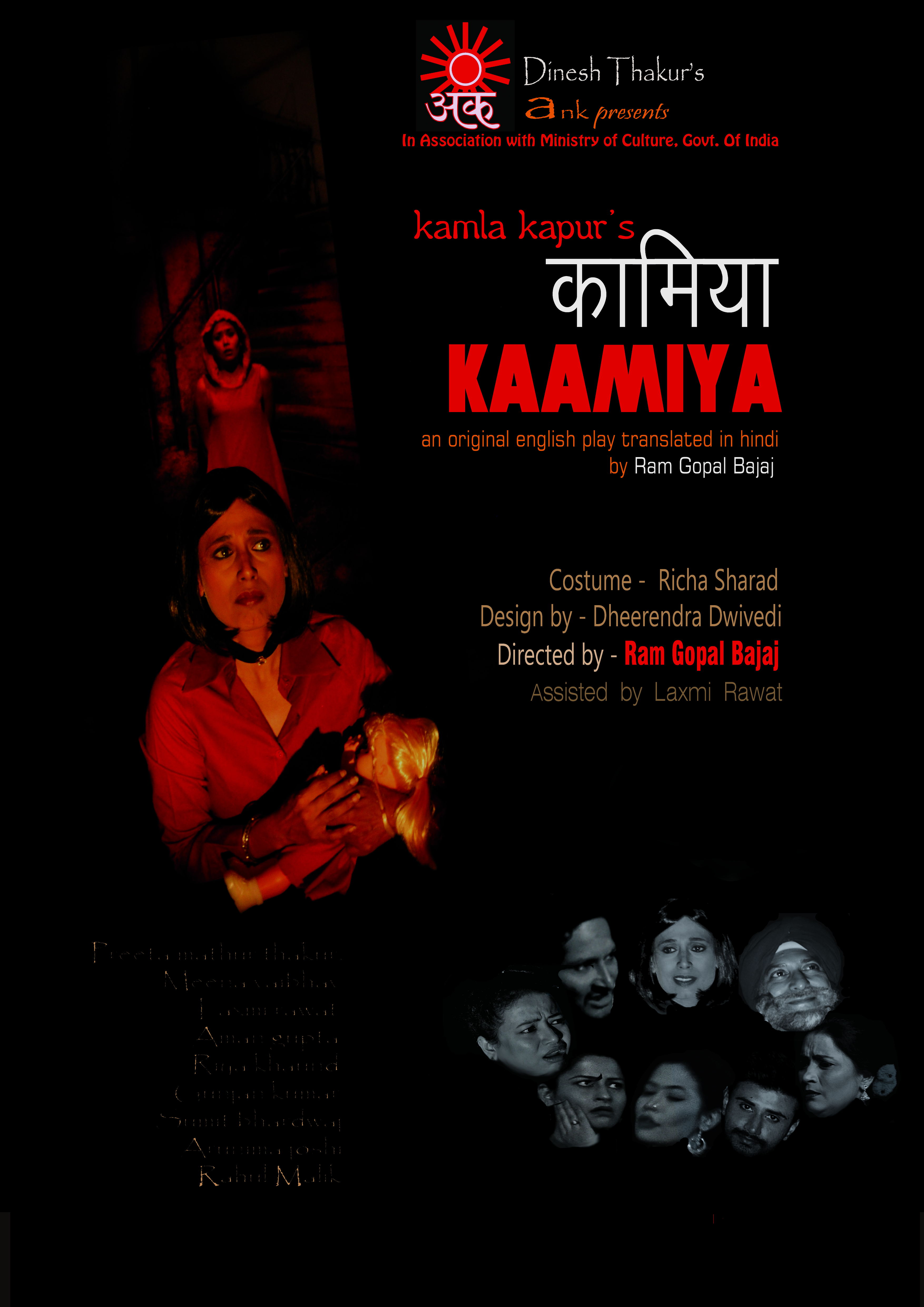
.jpg)
